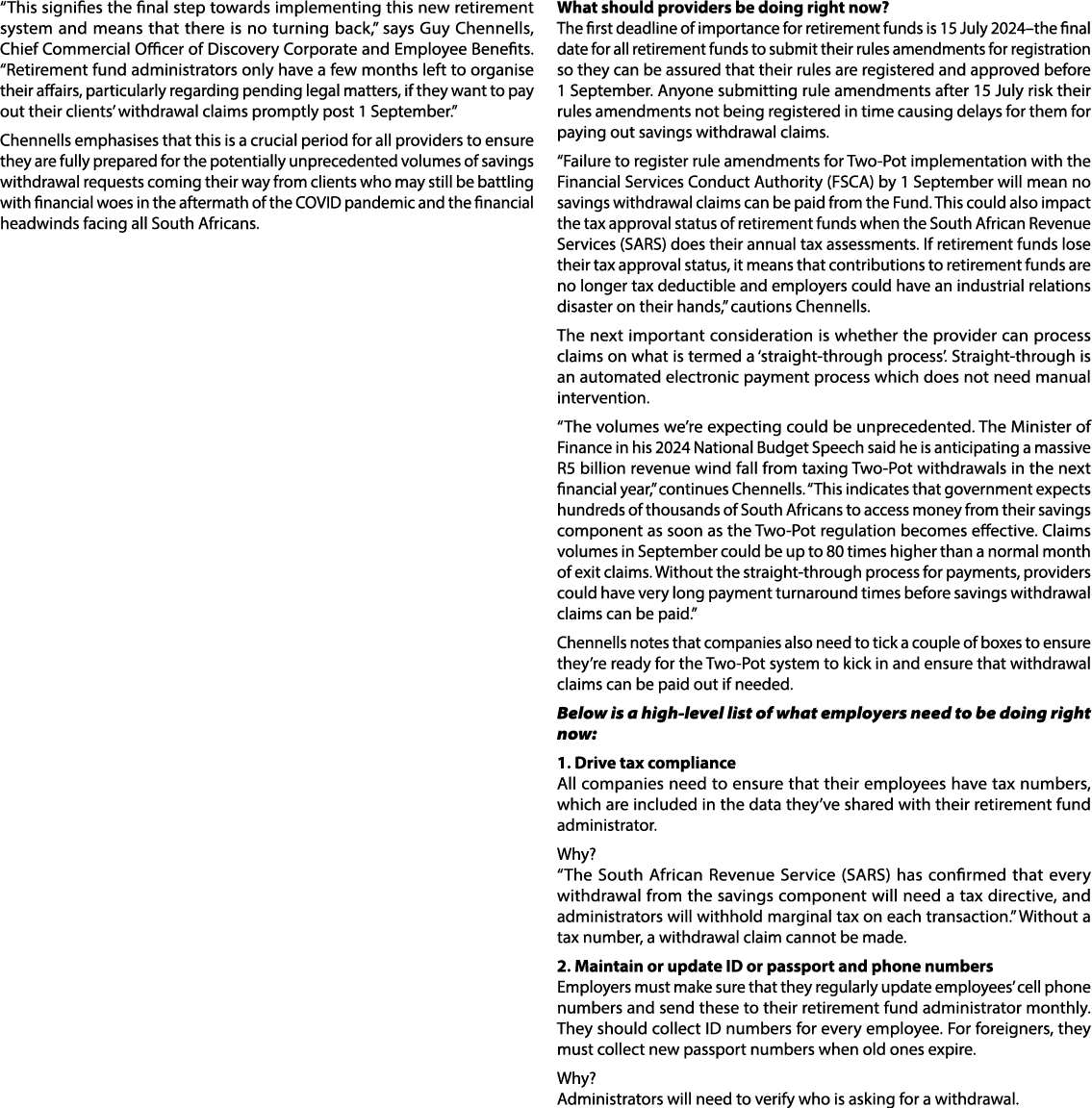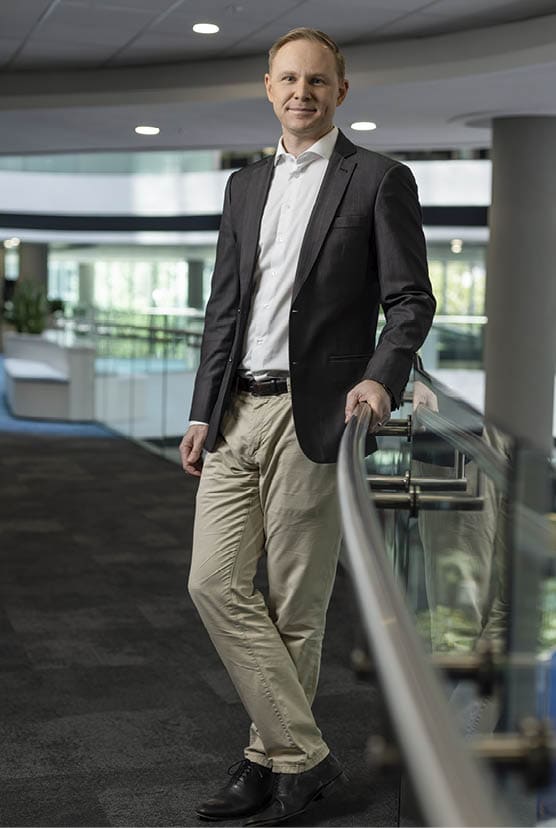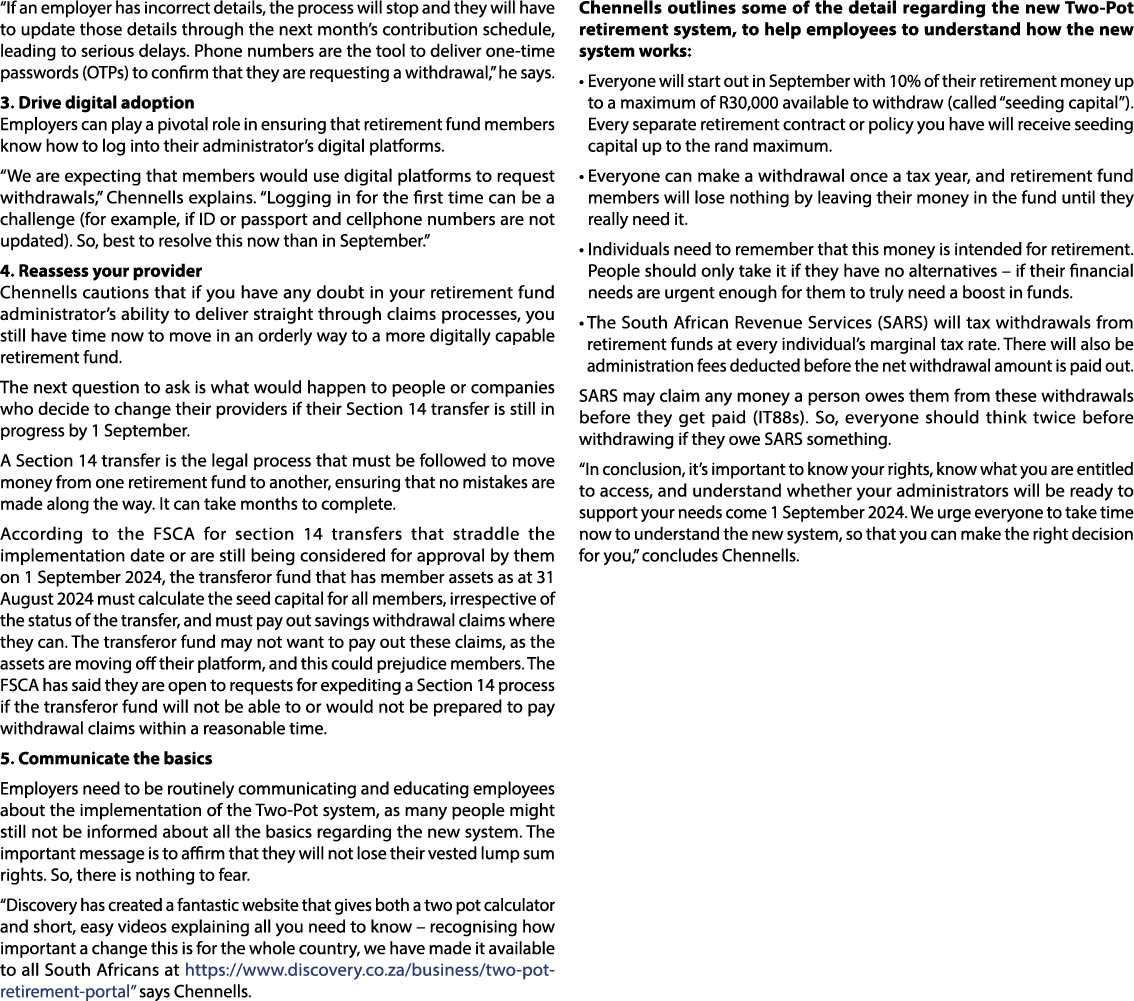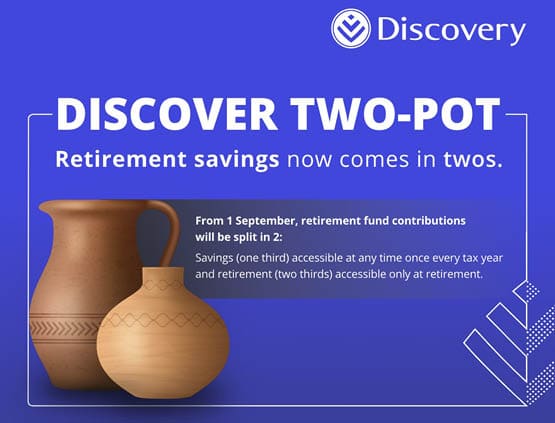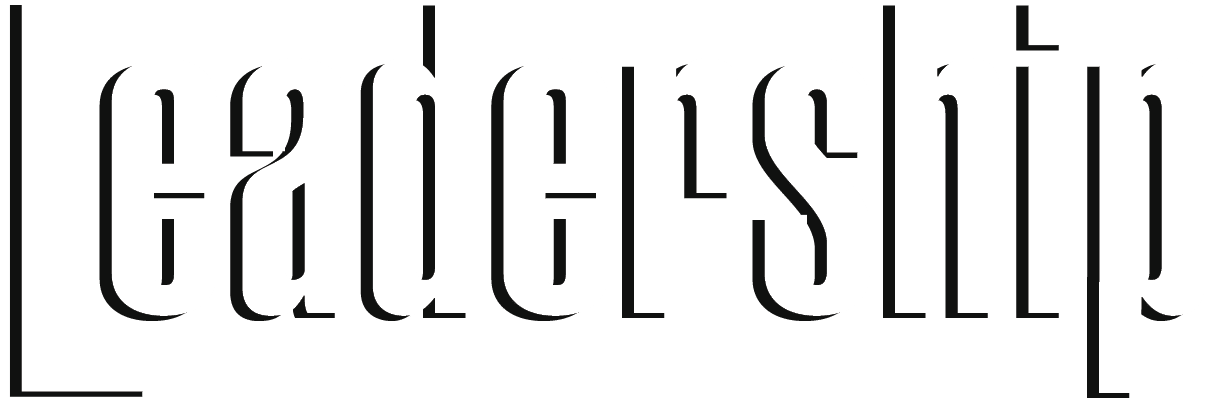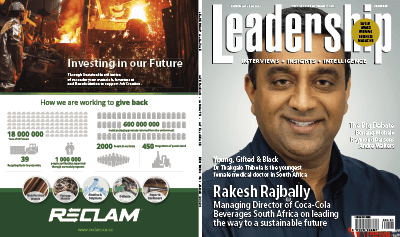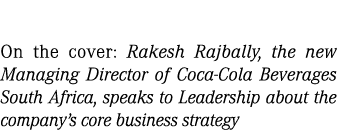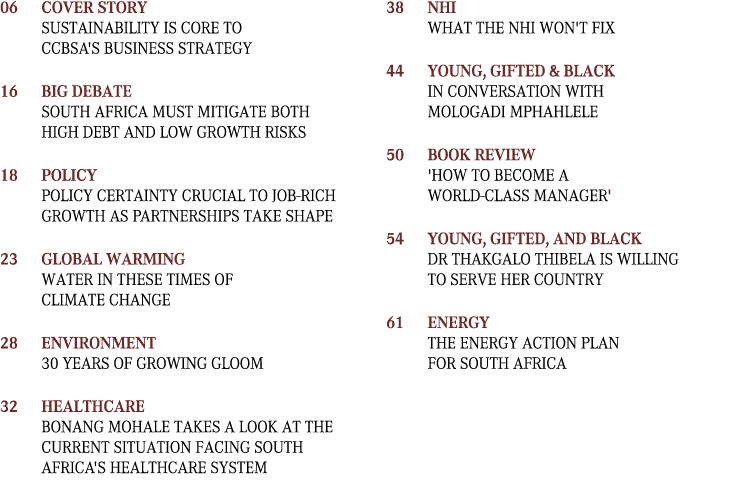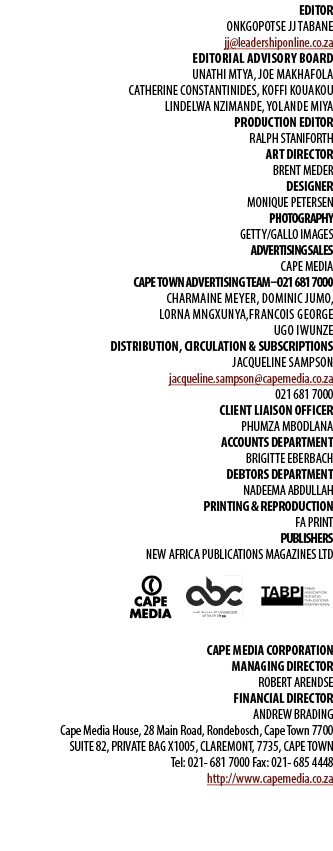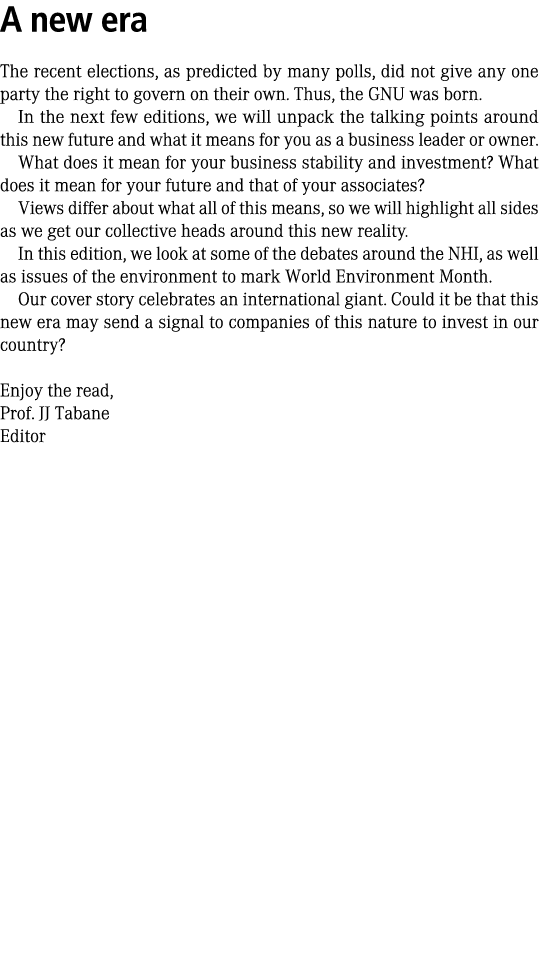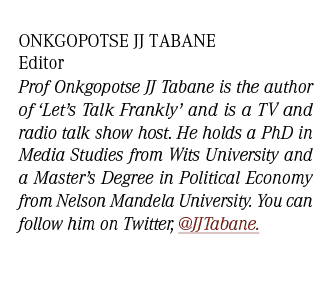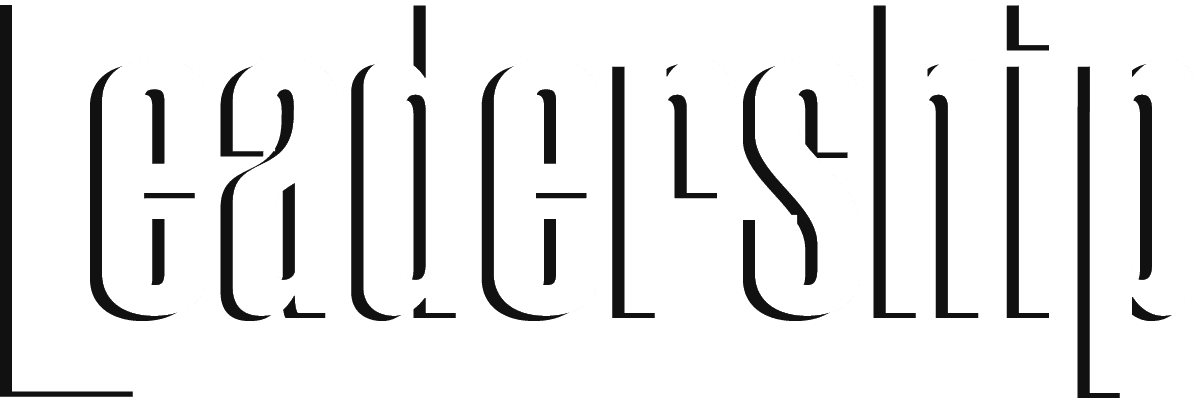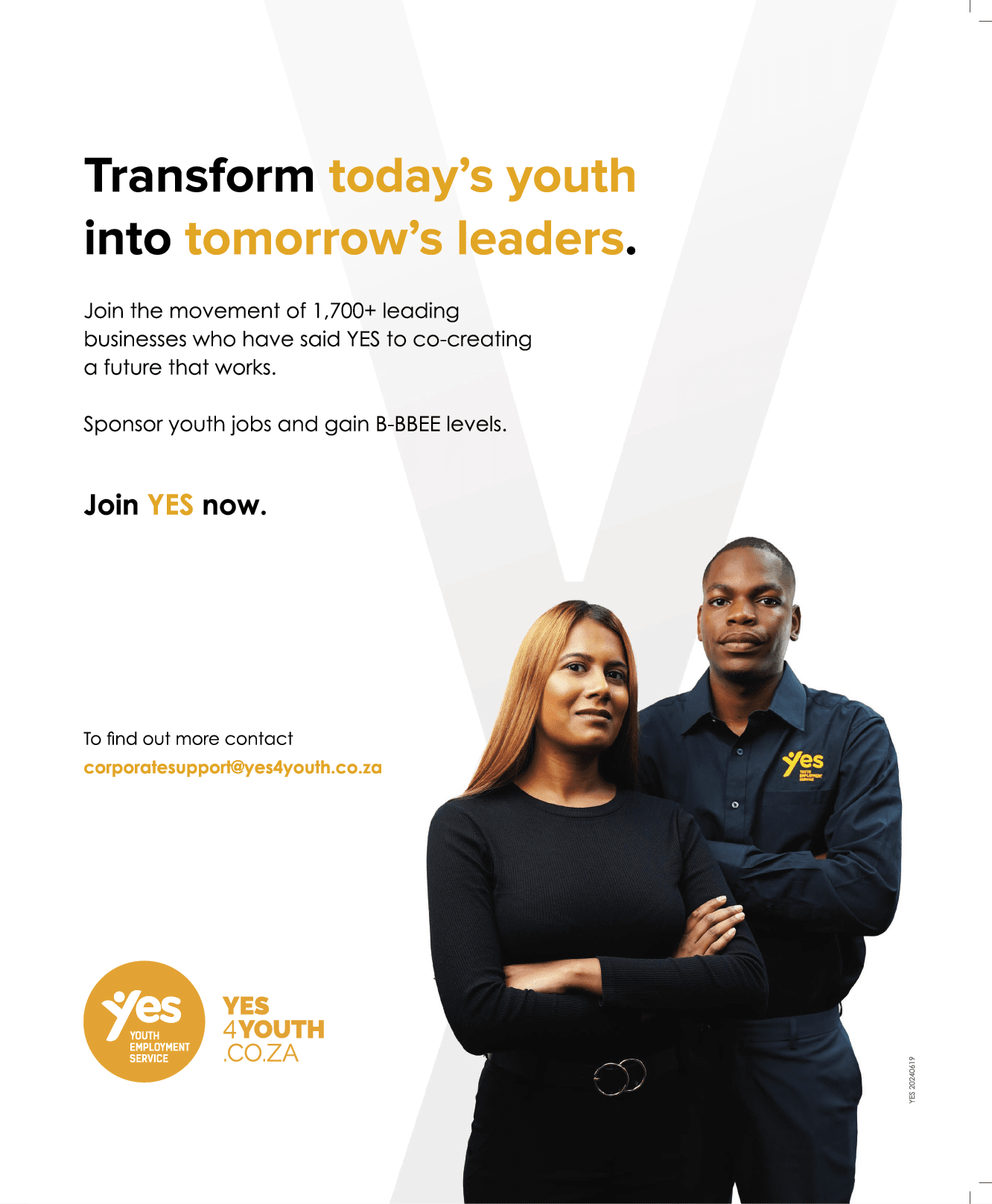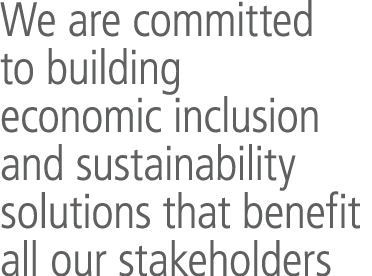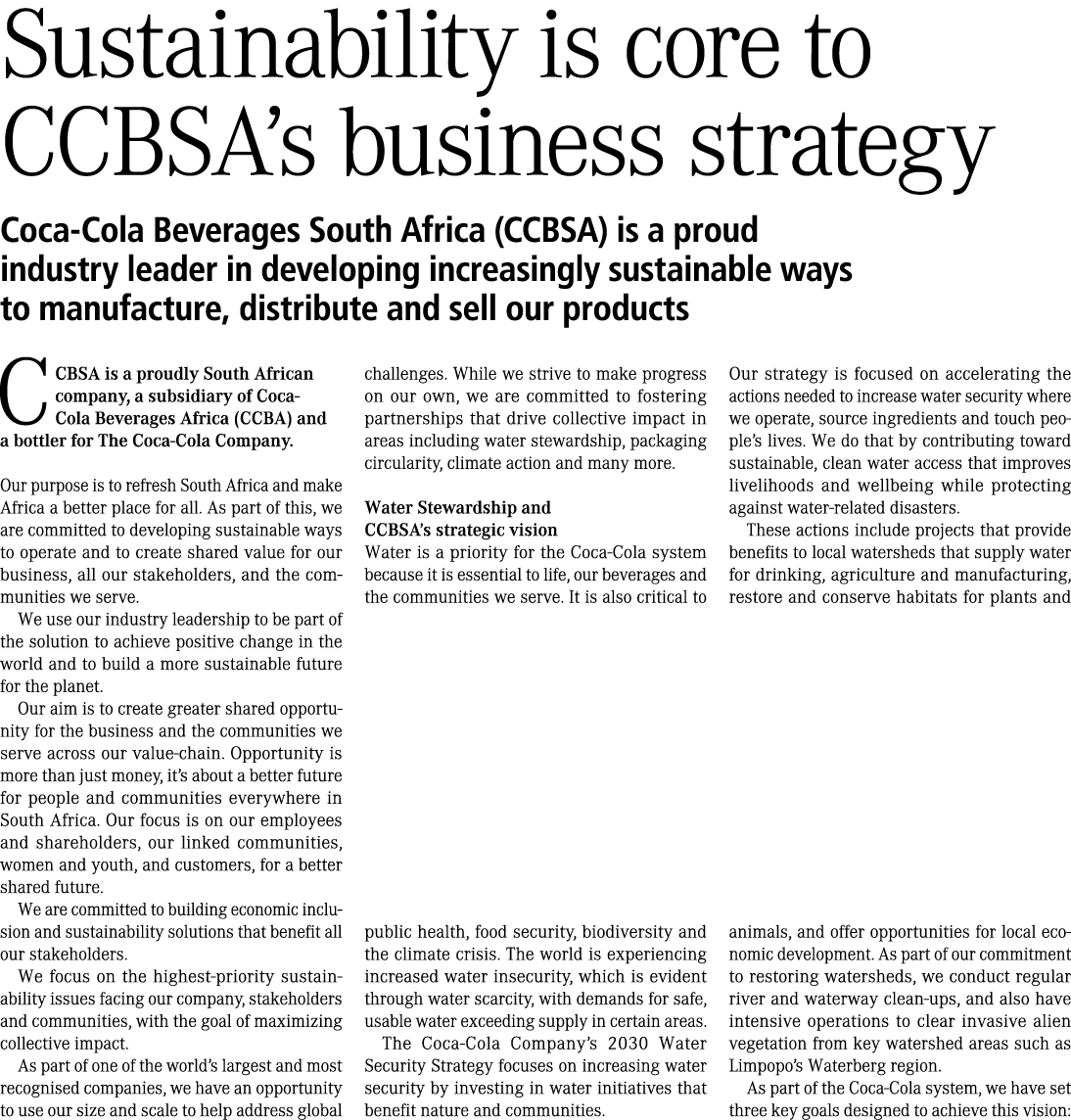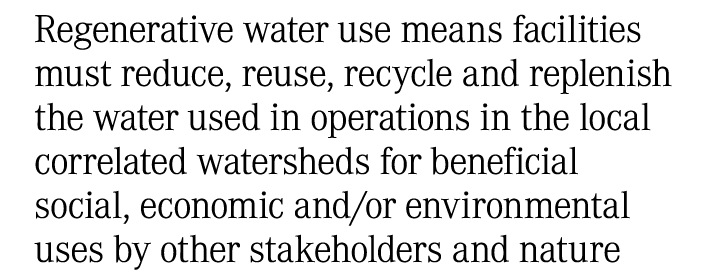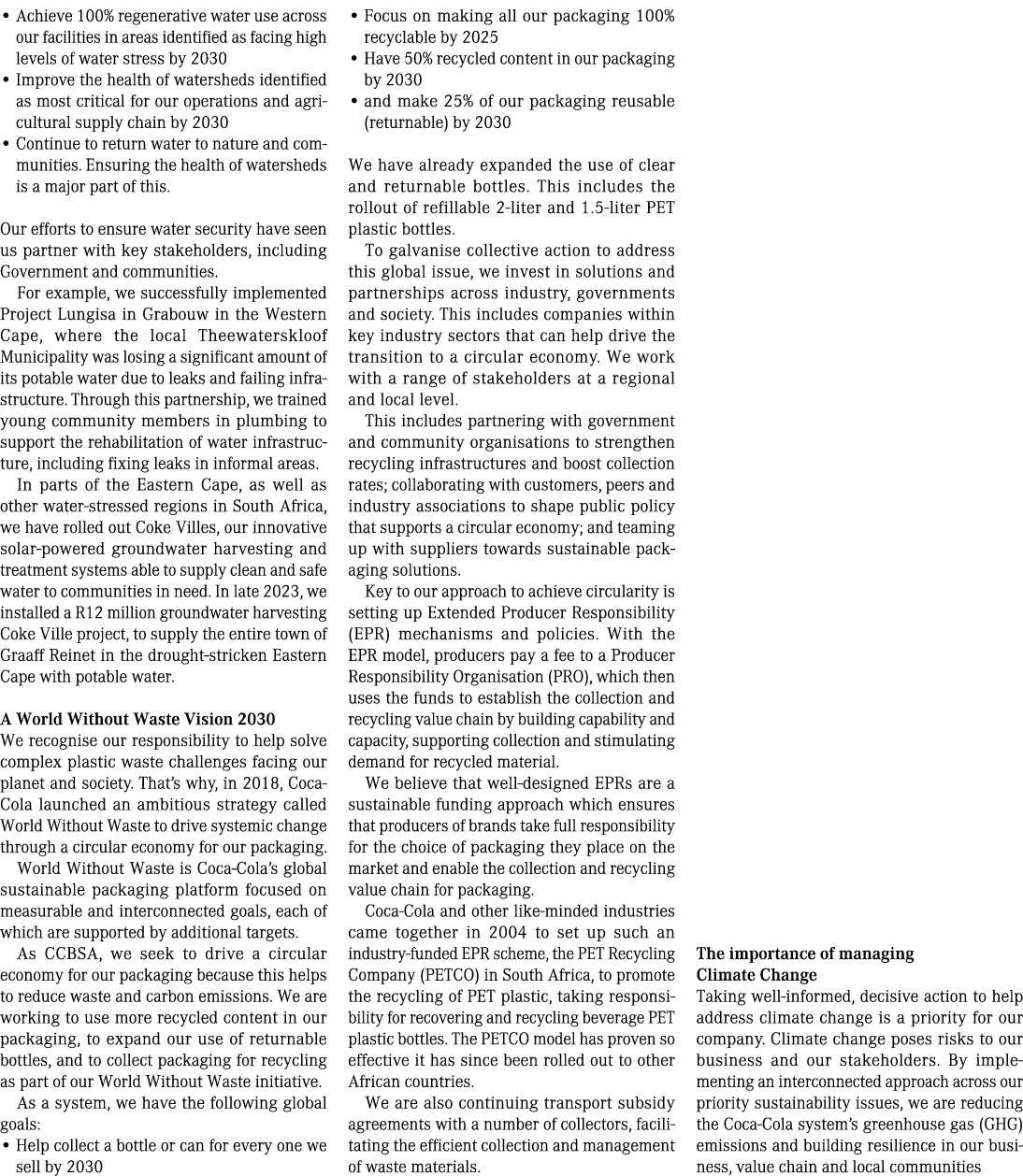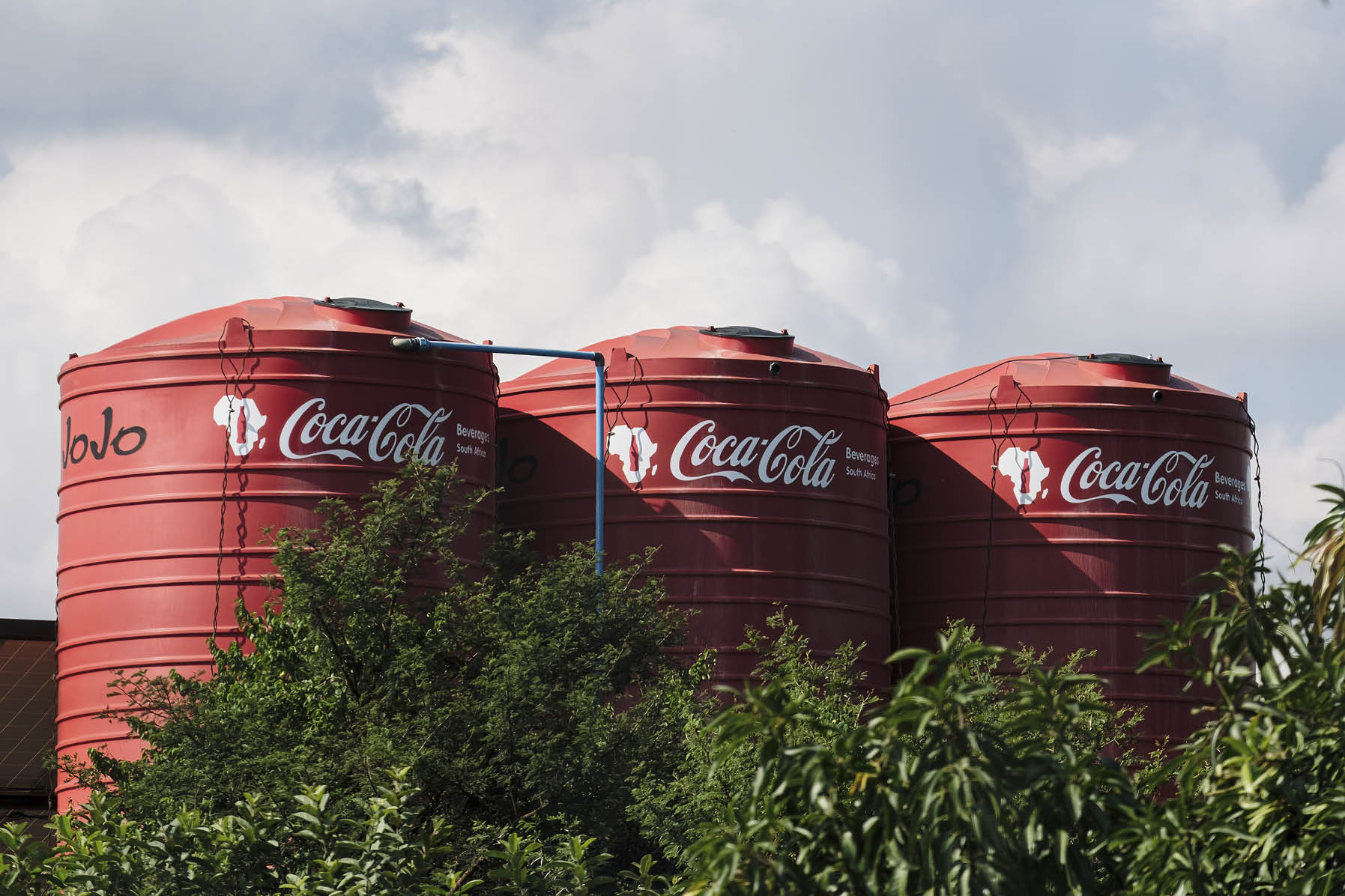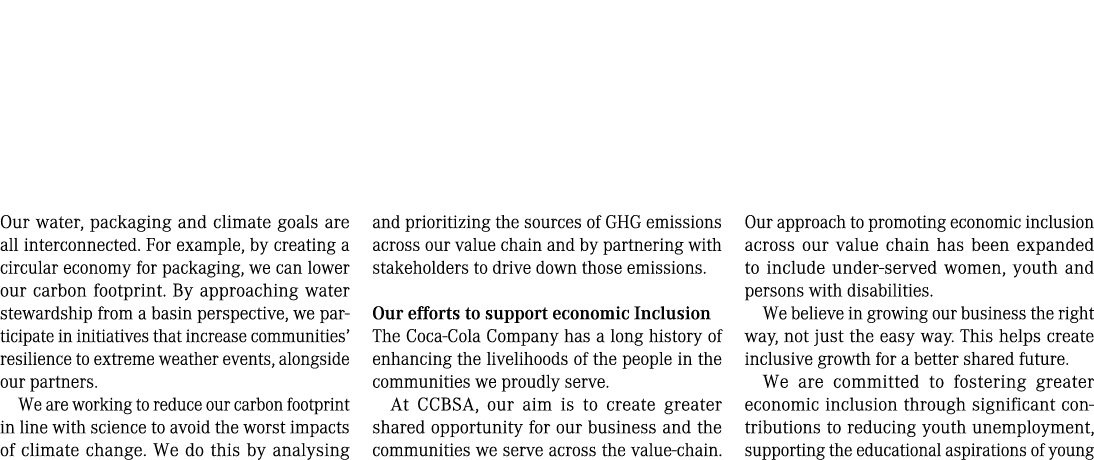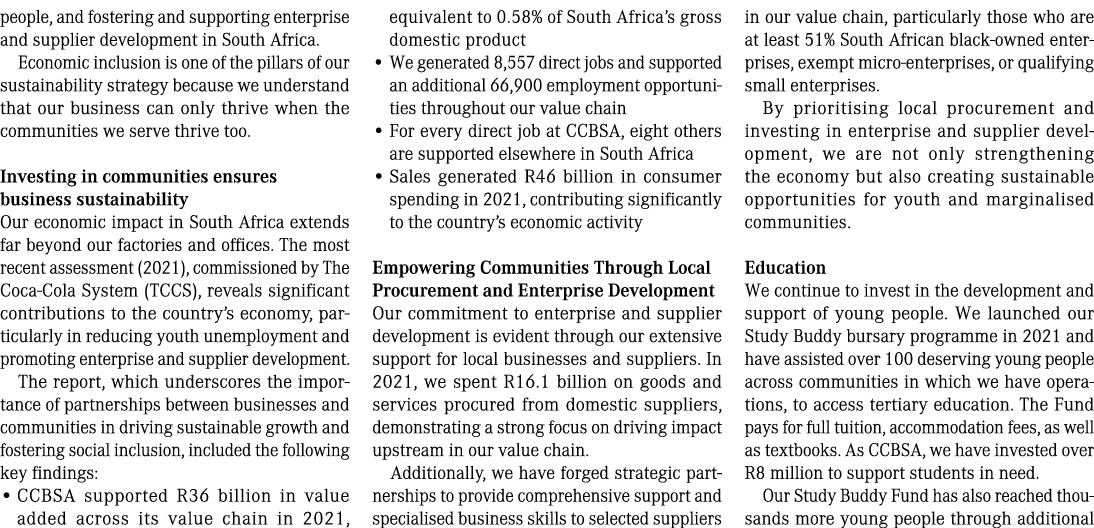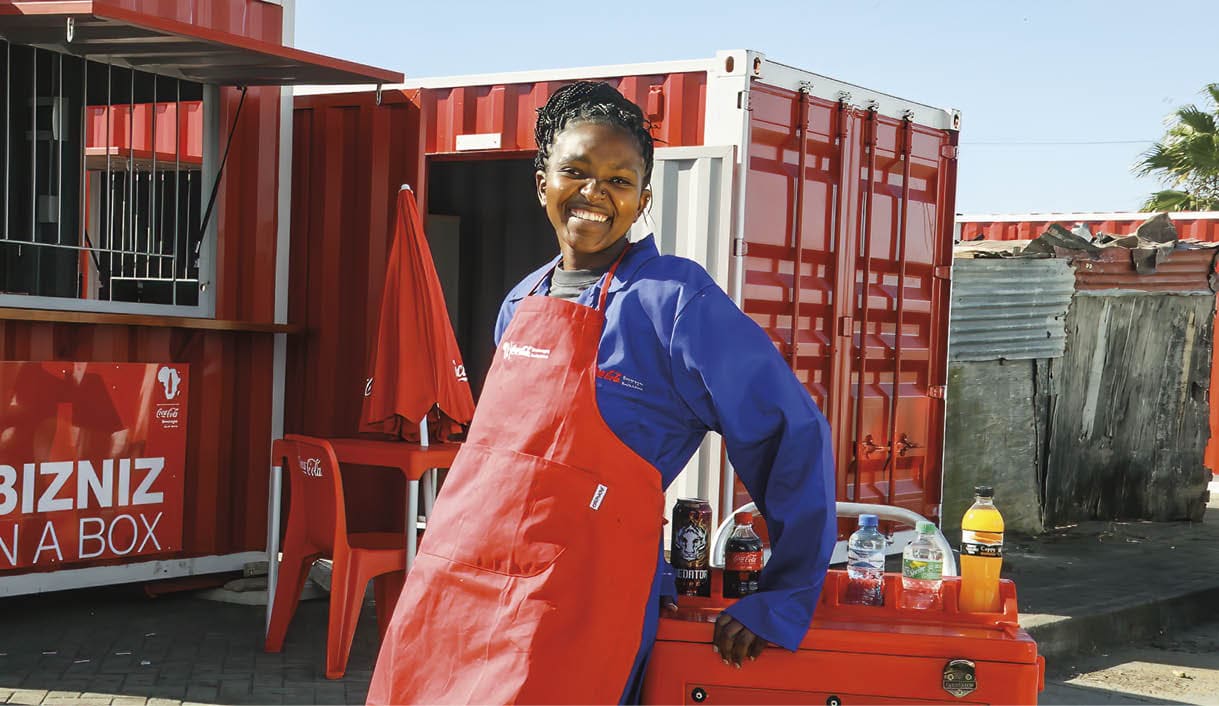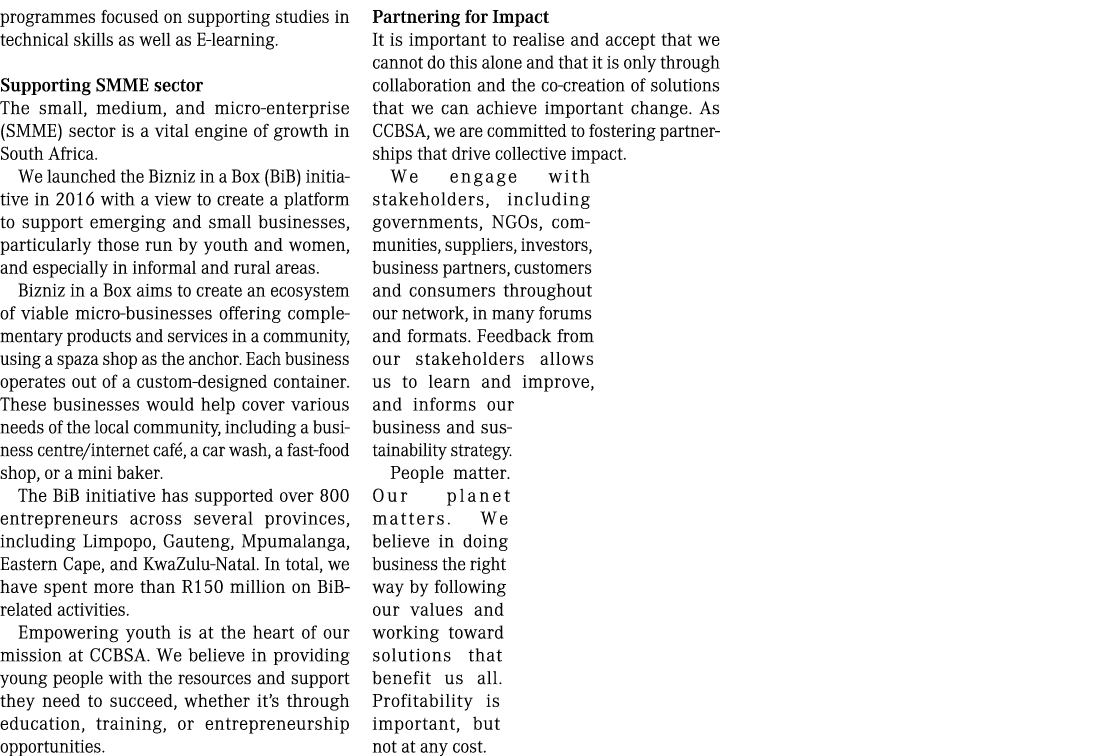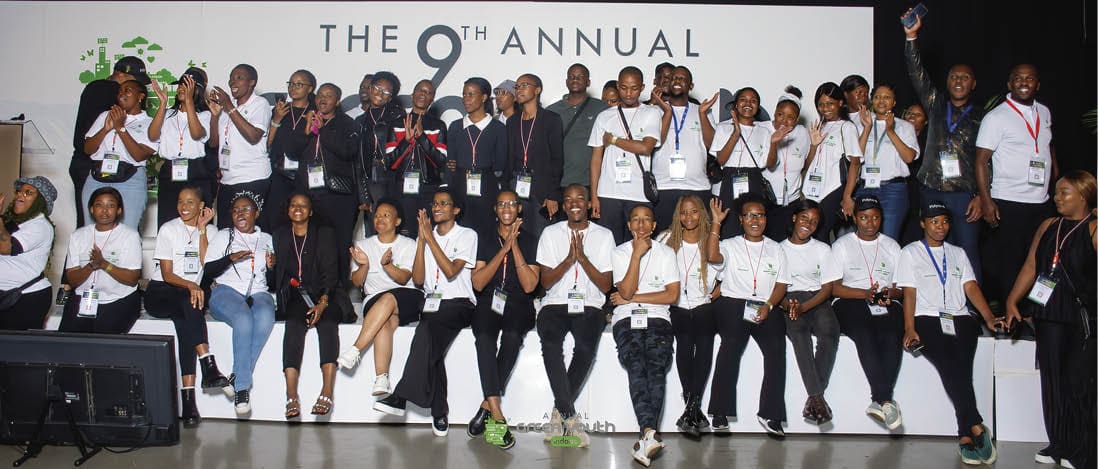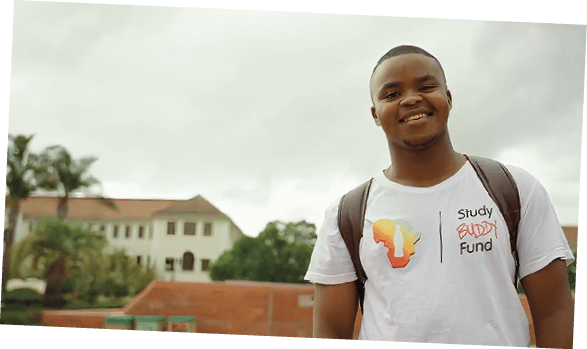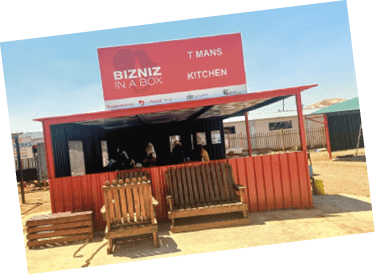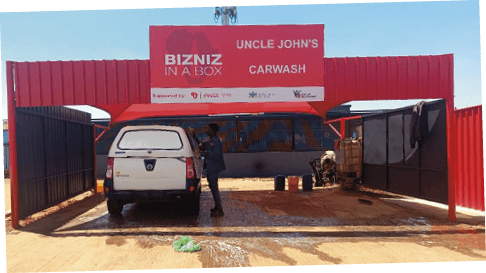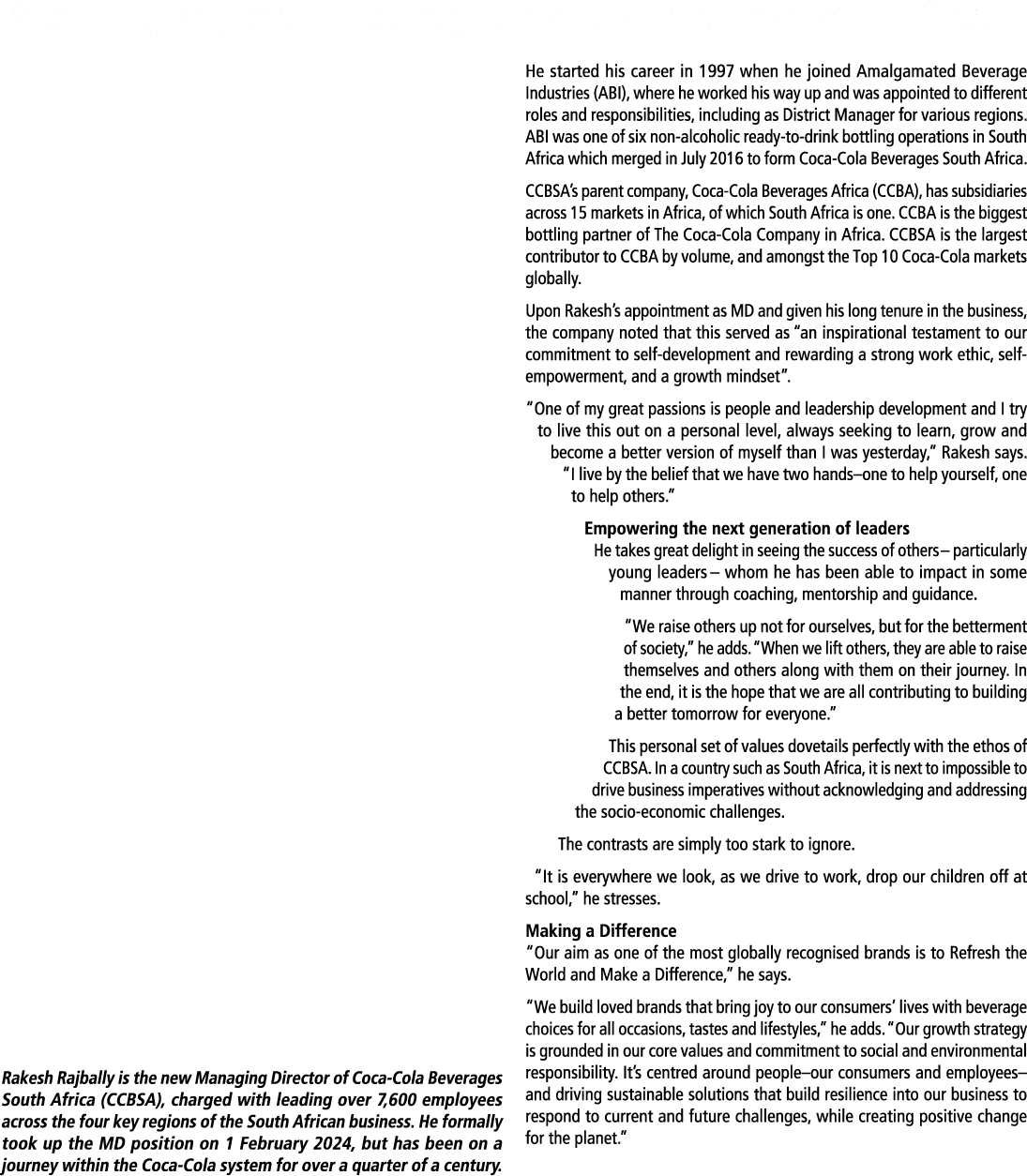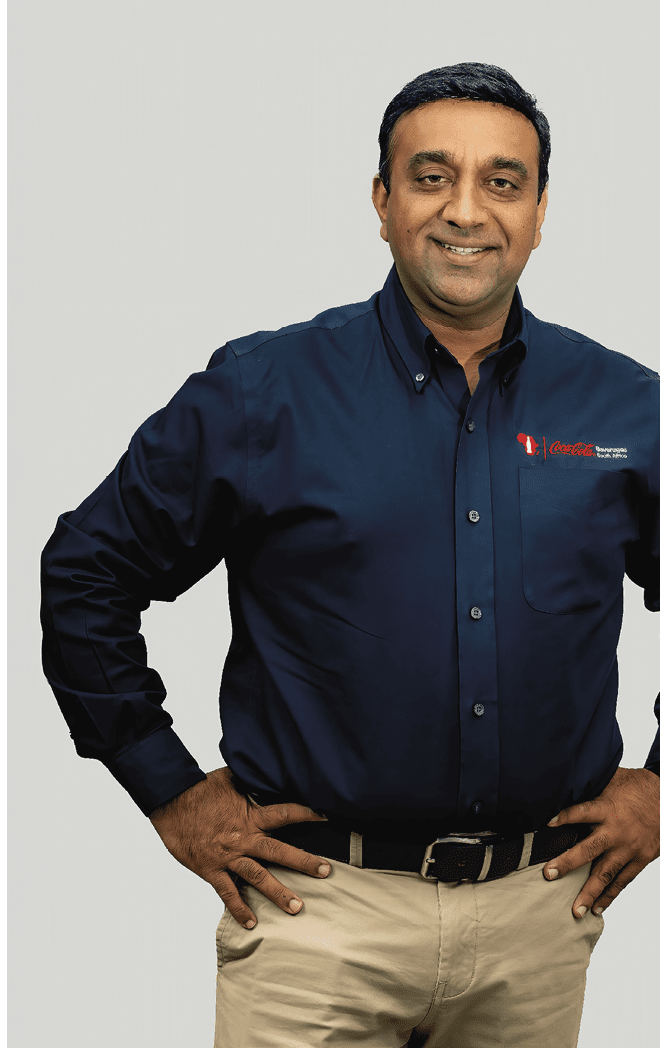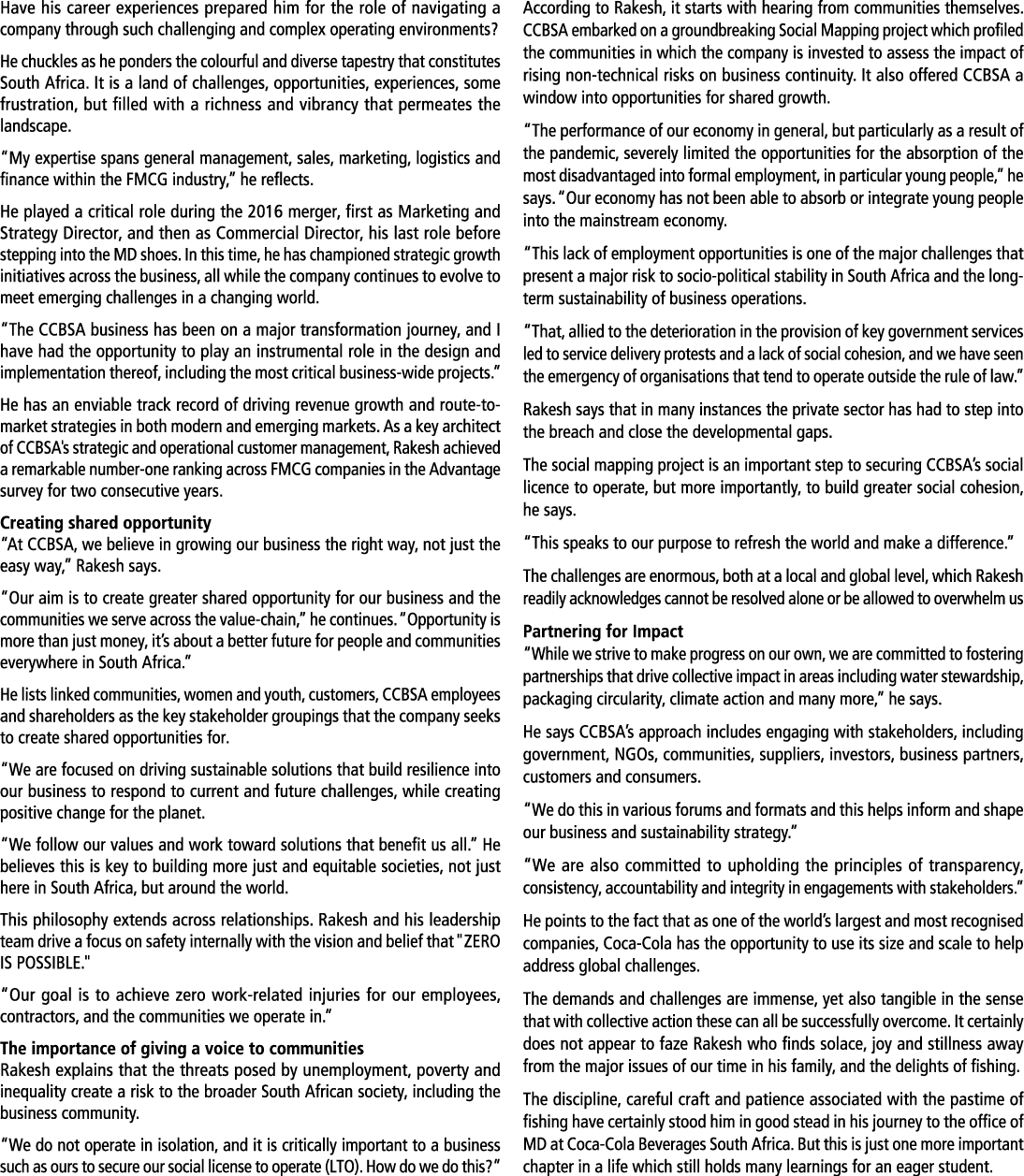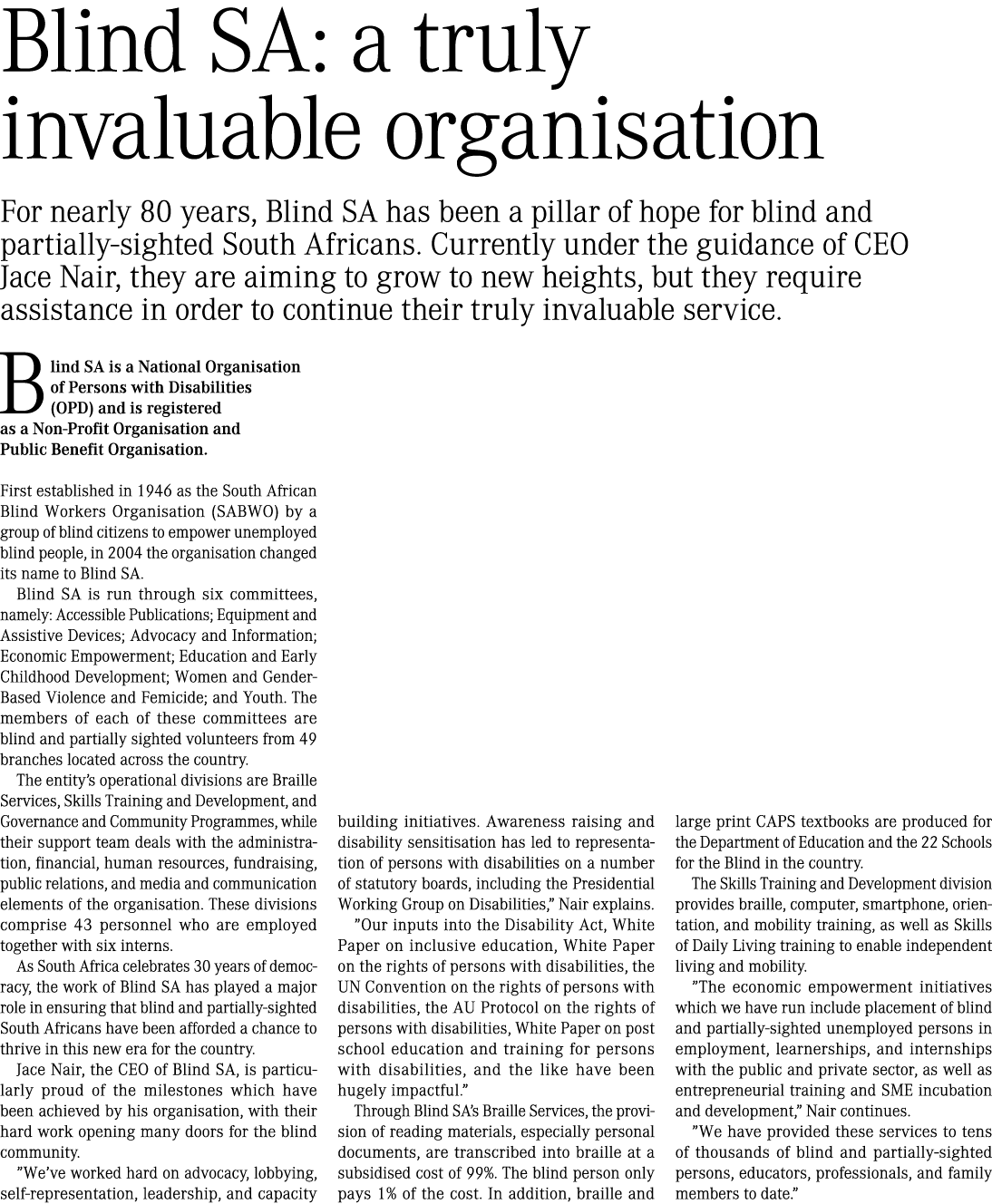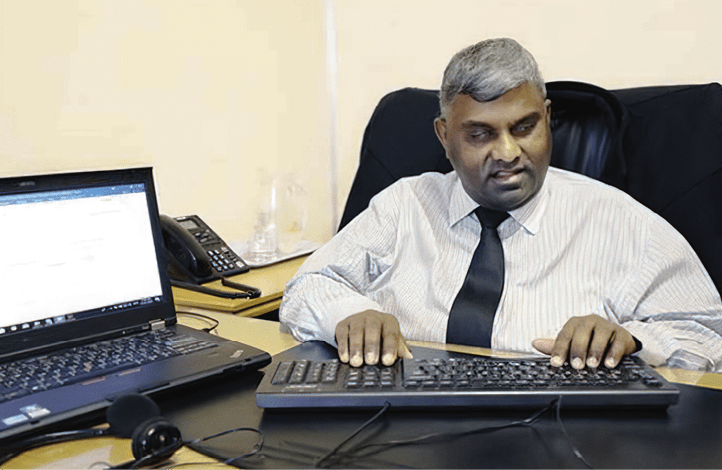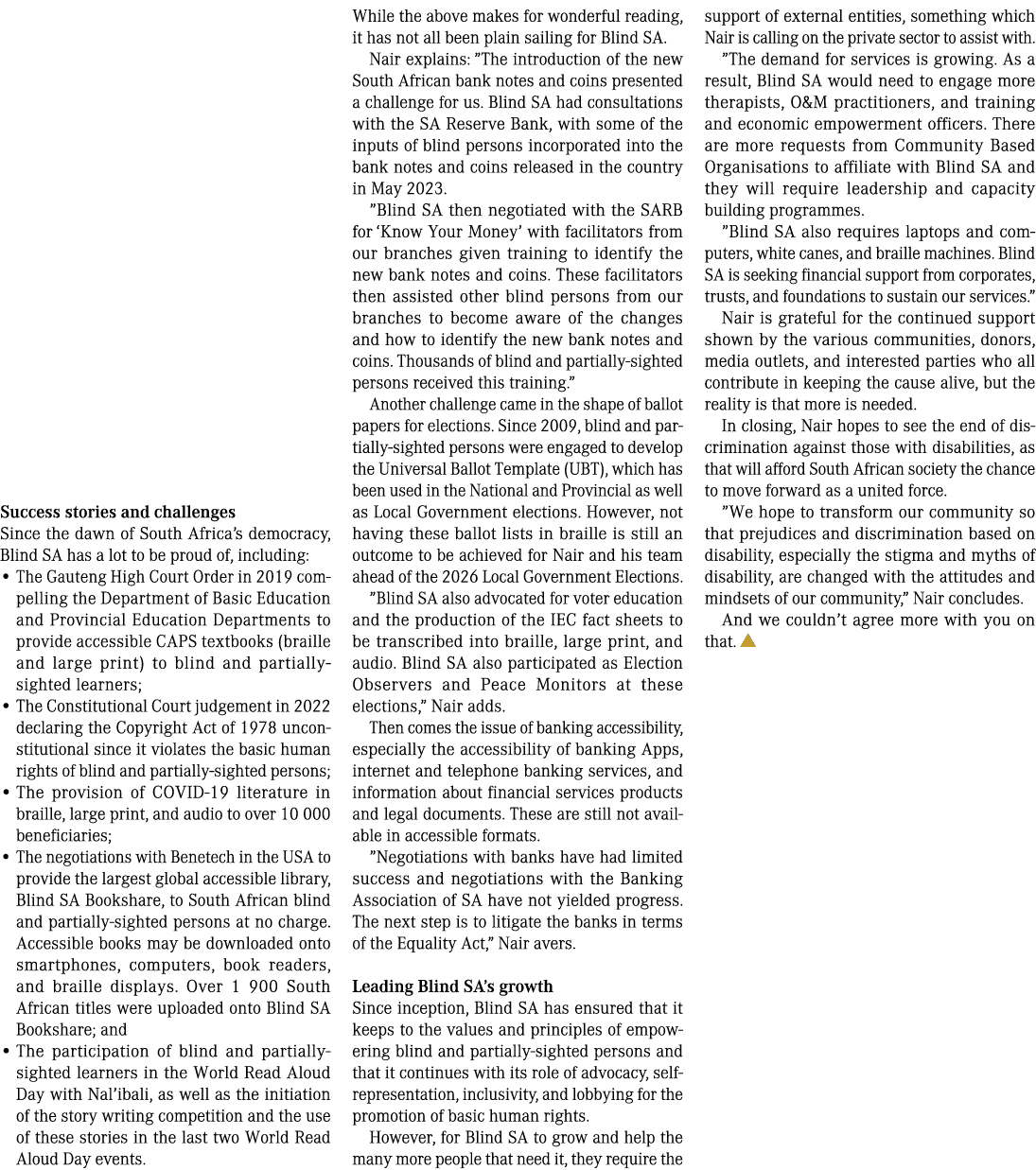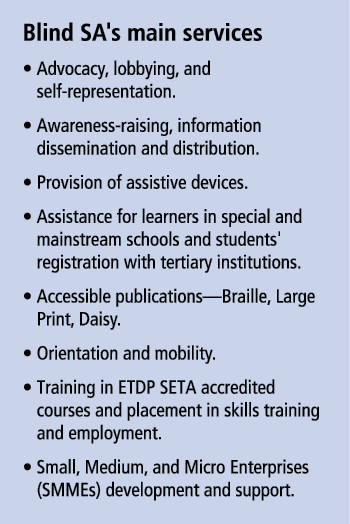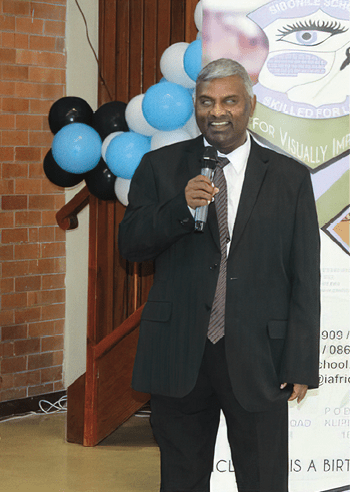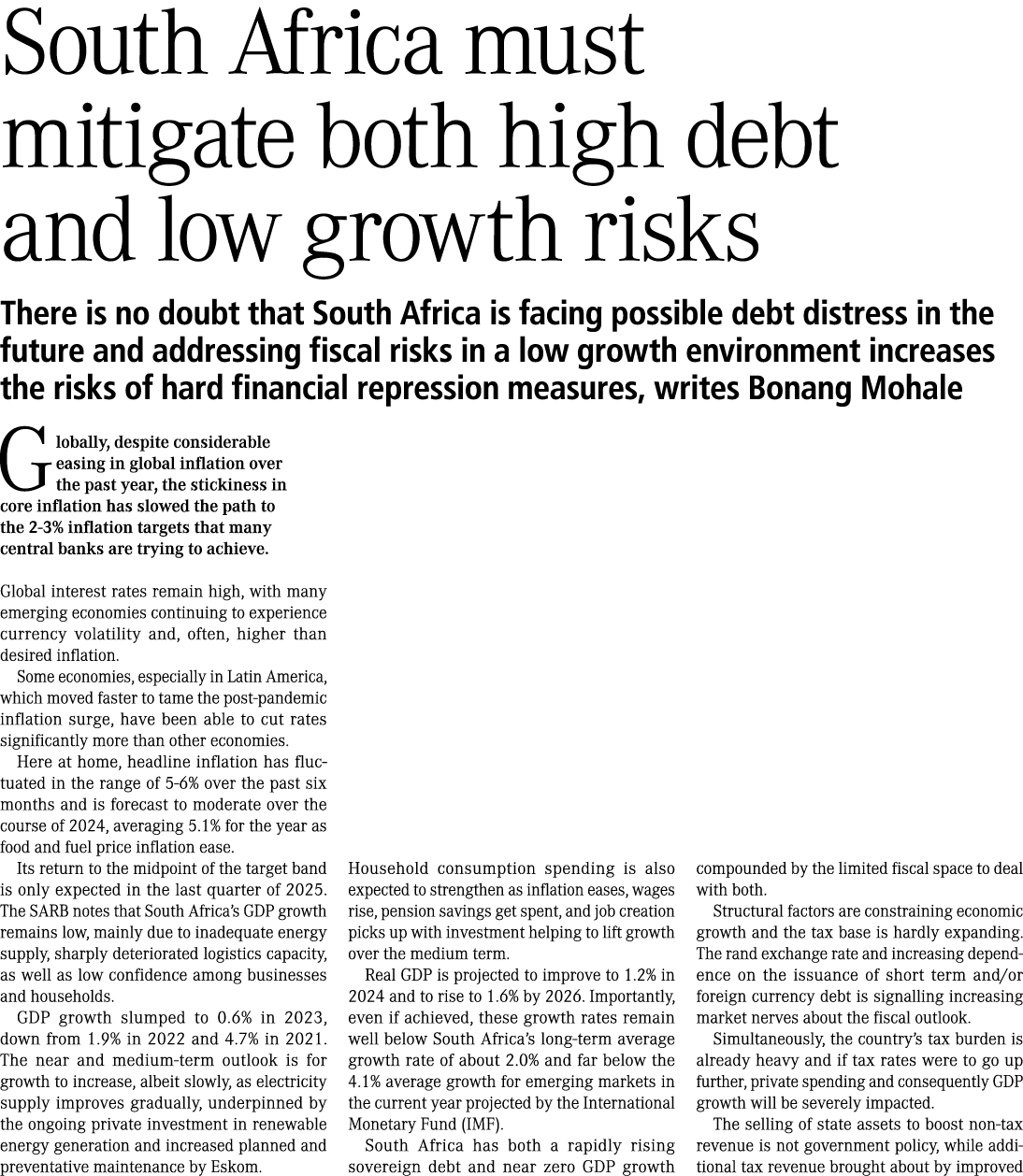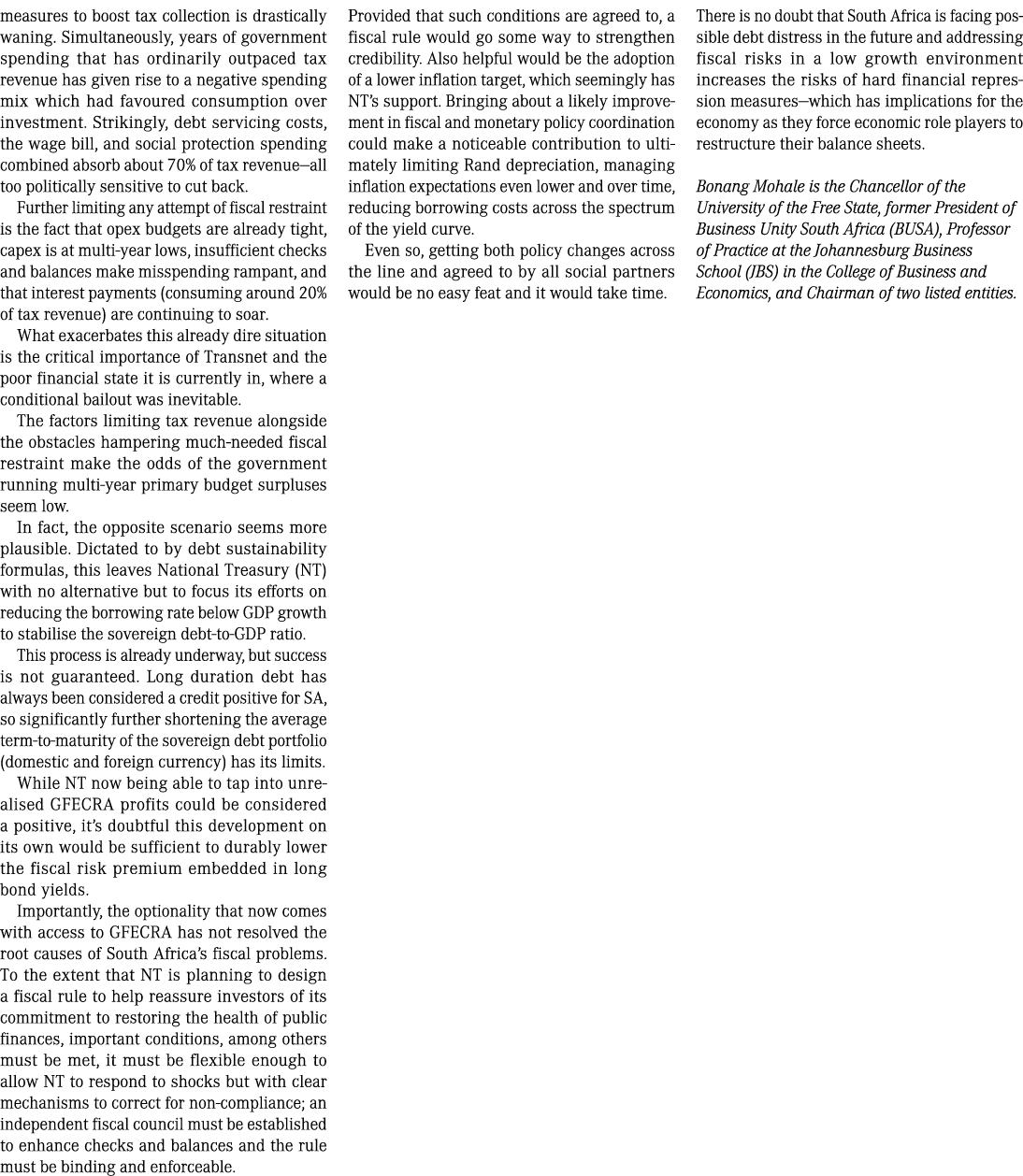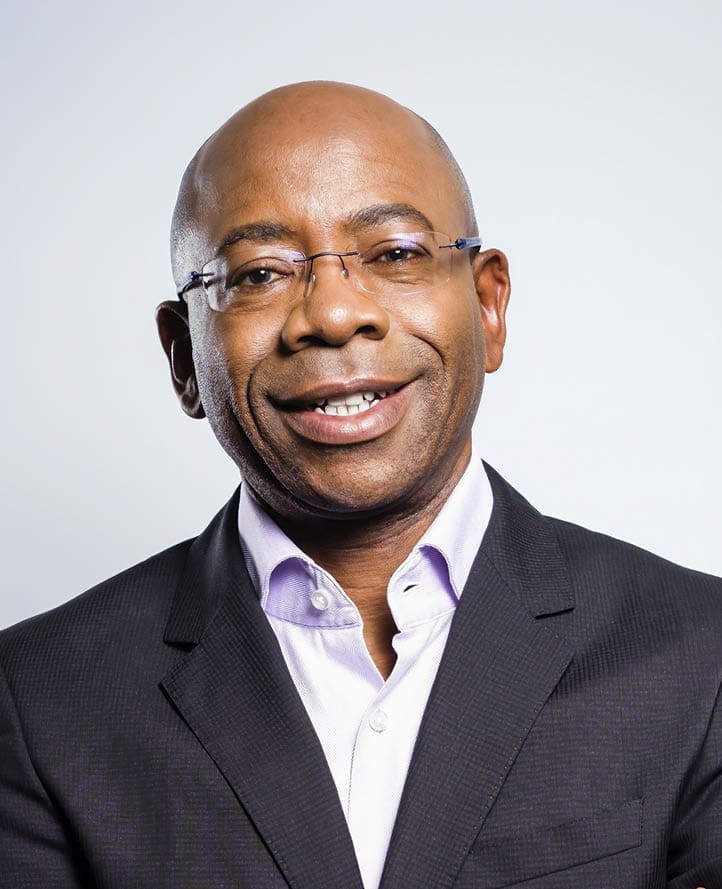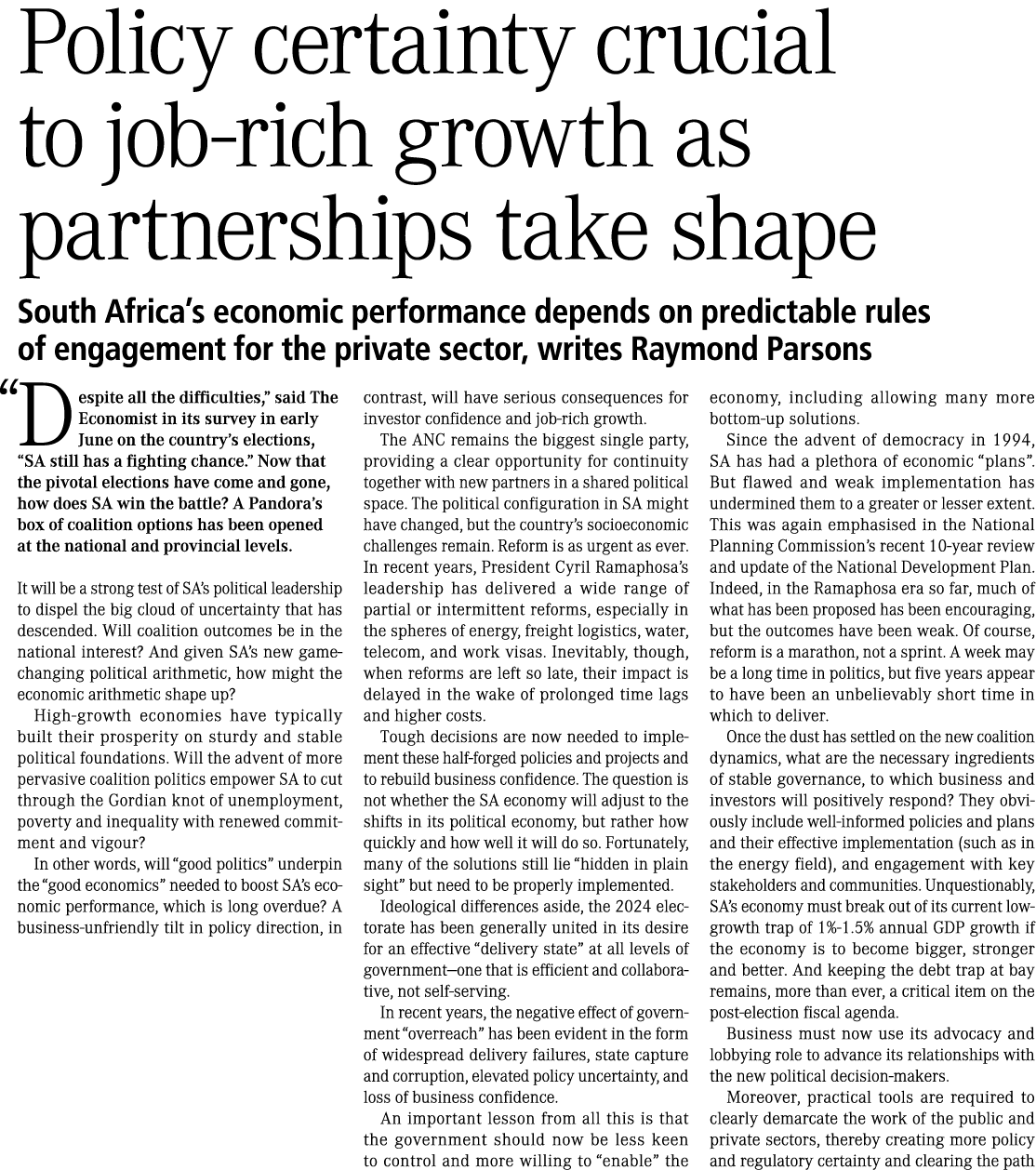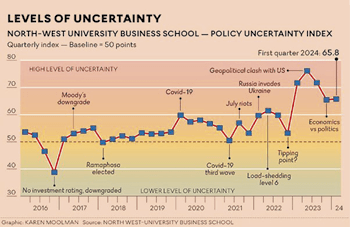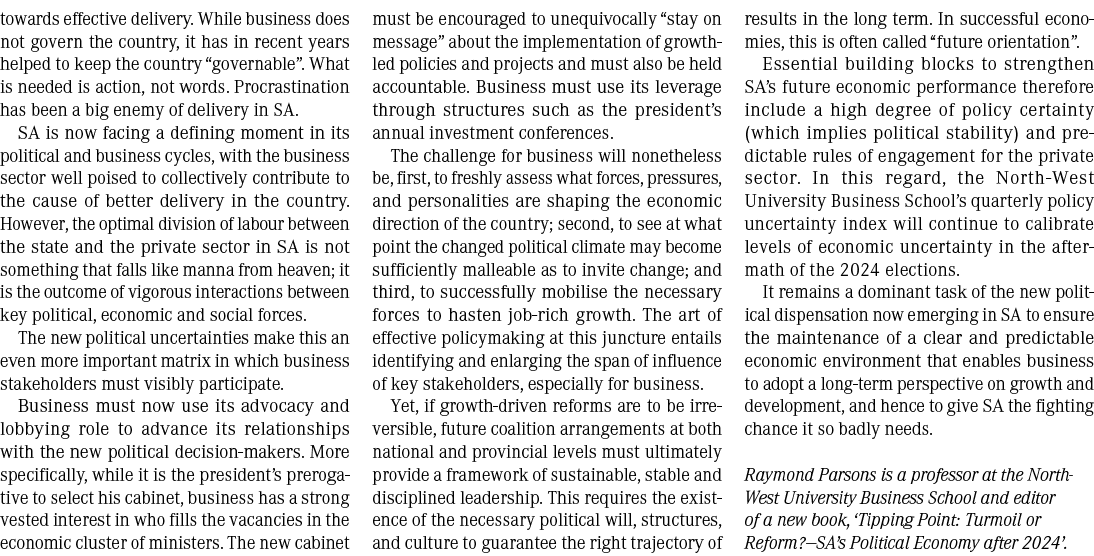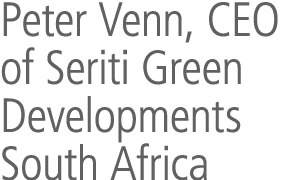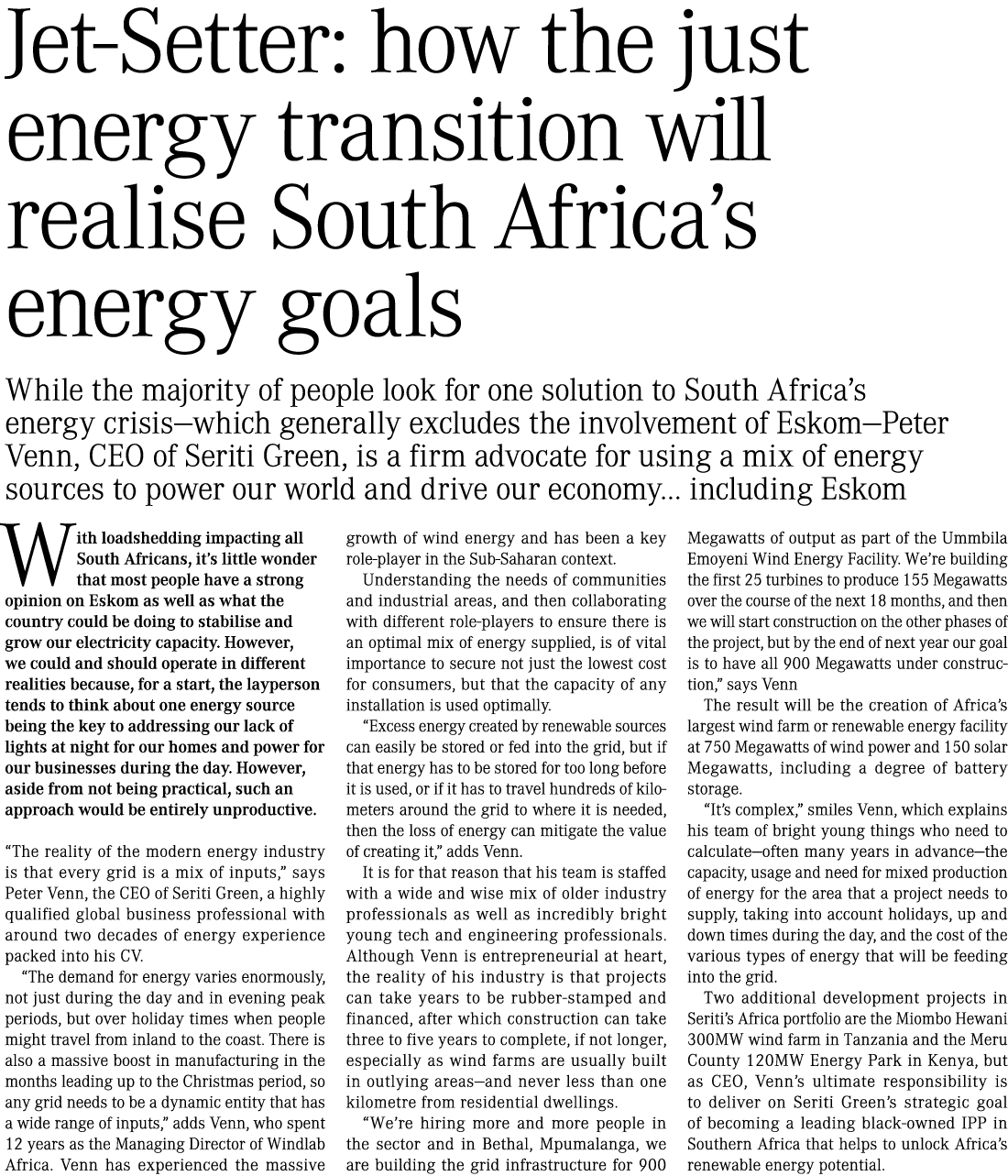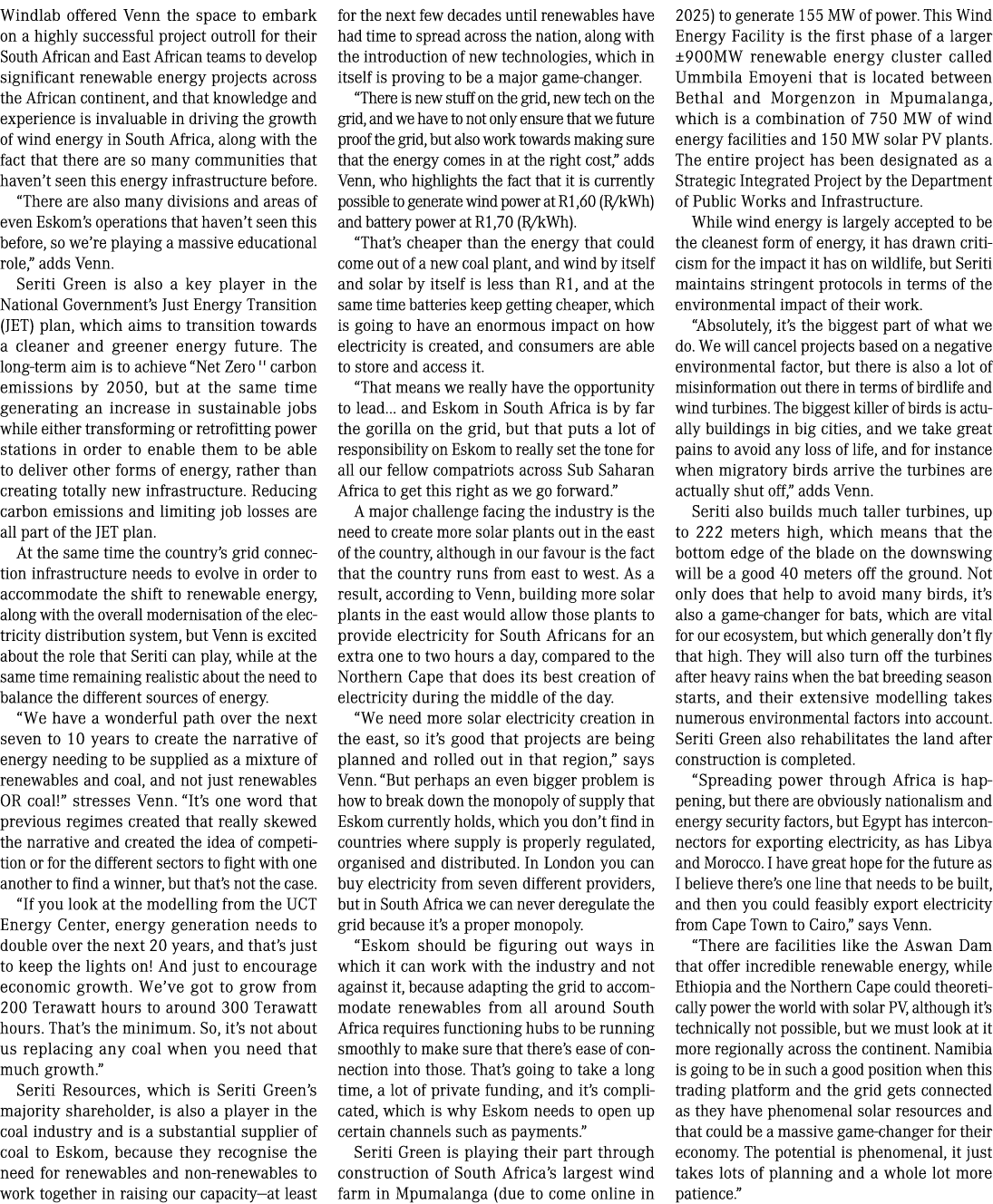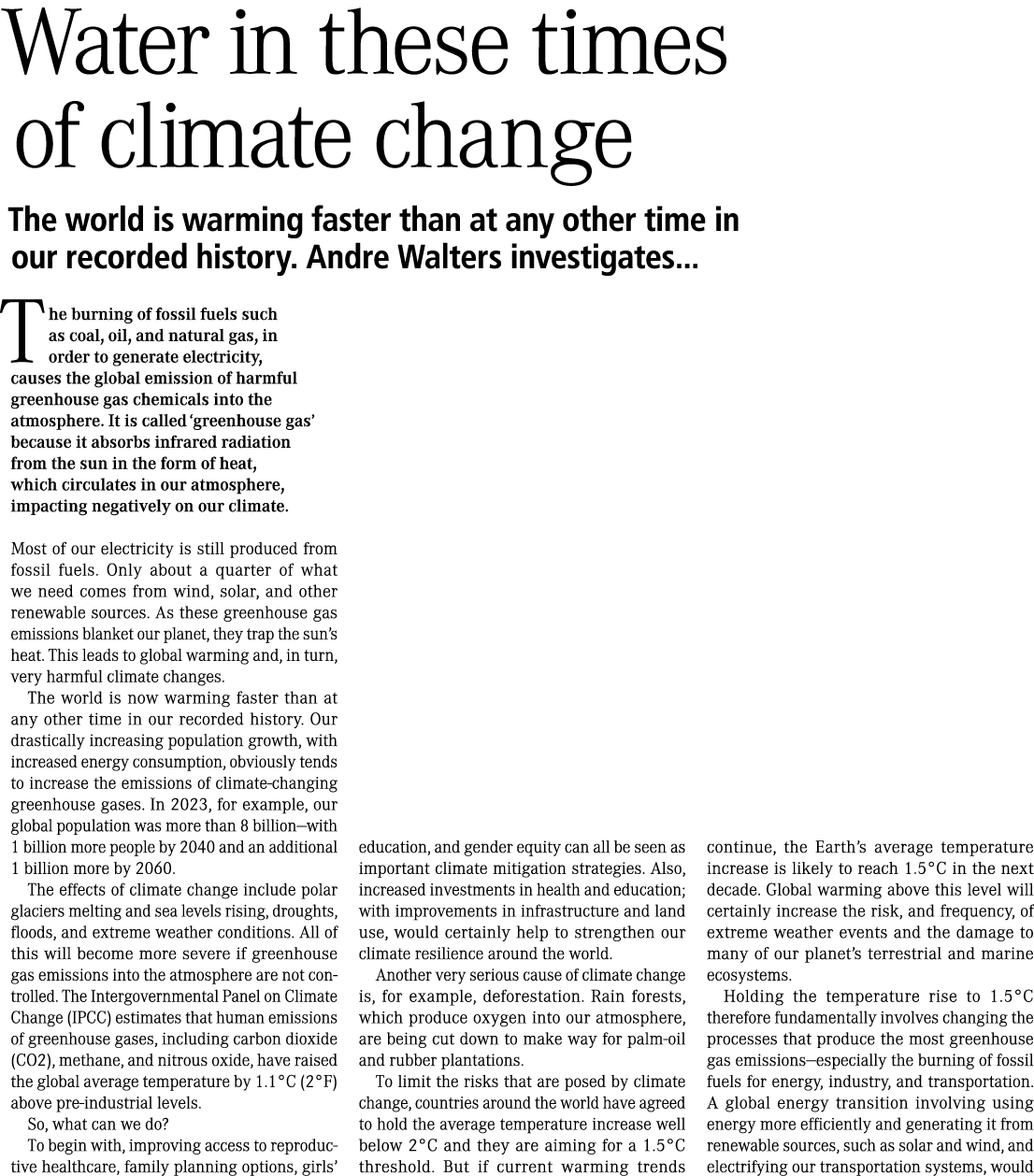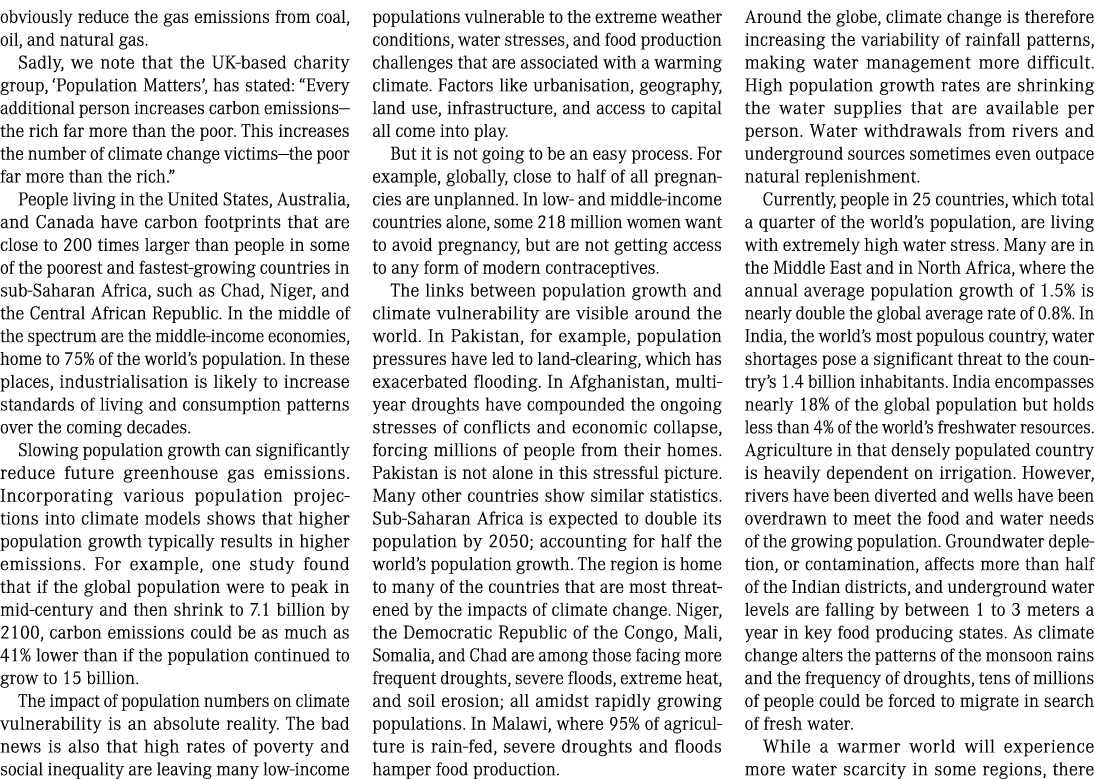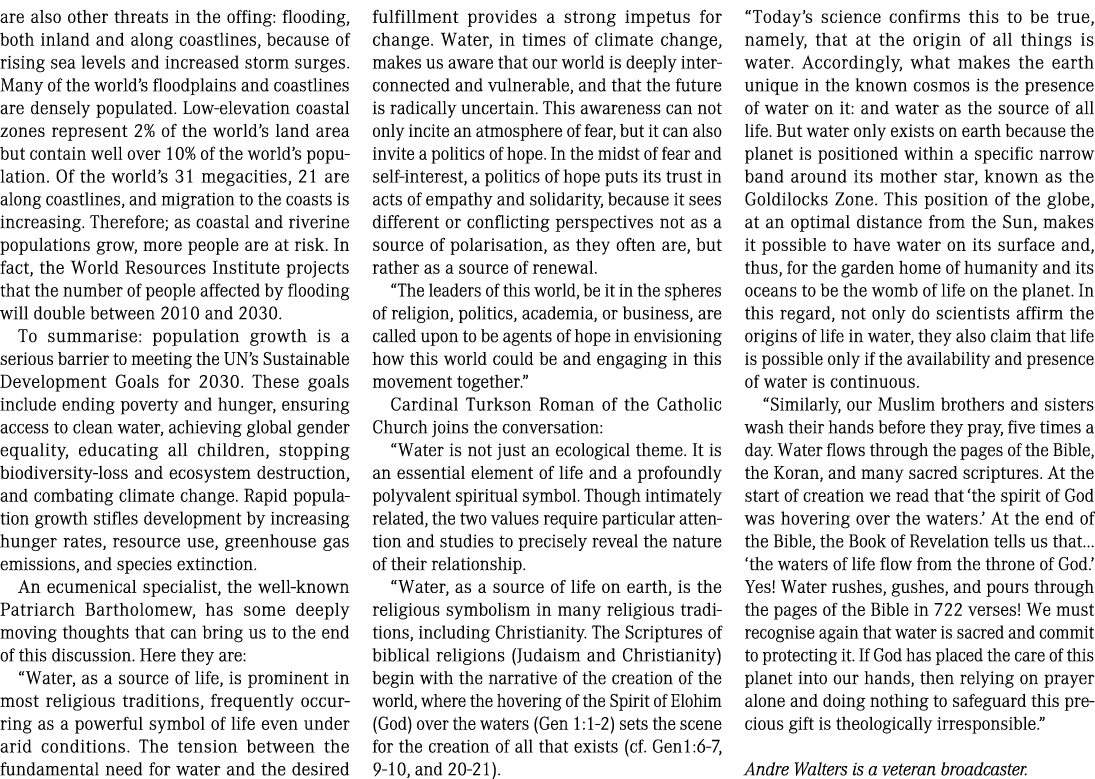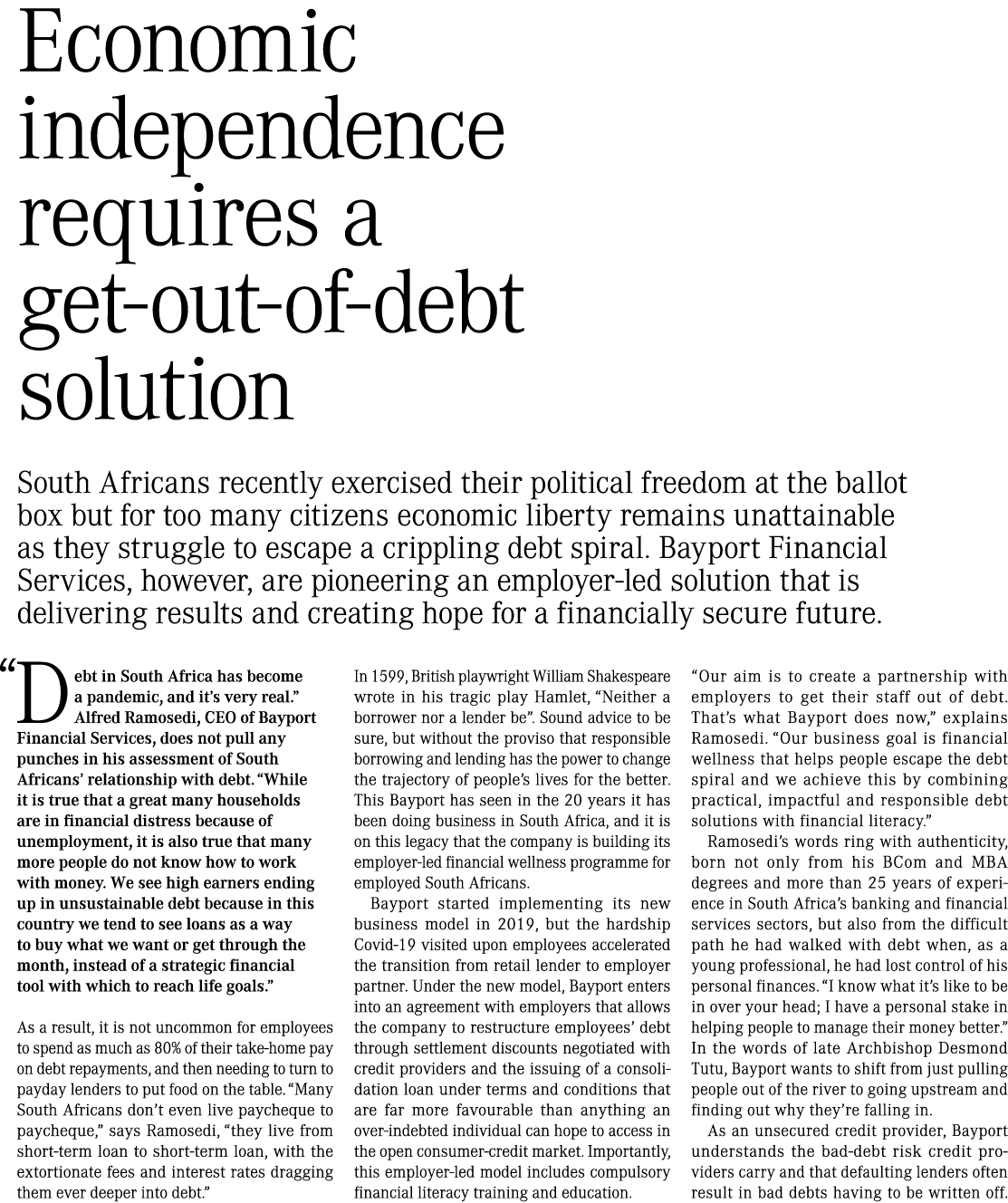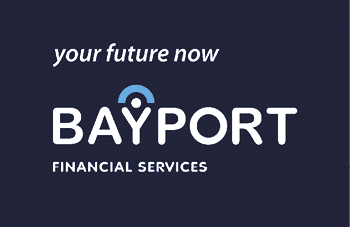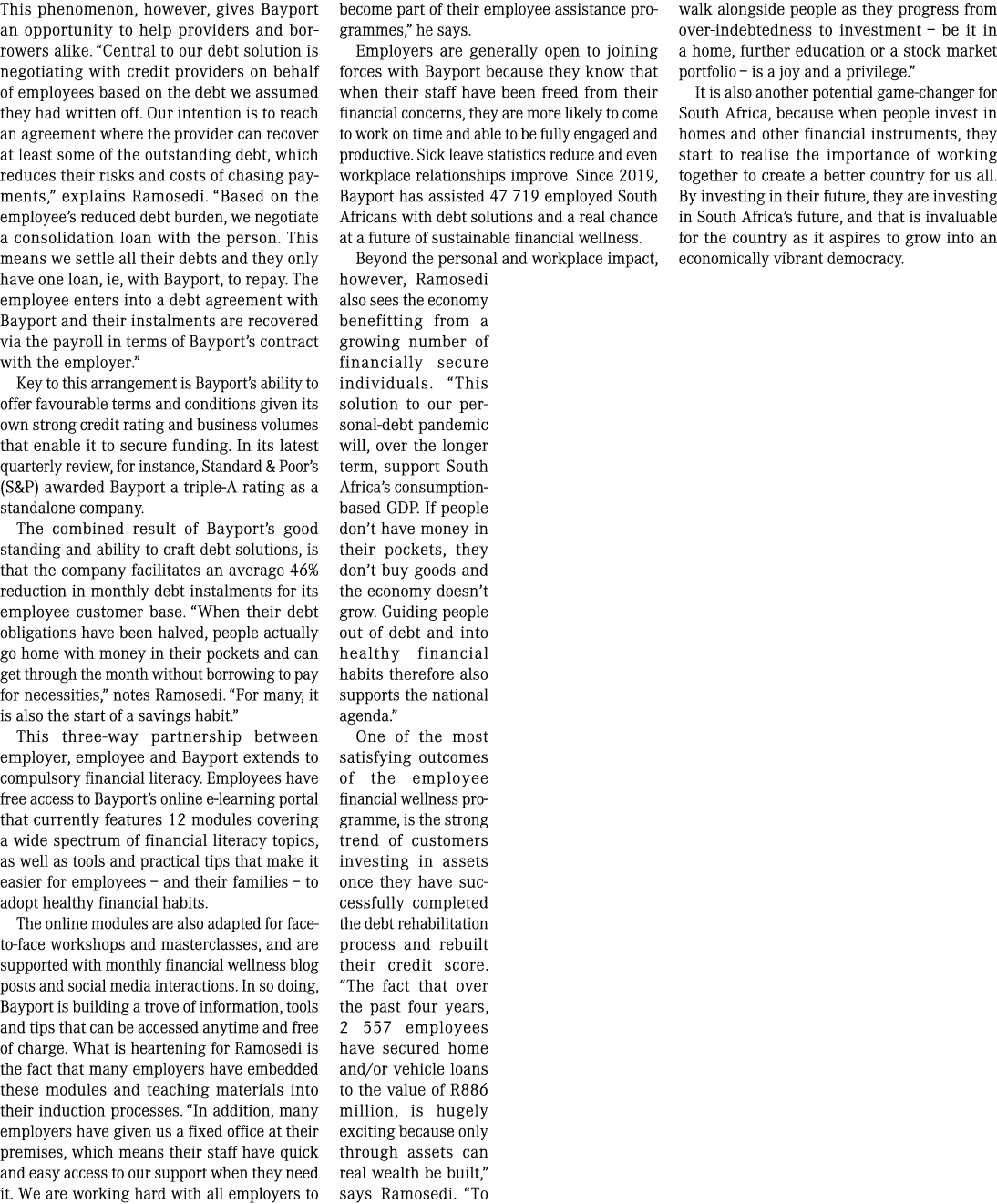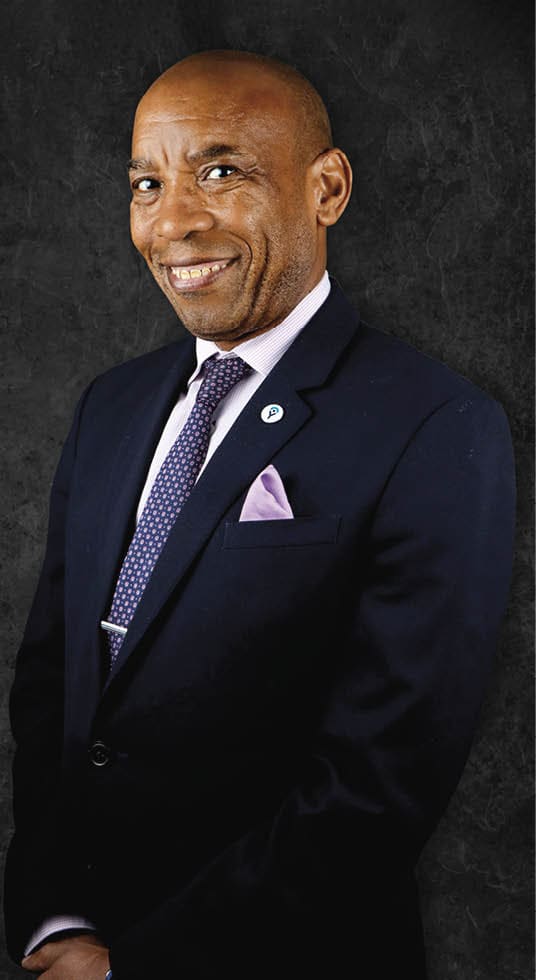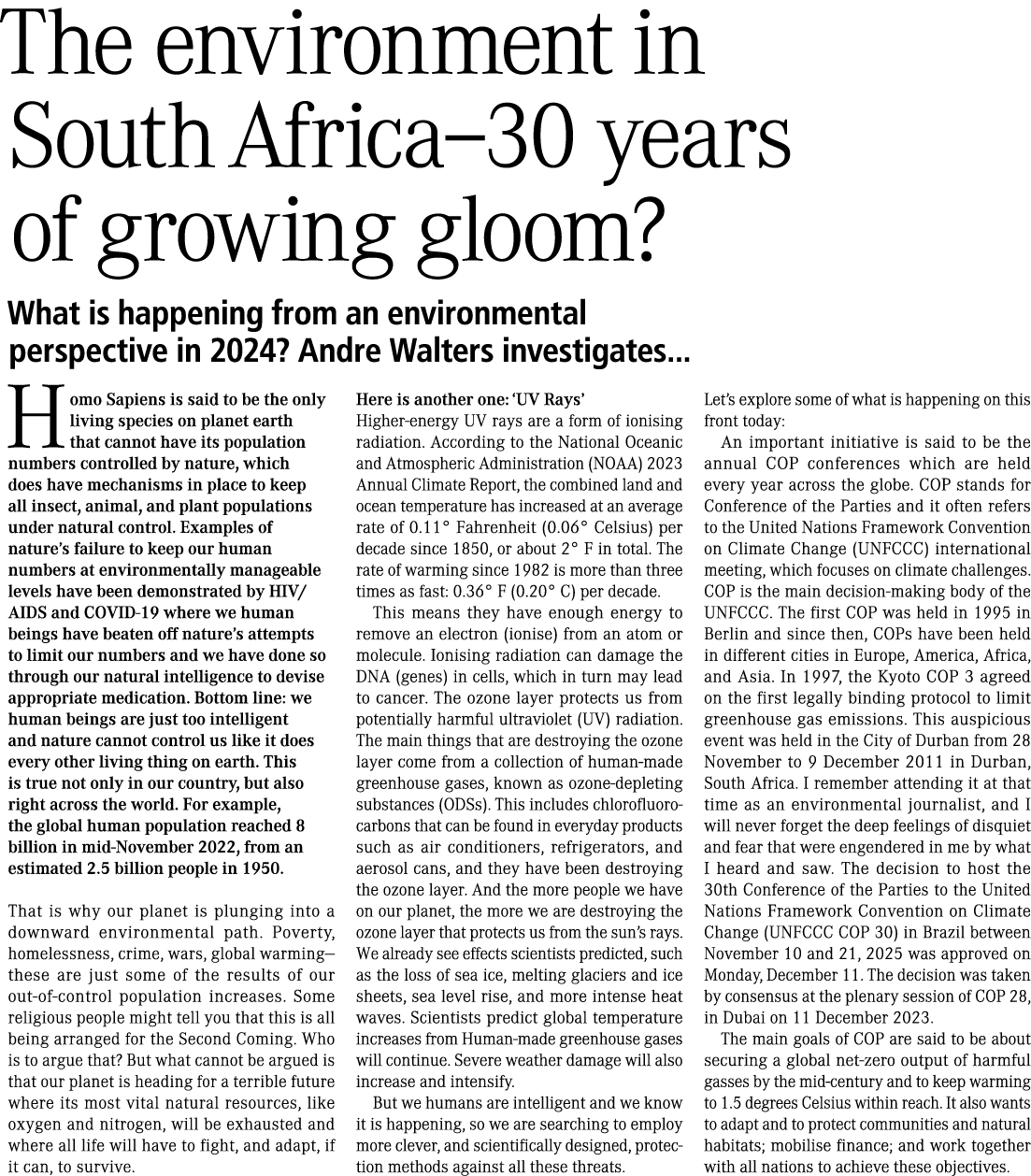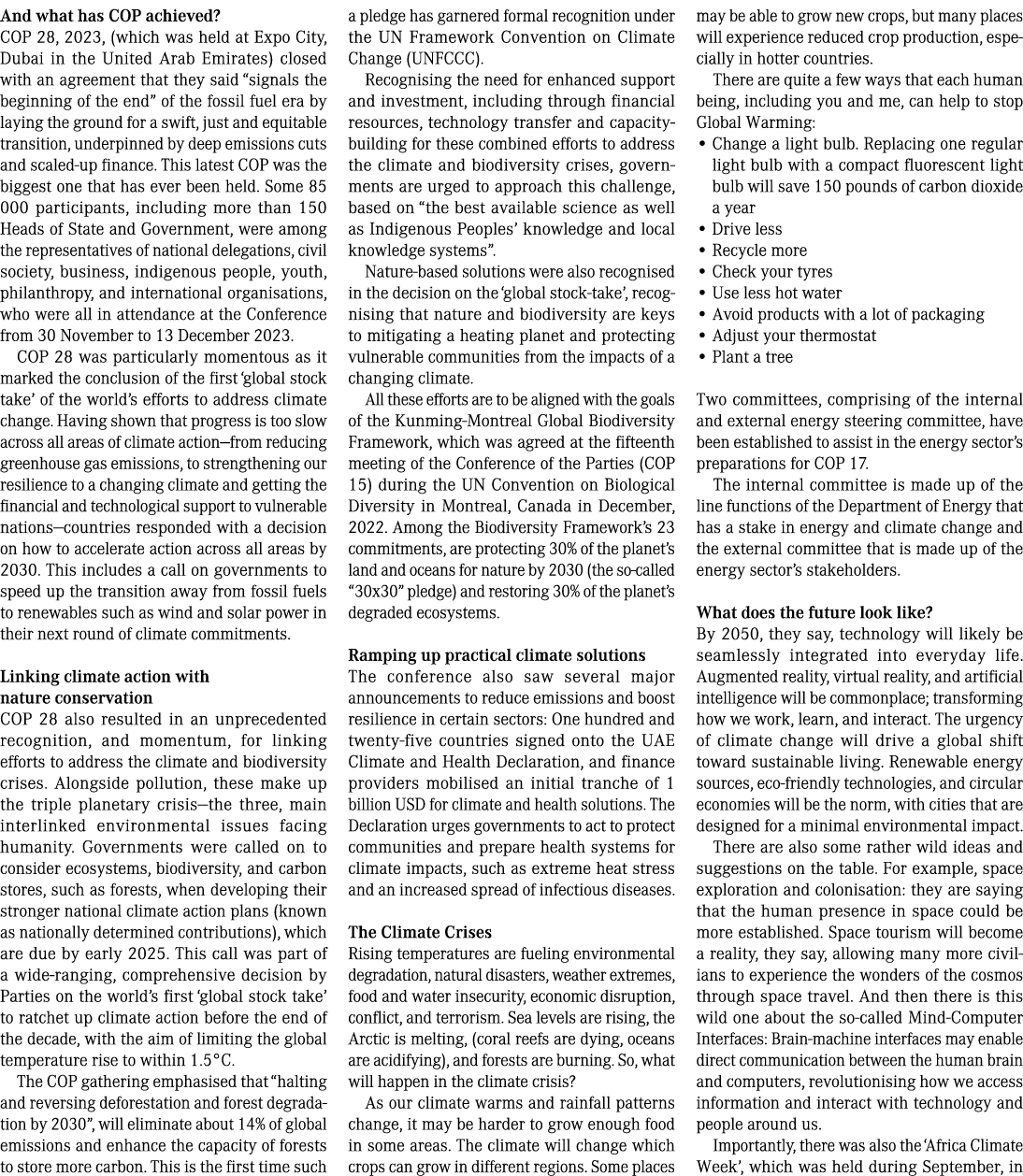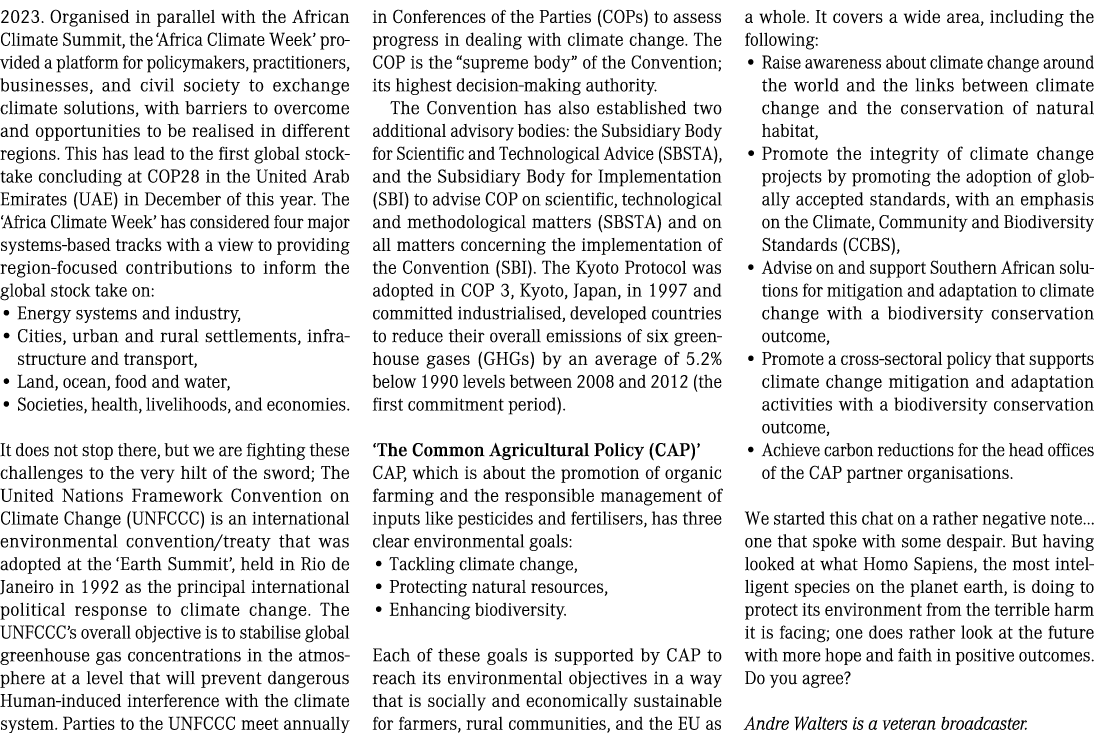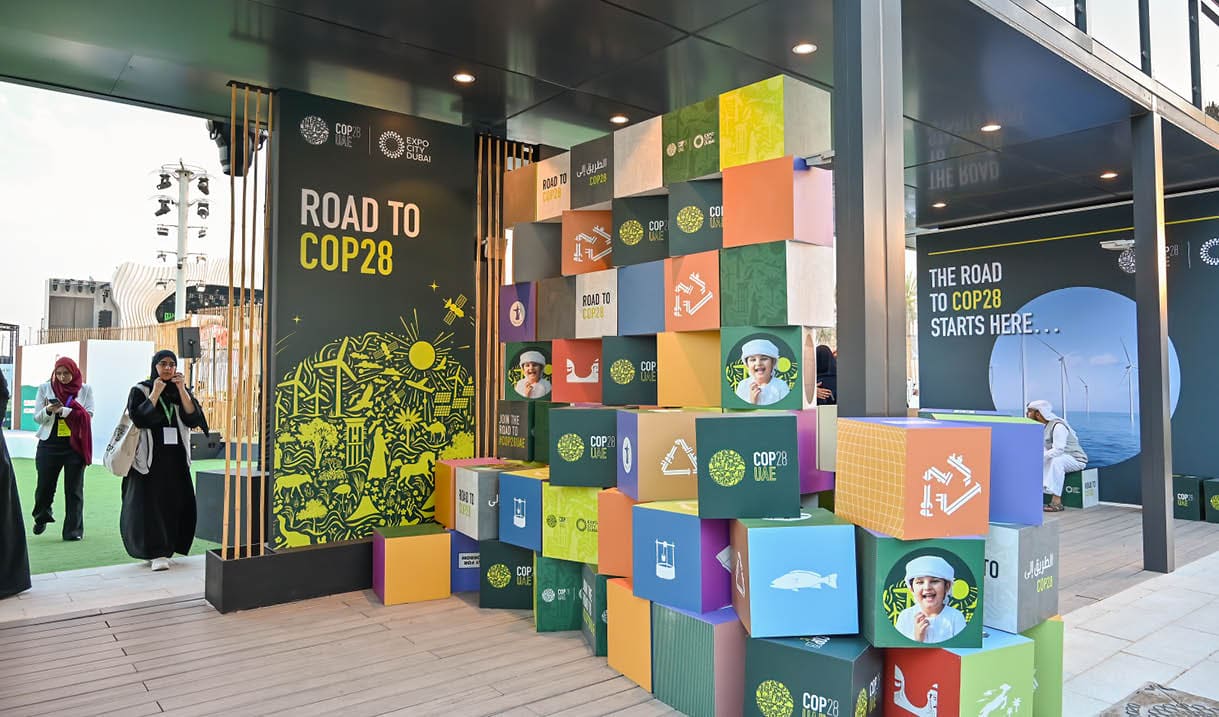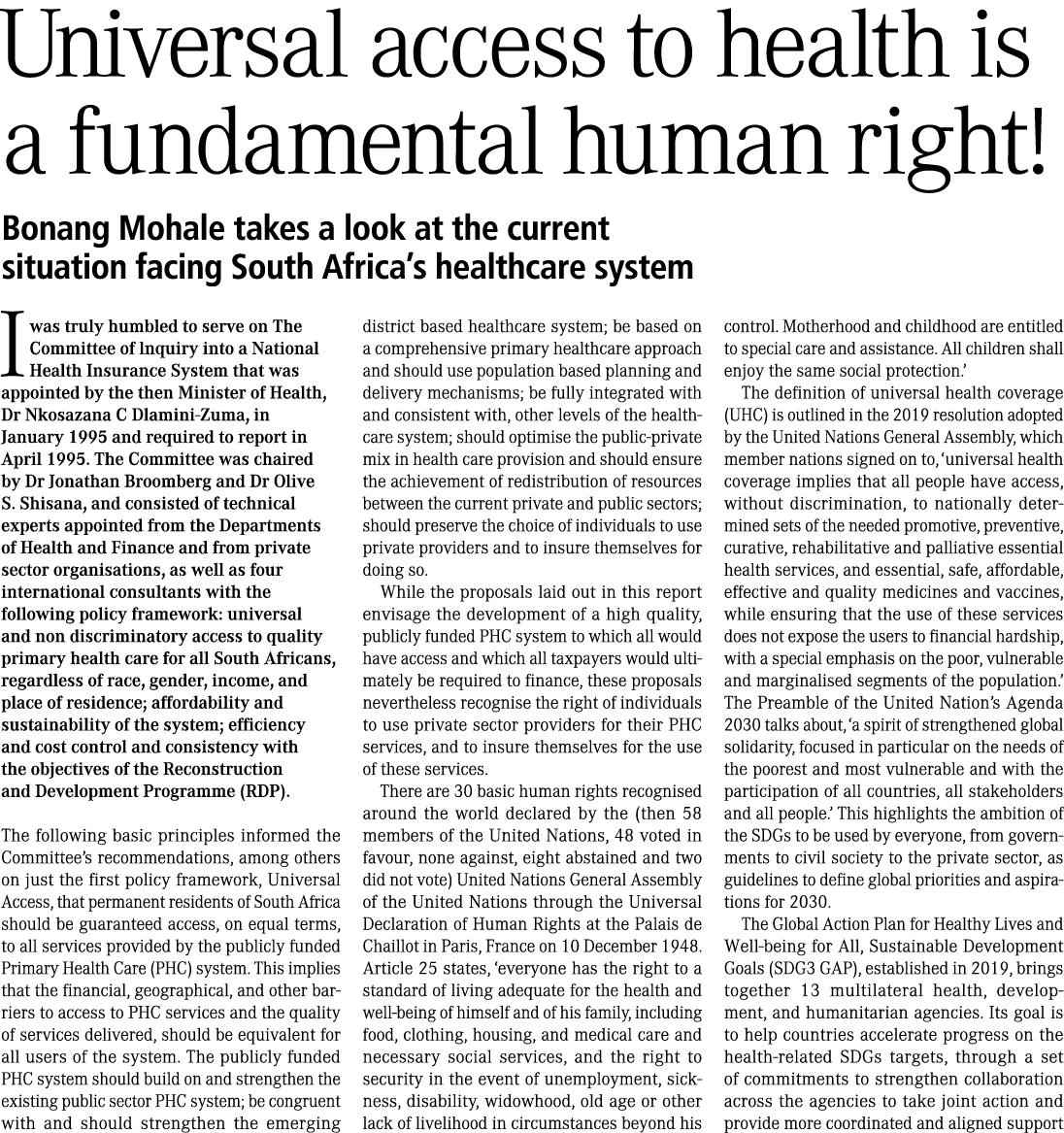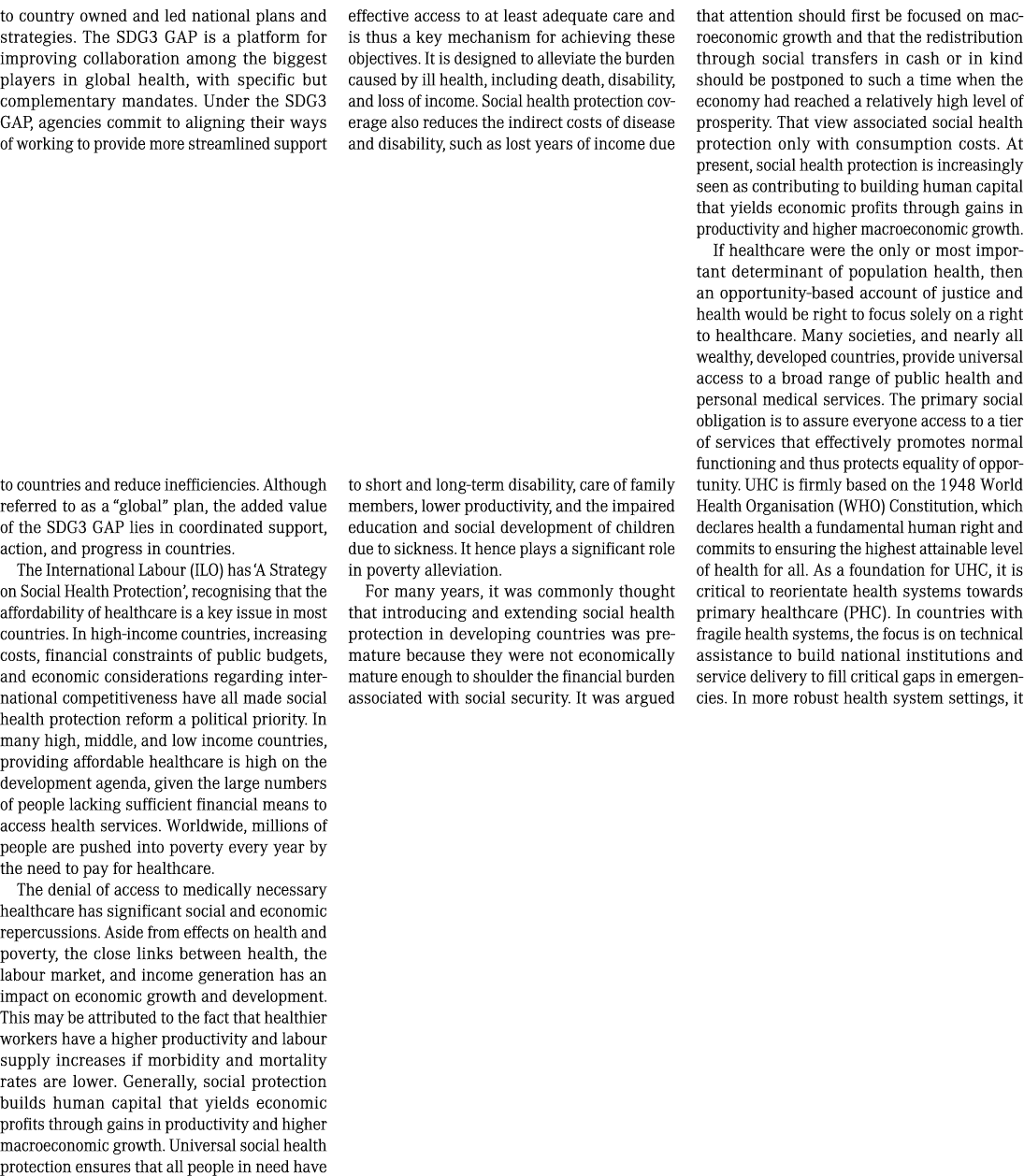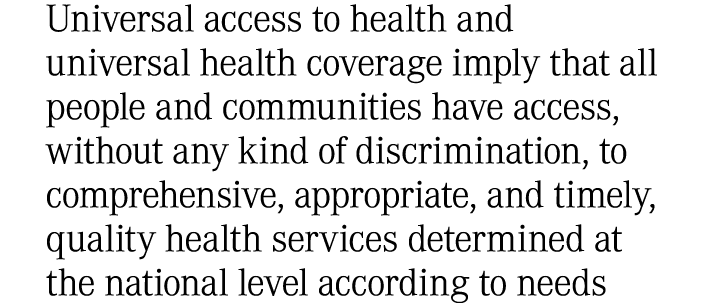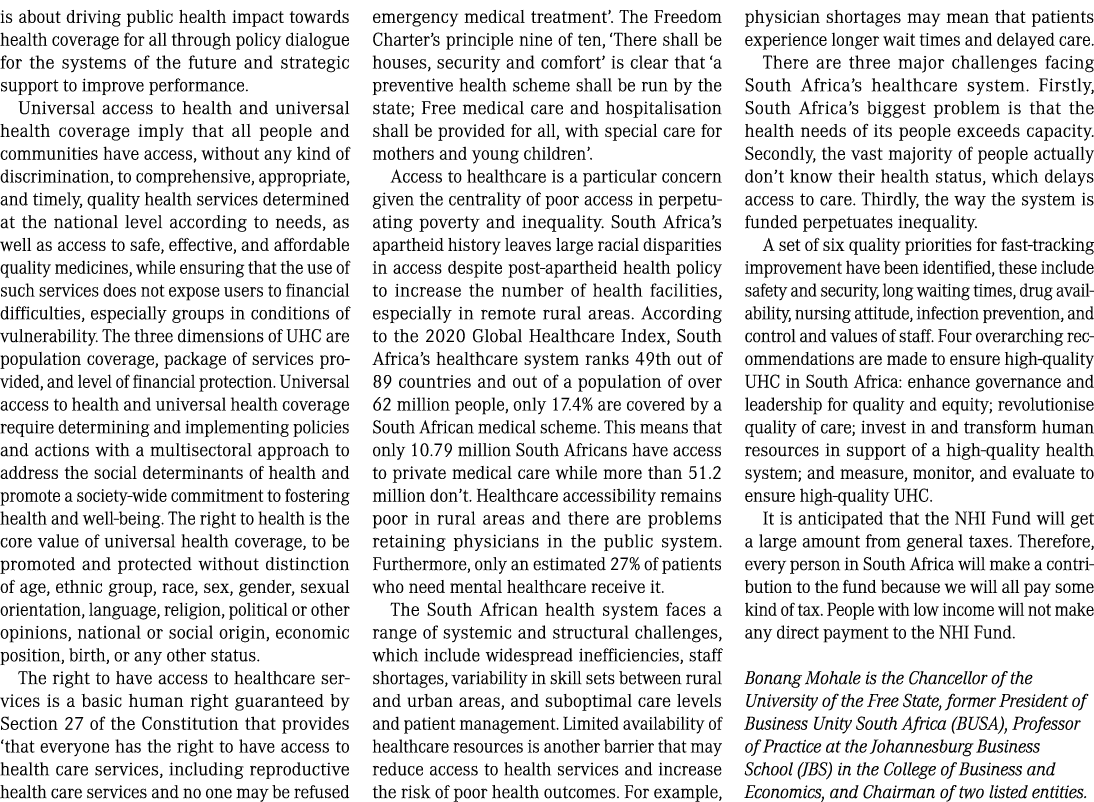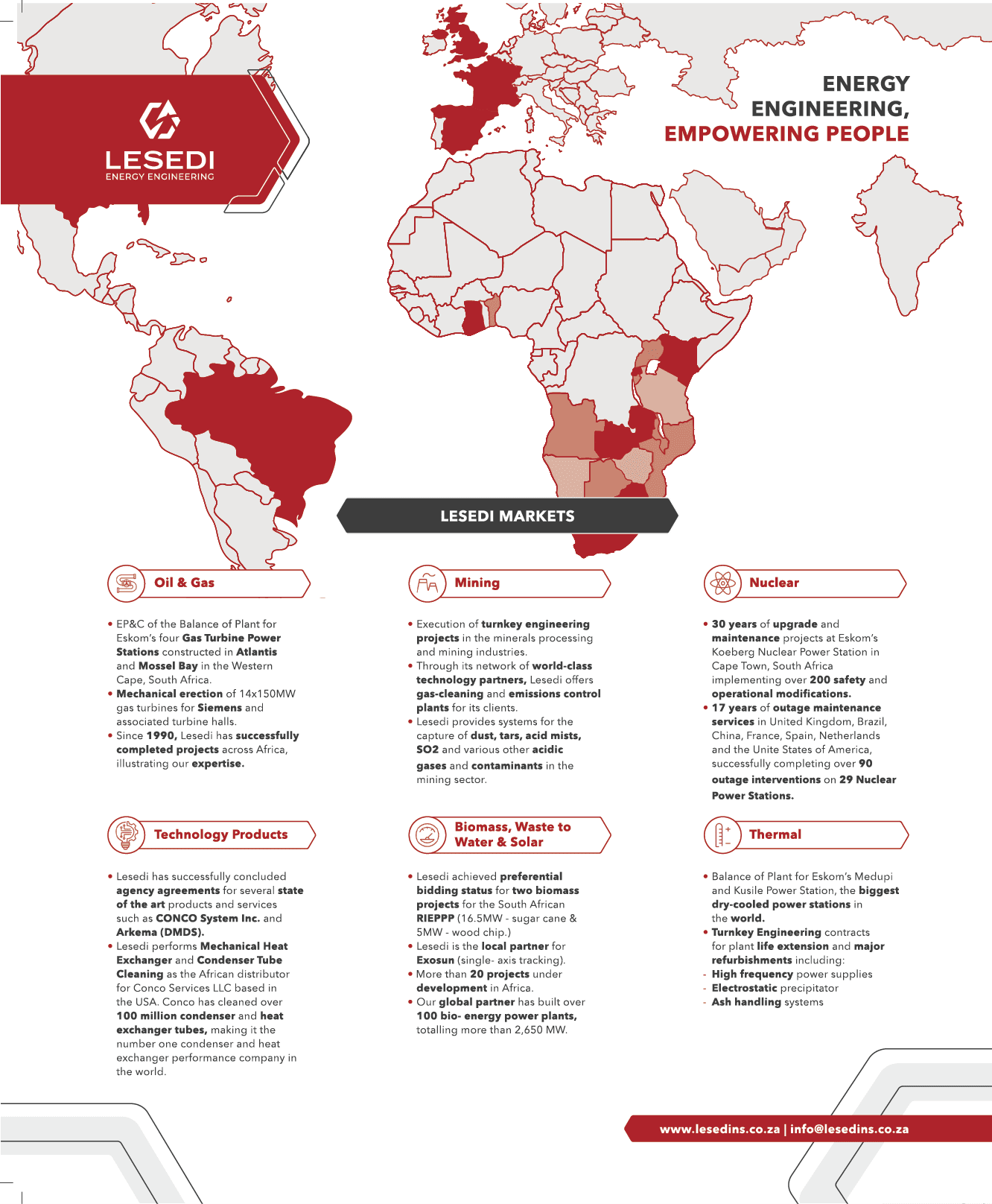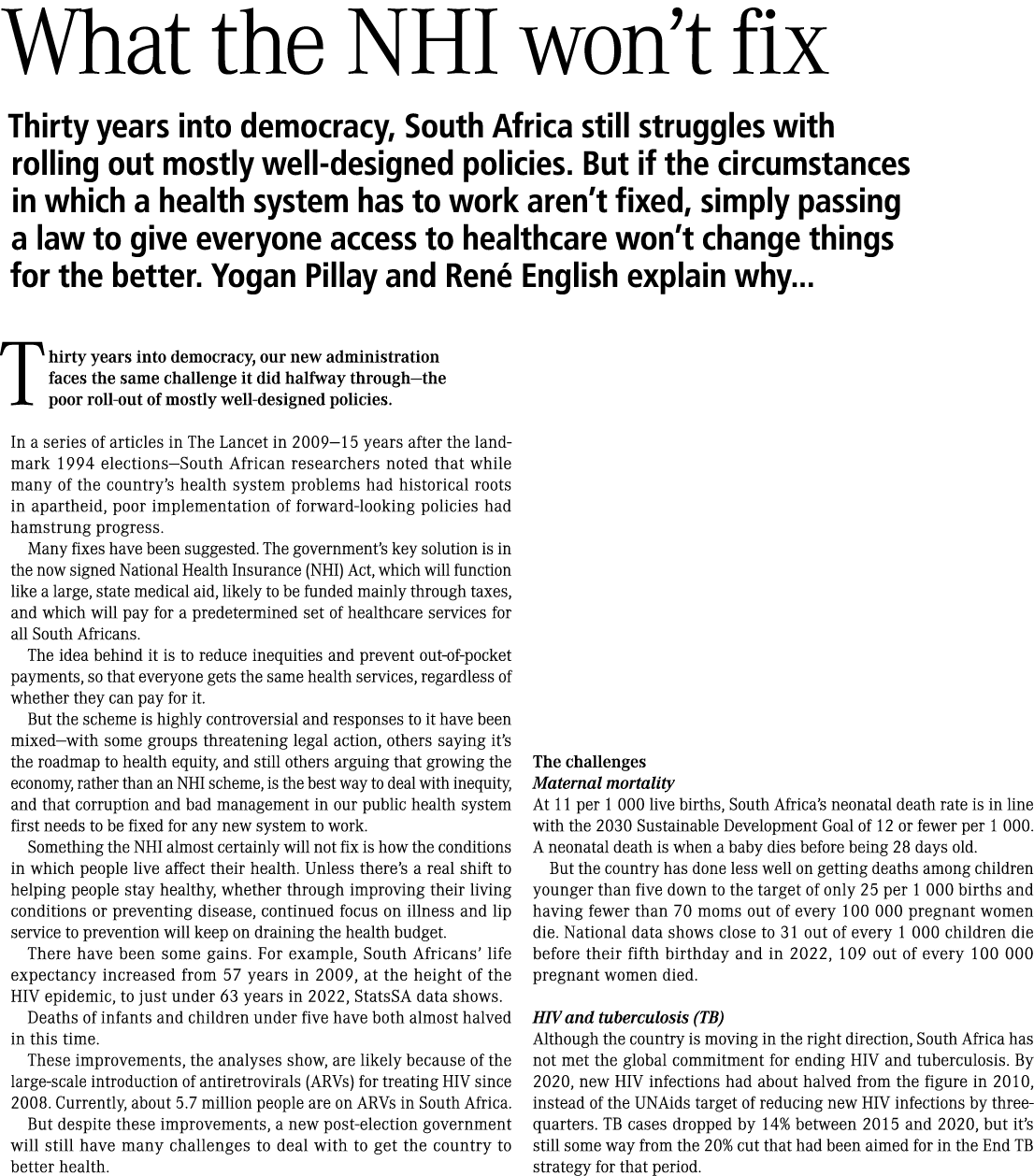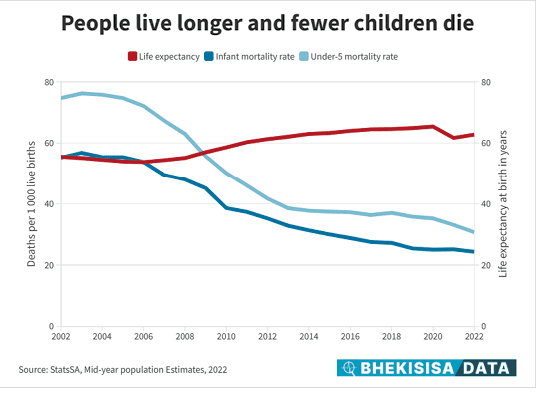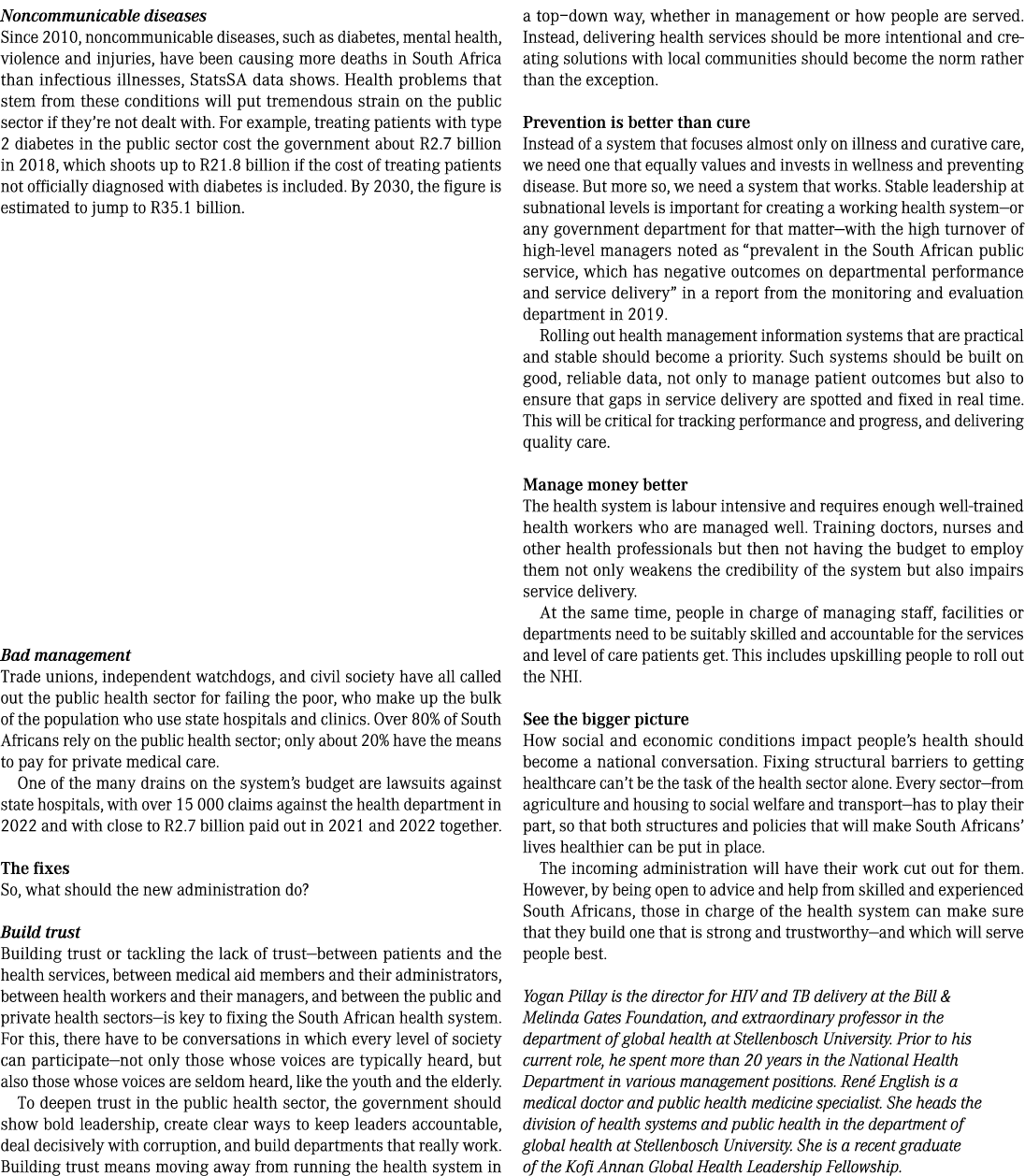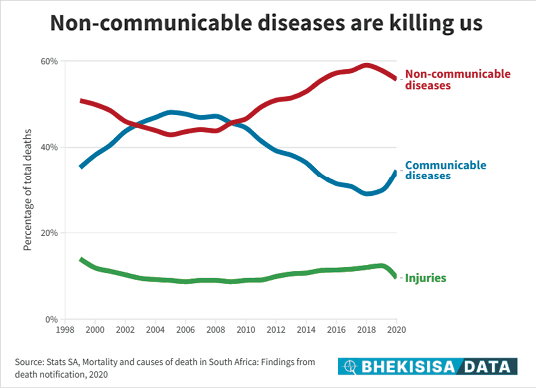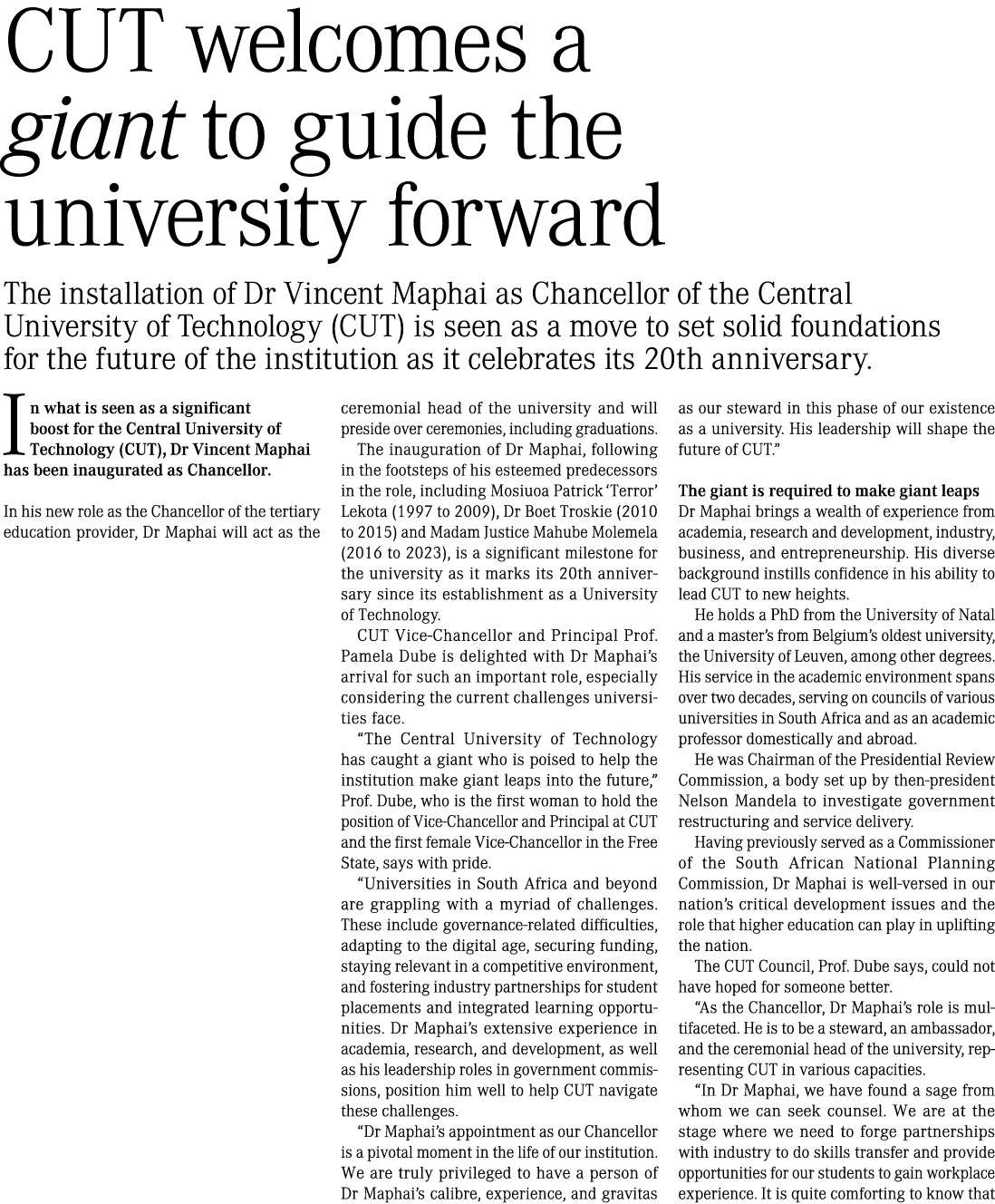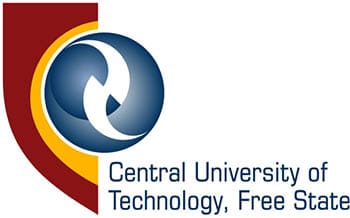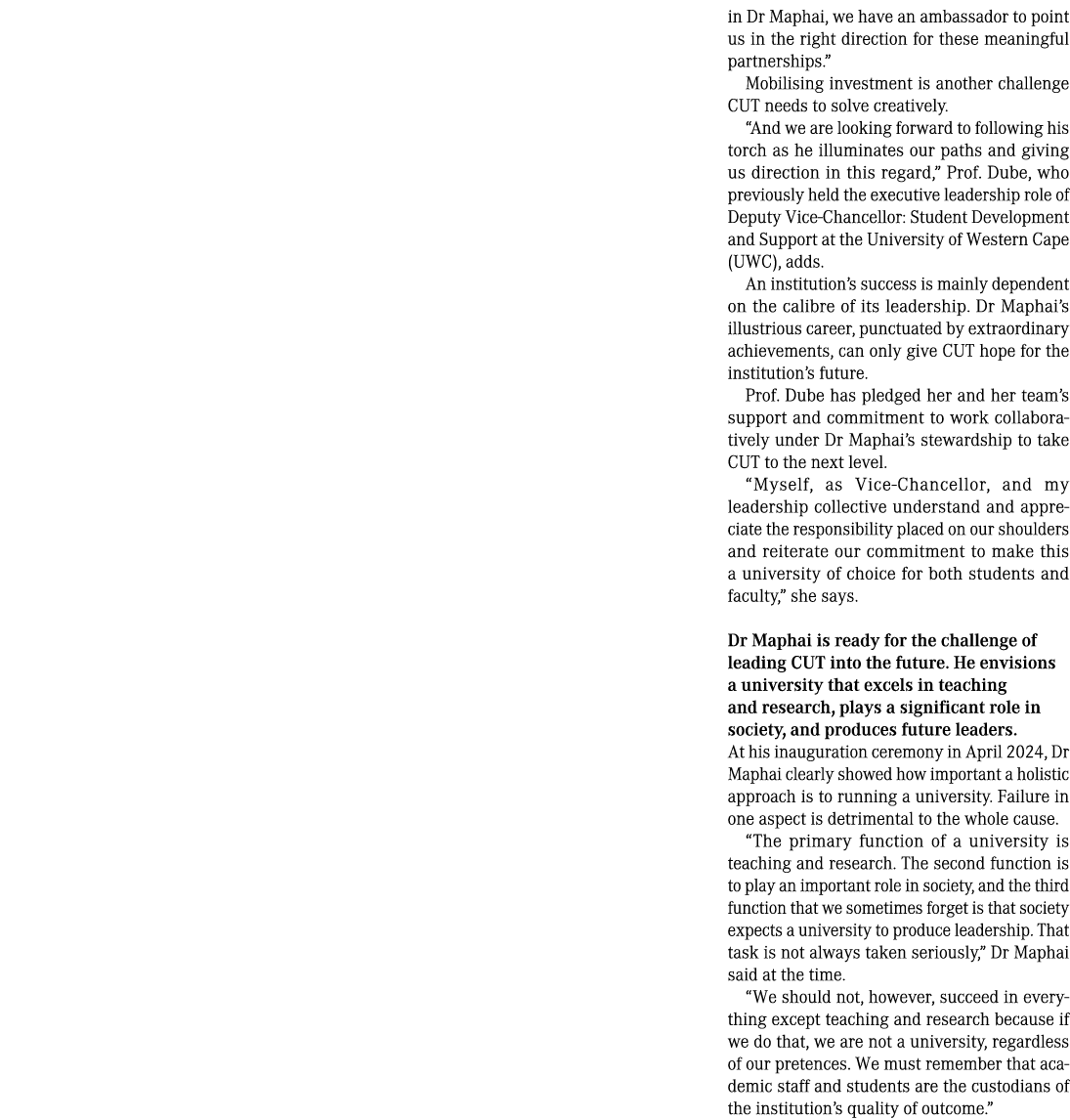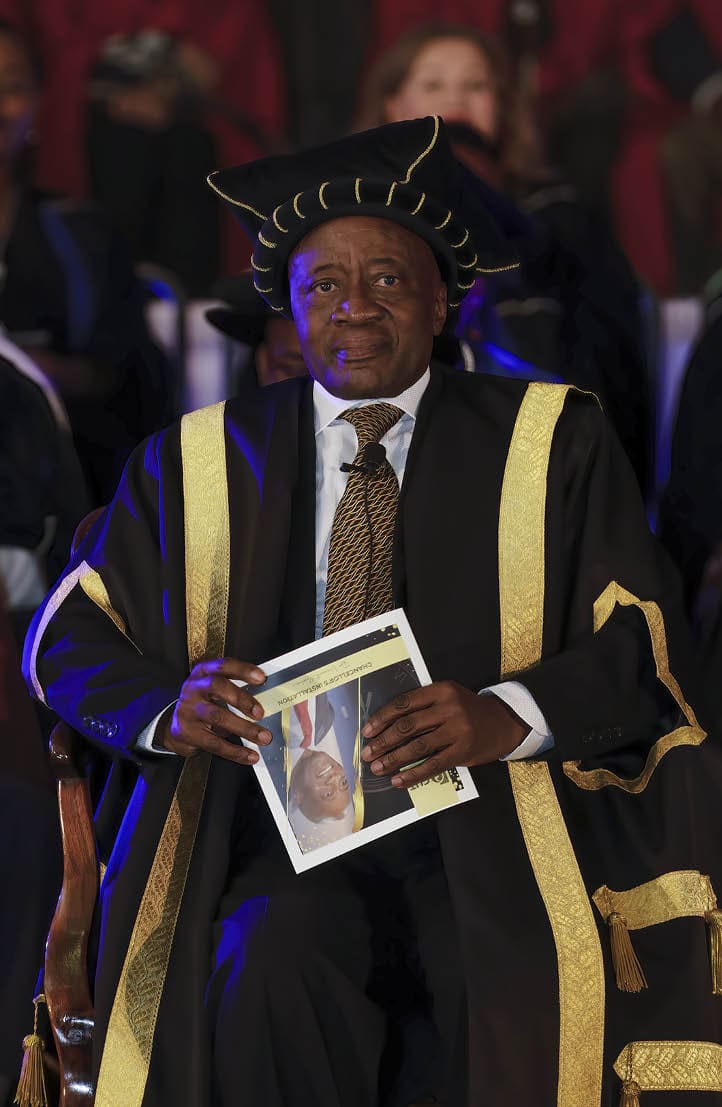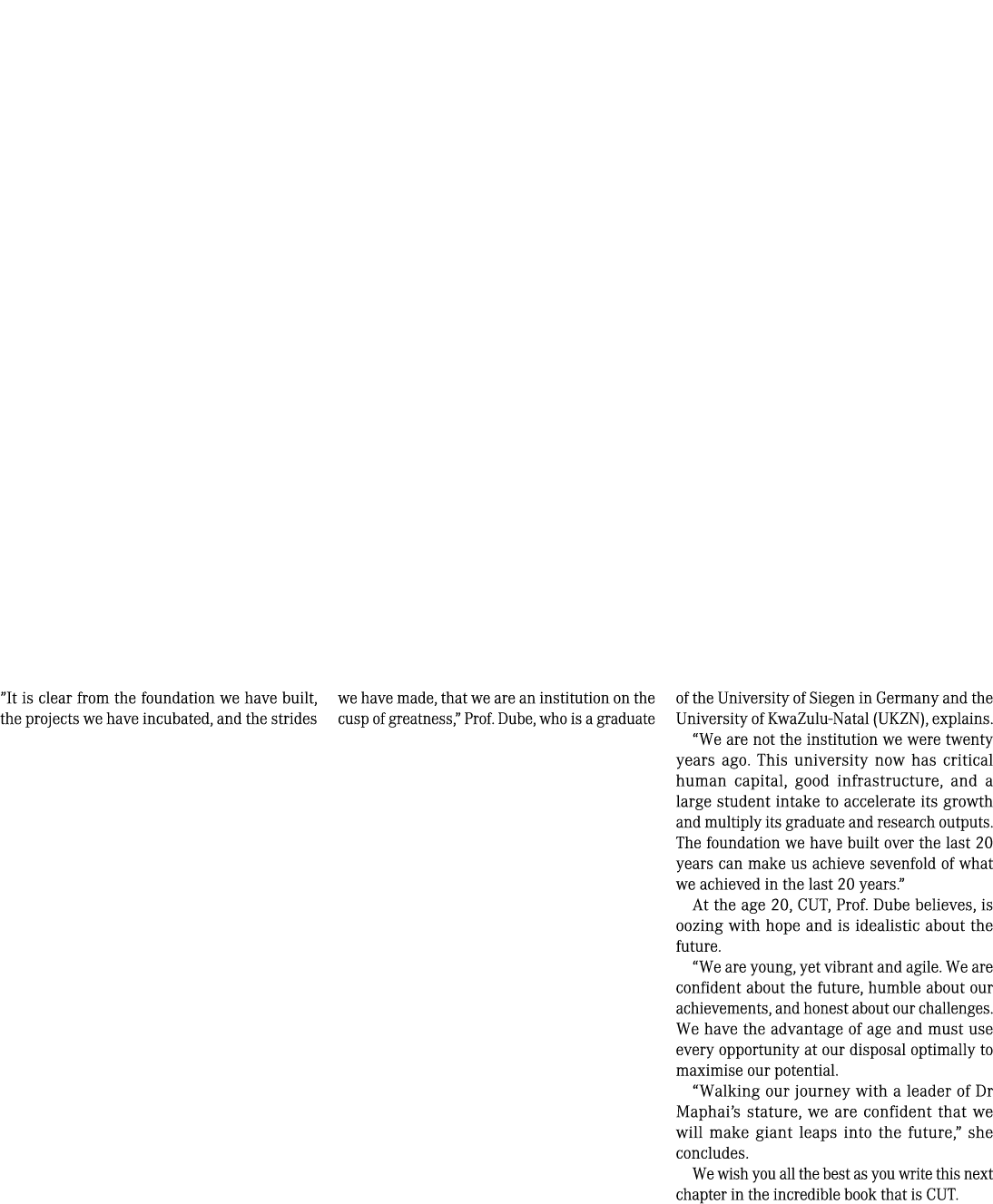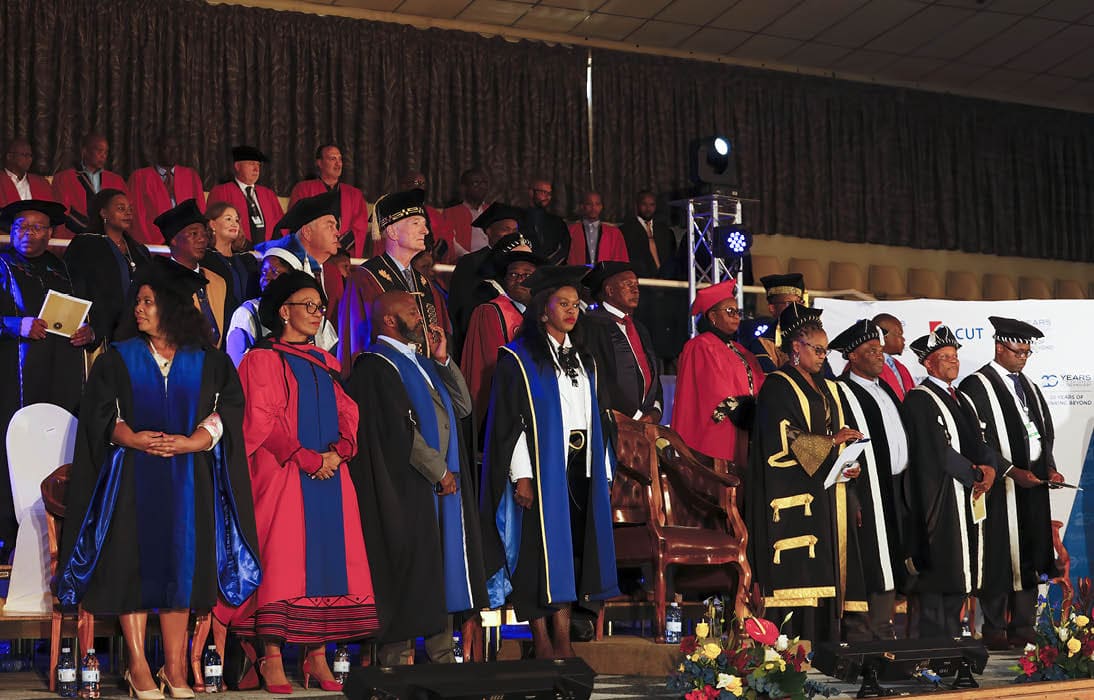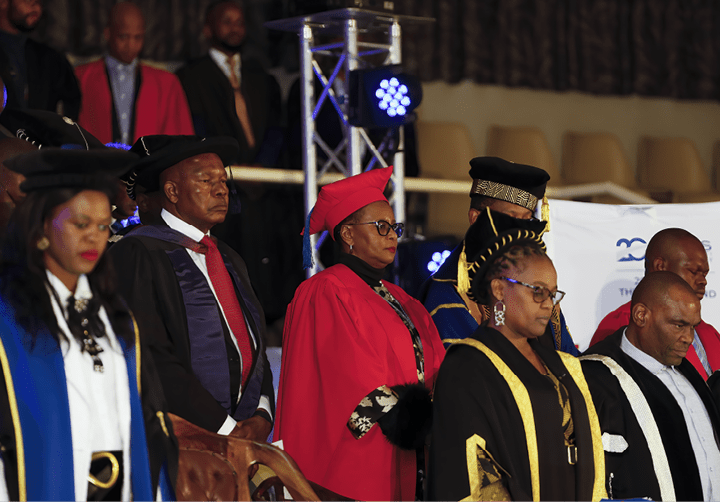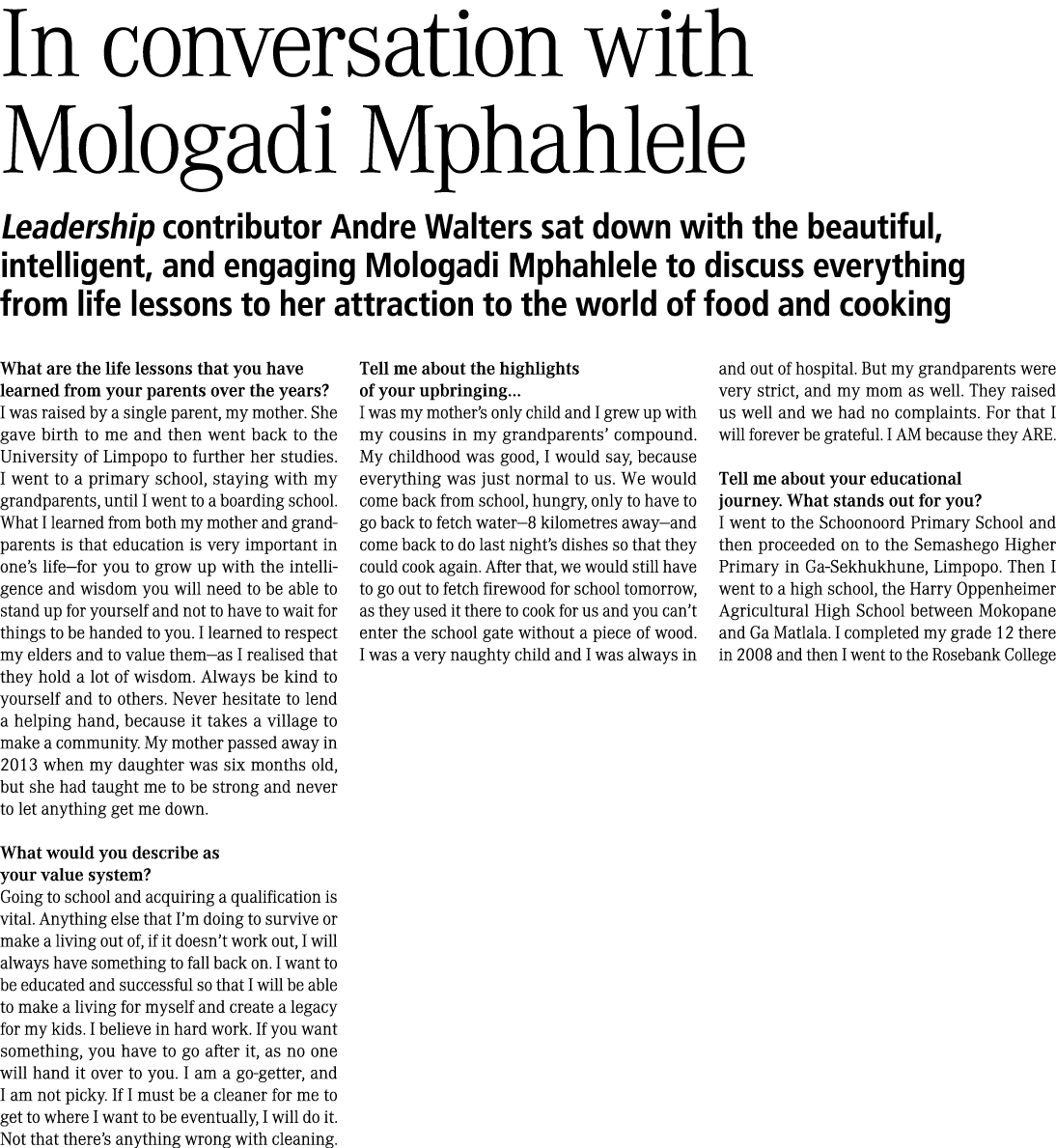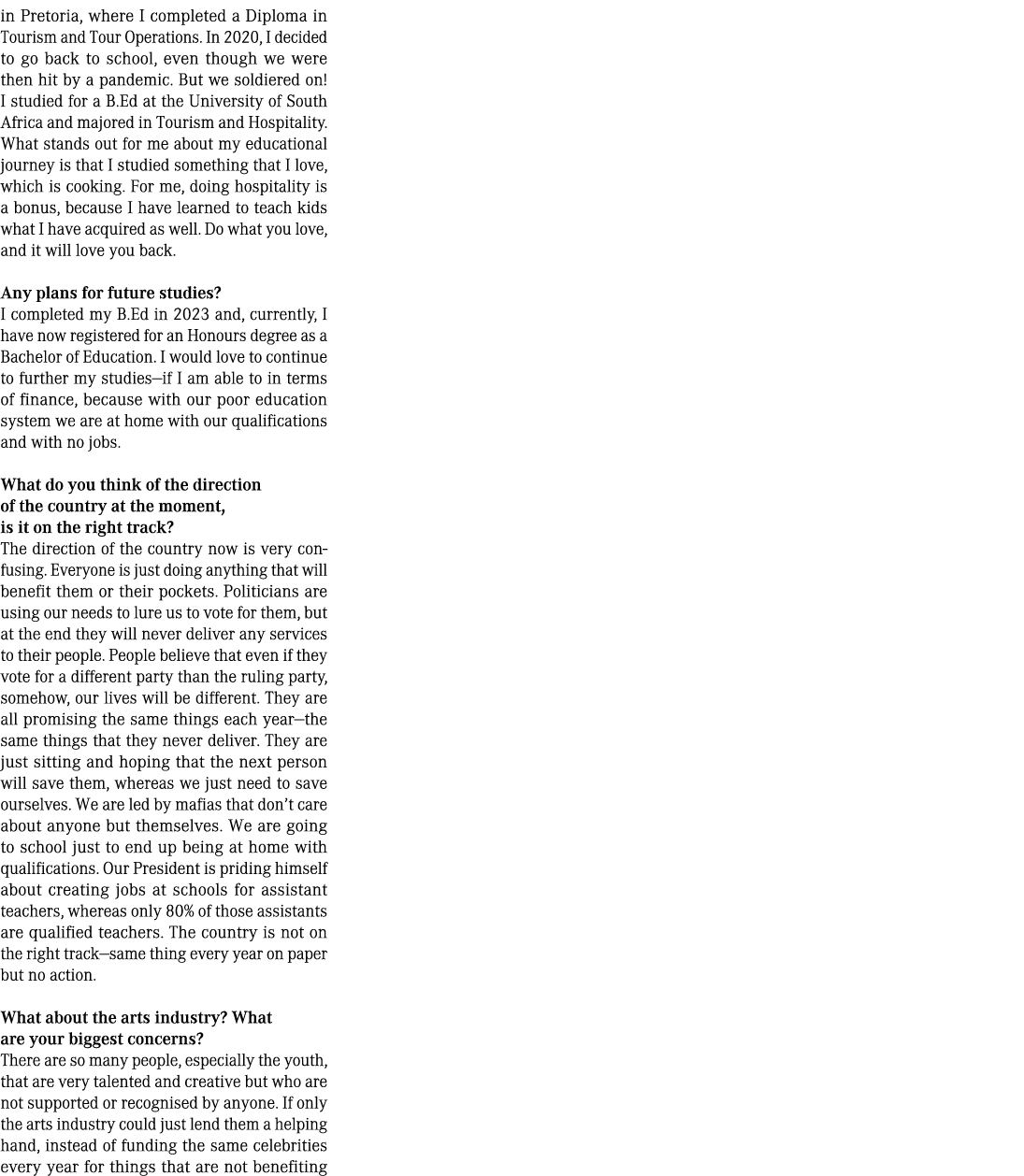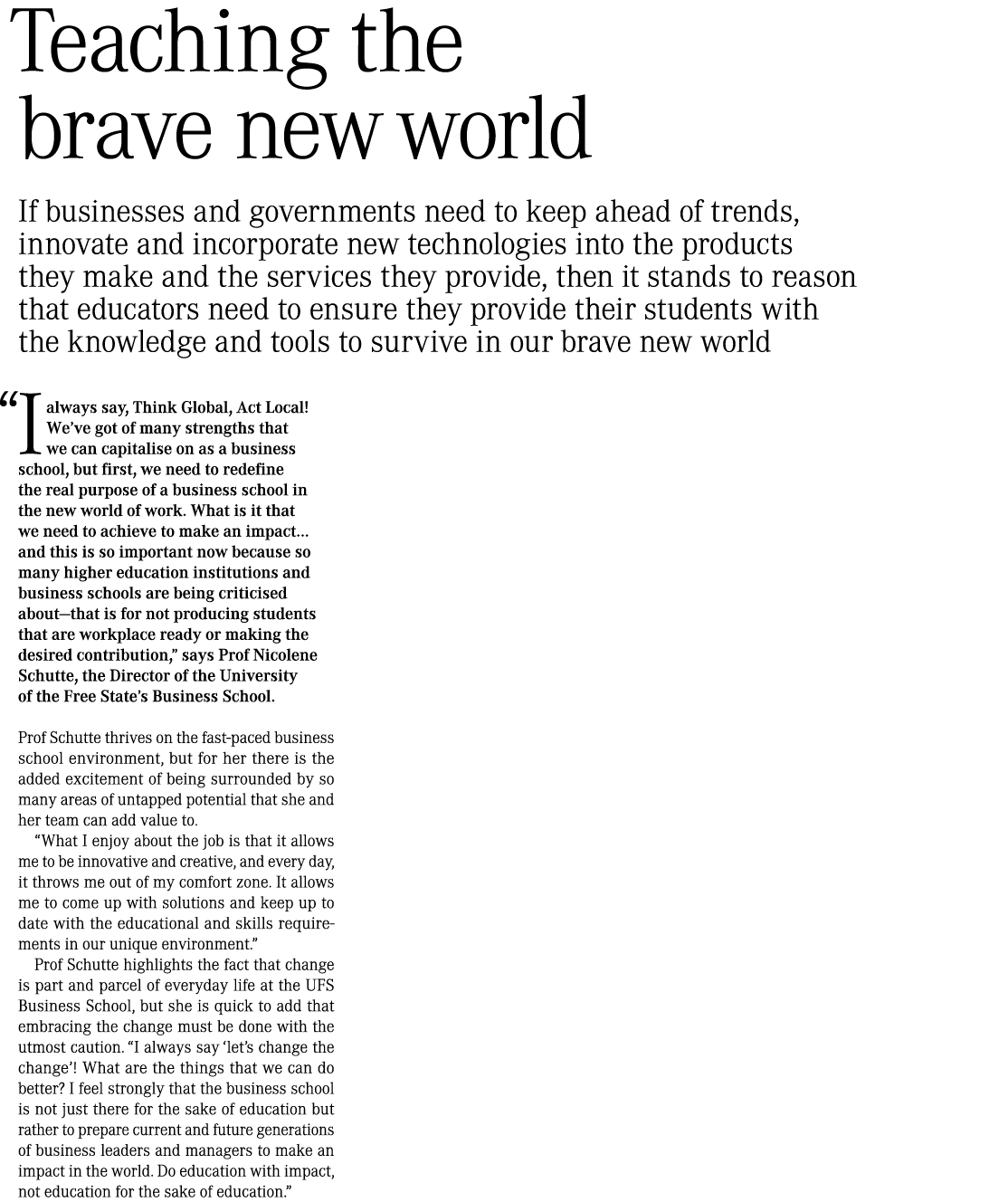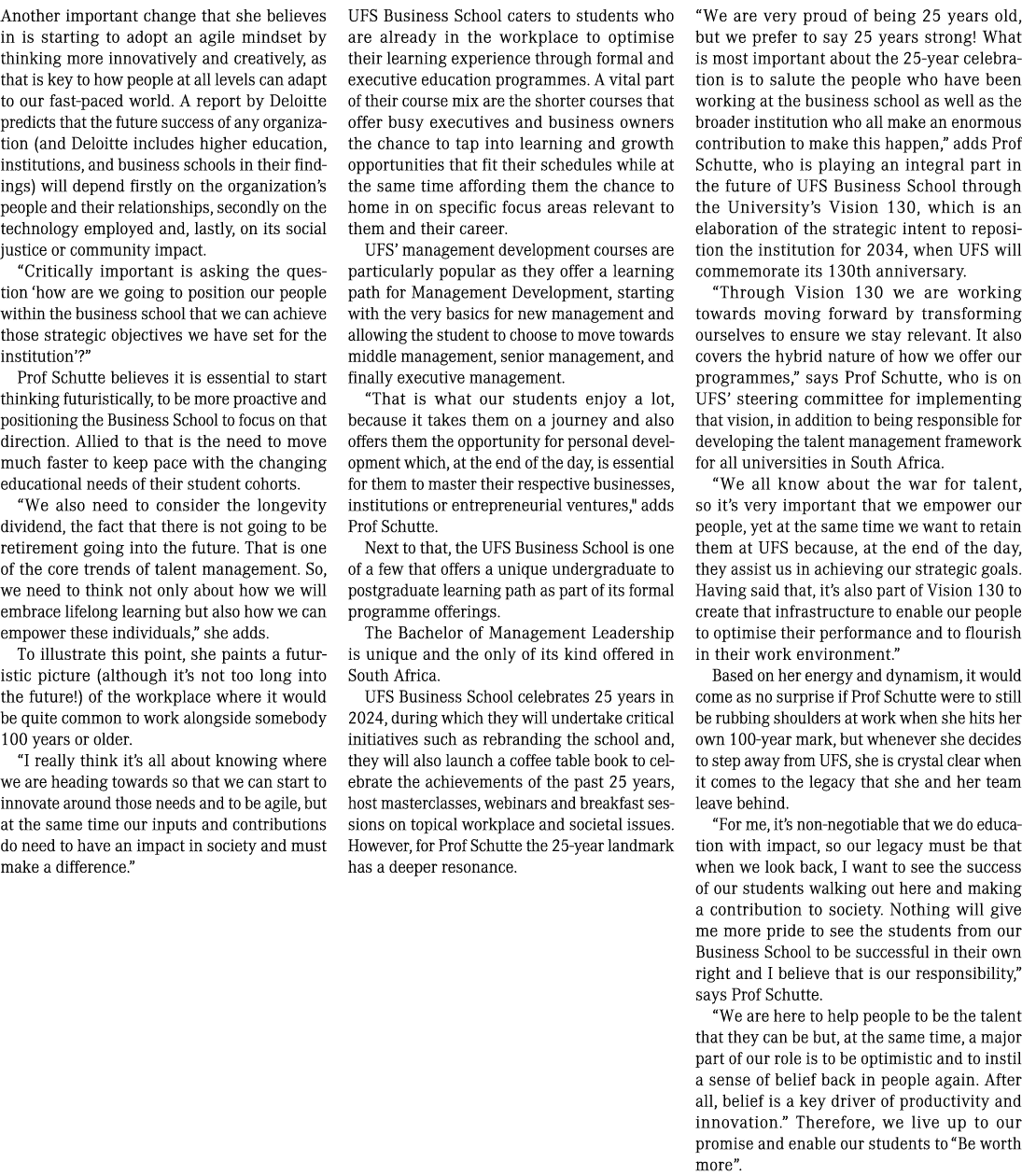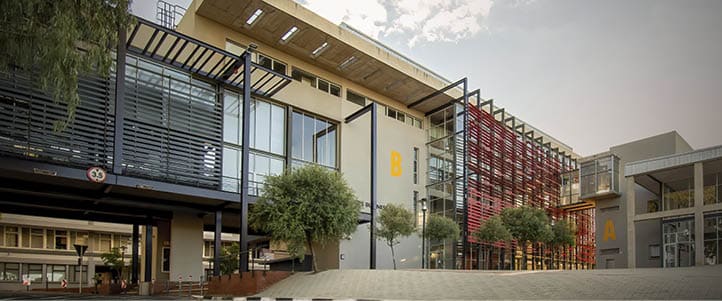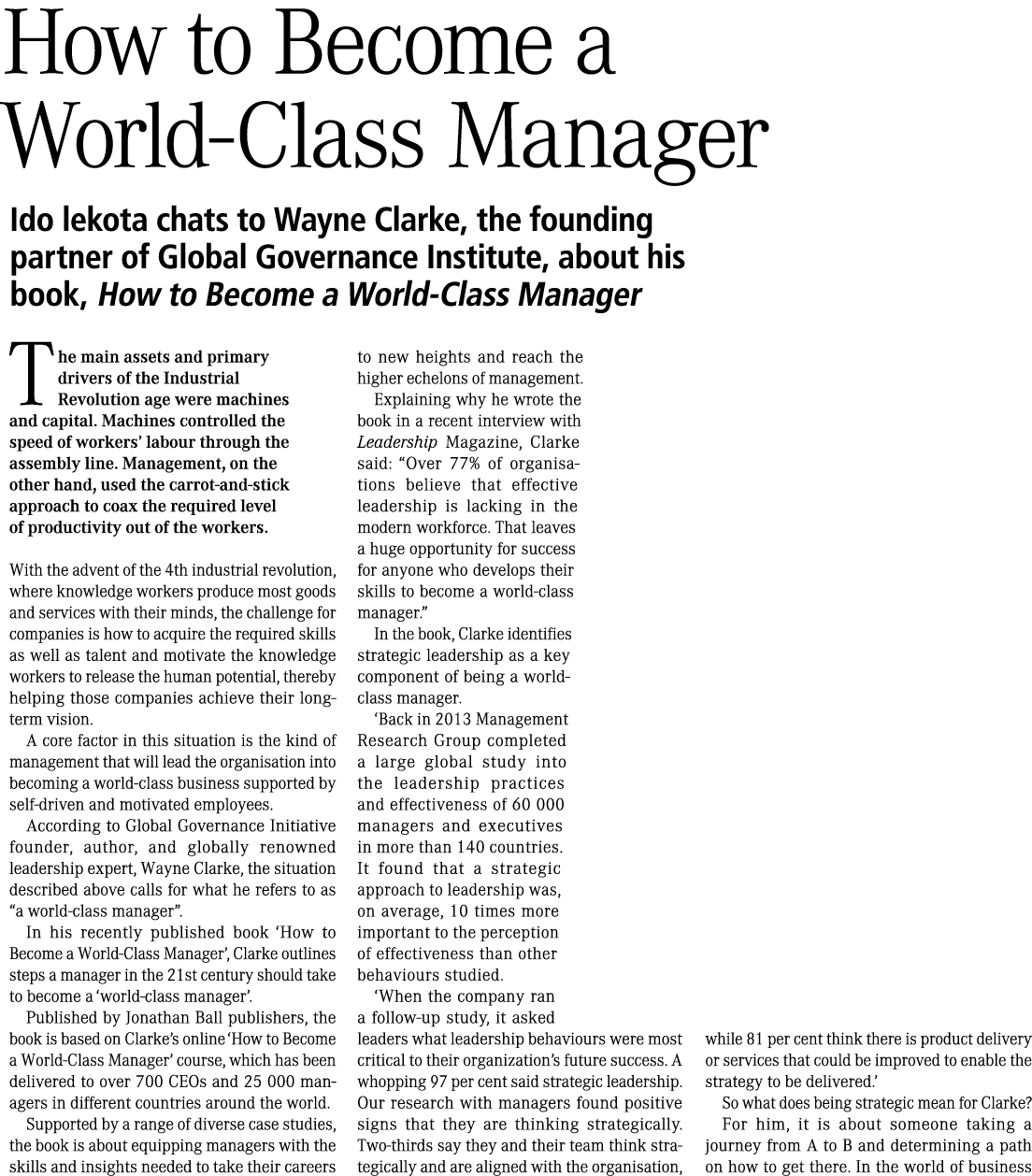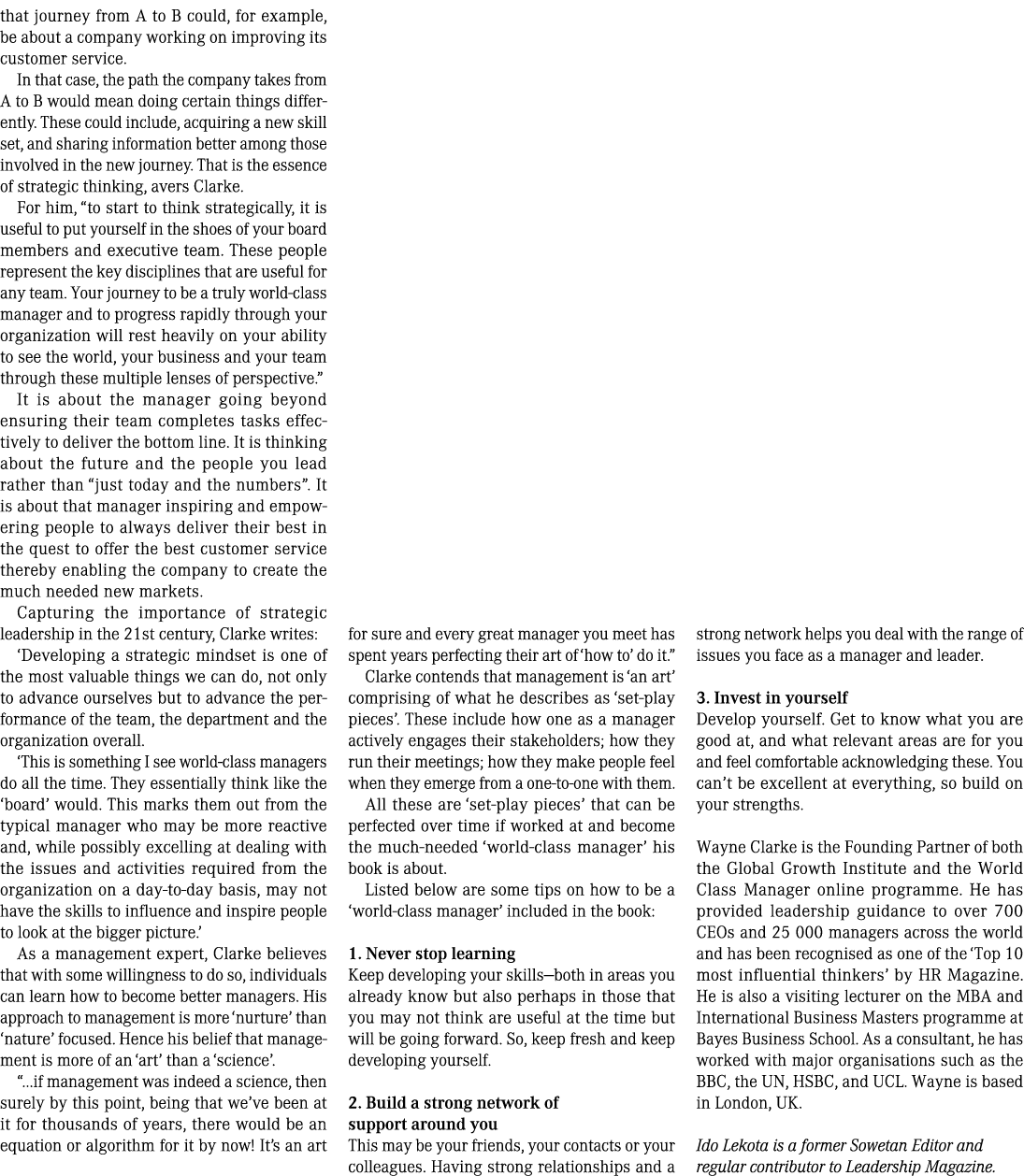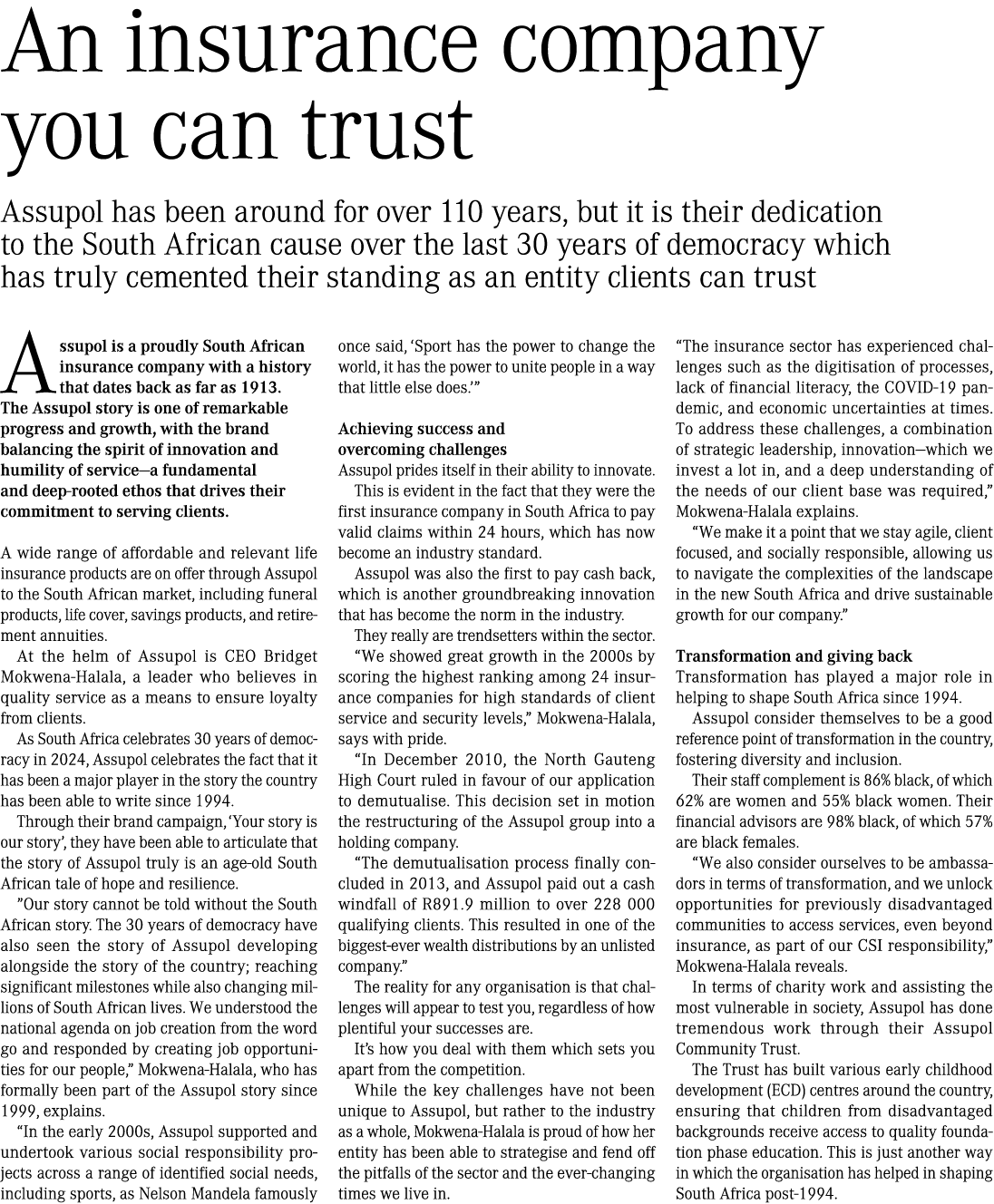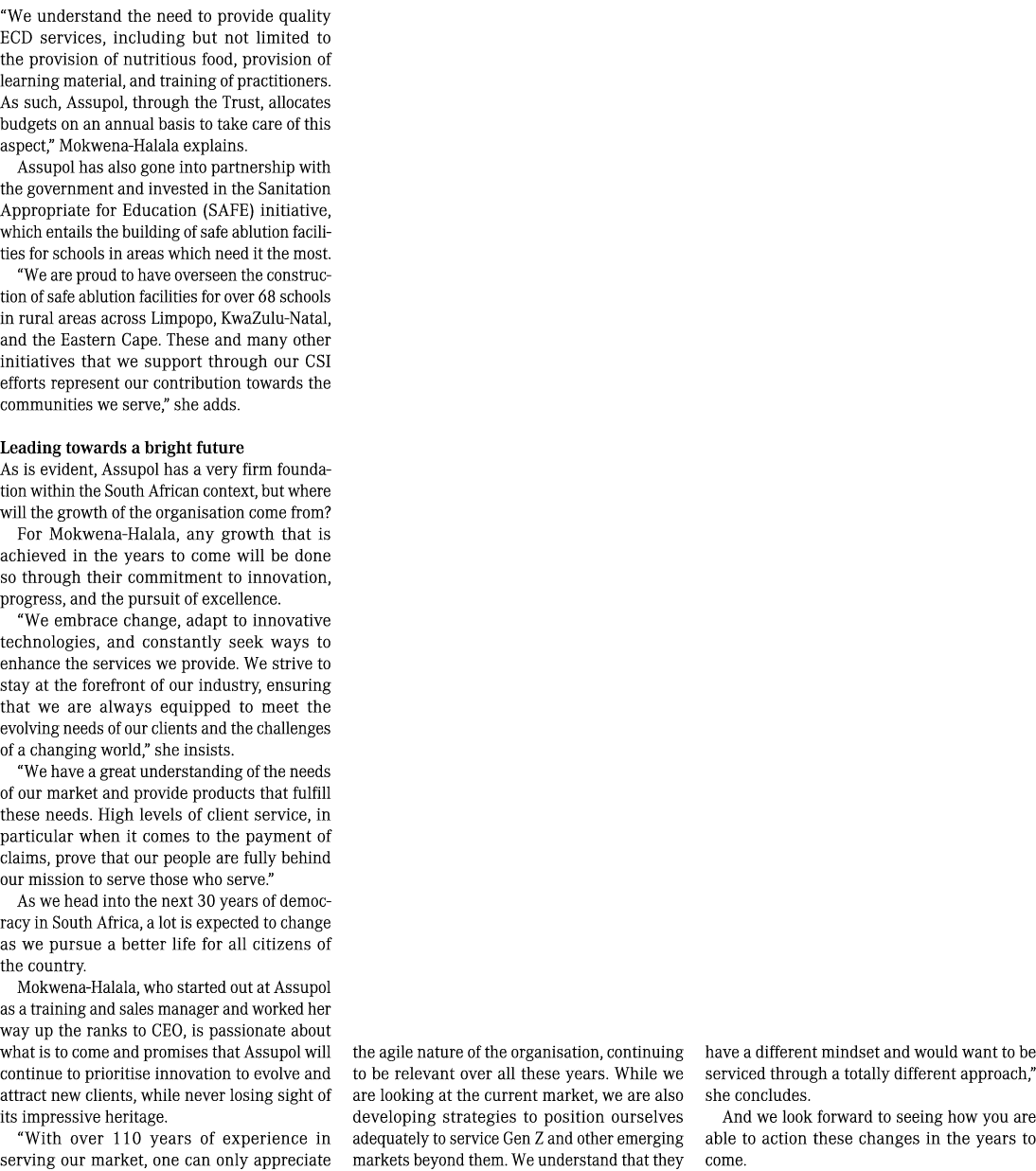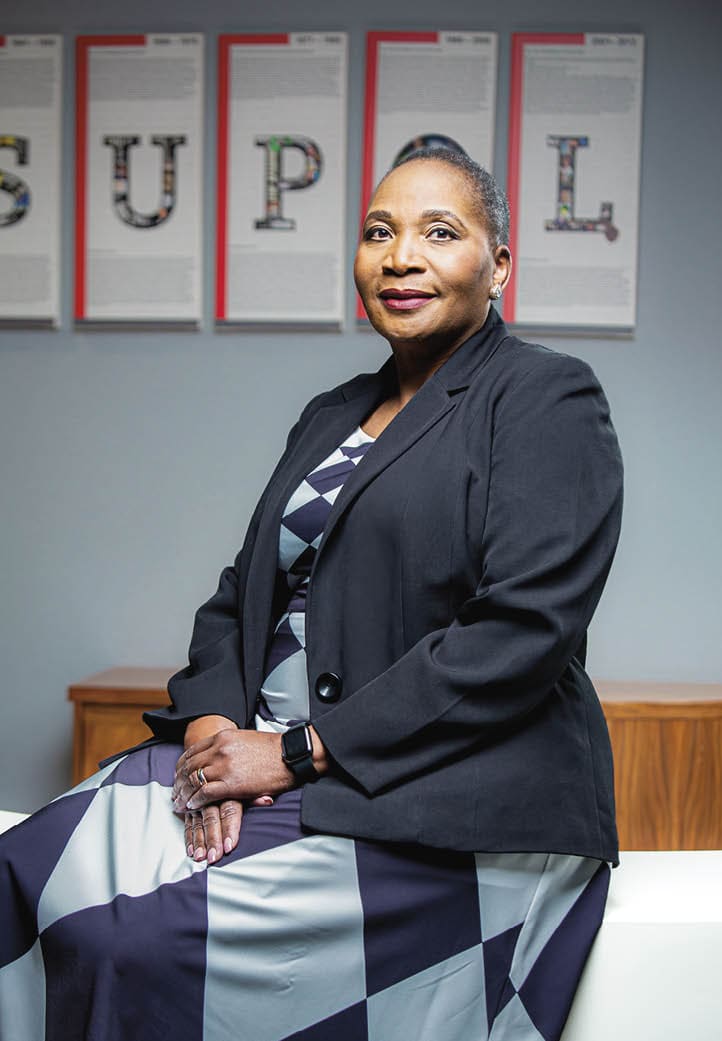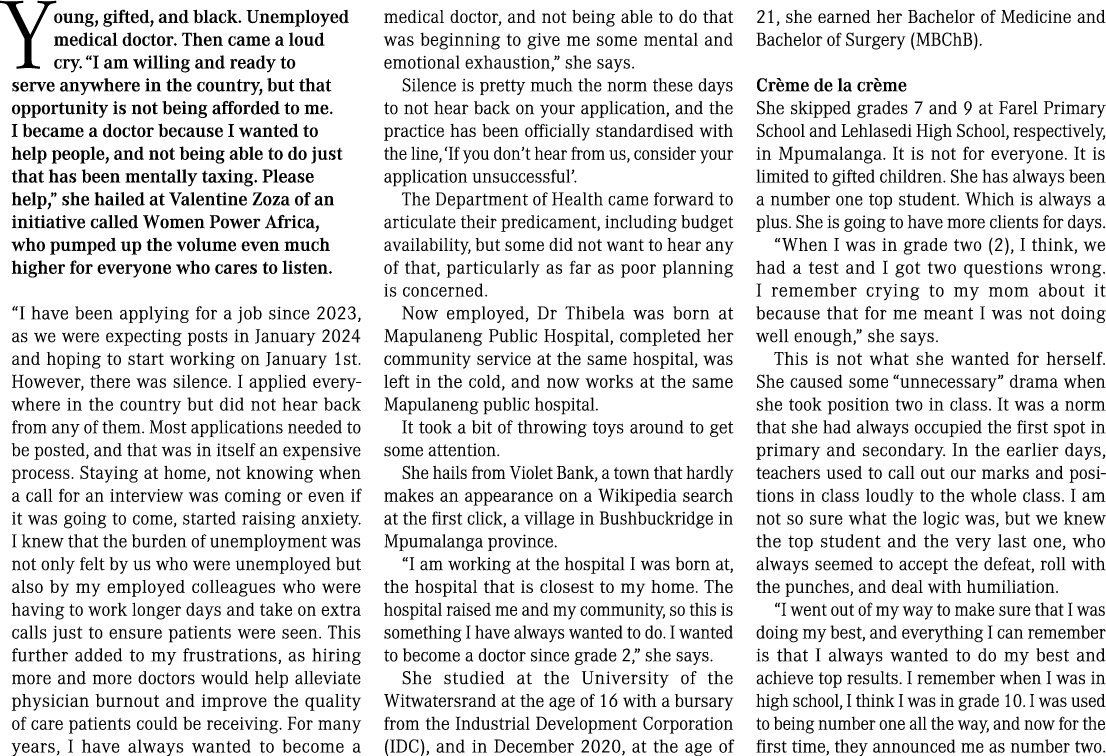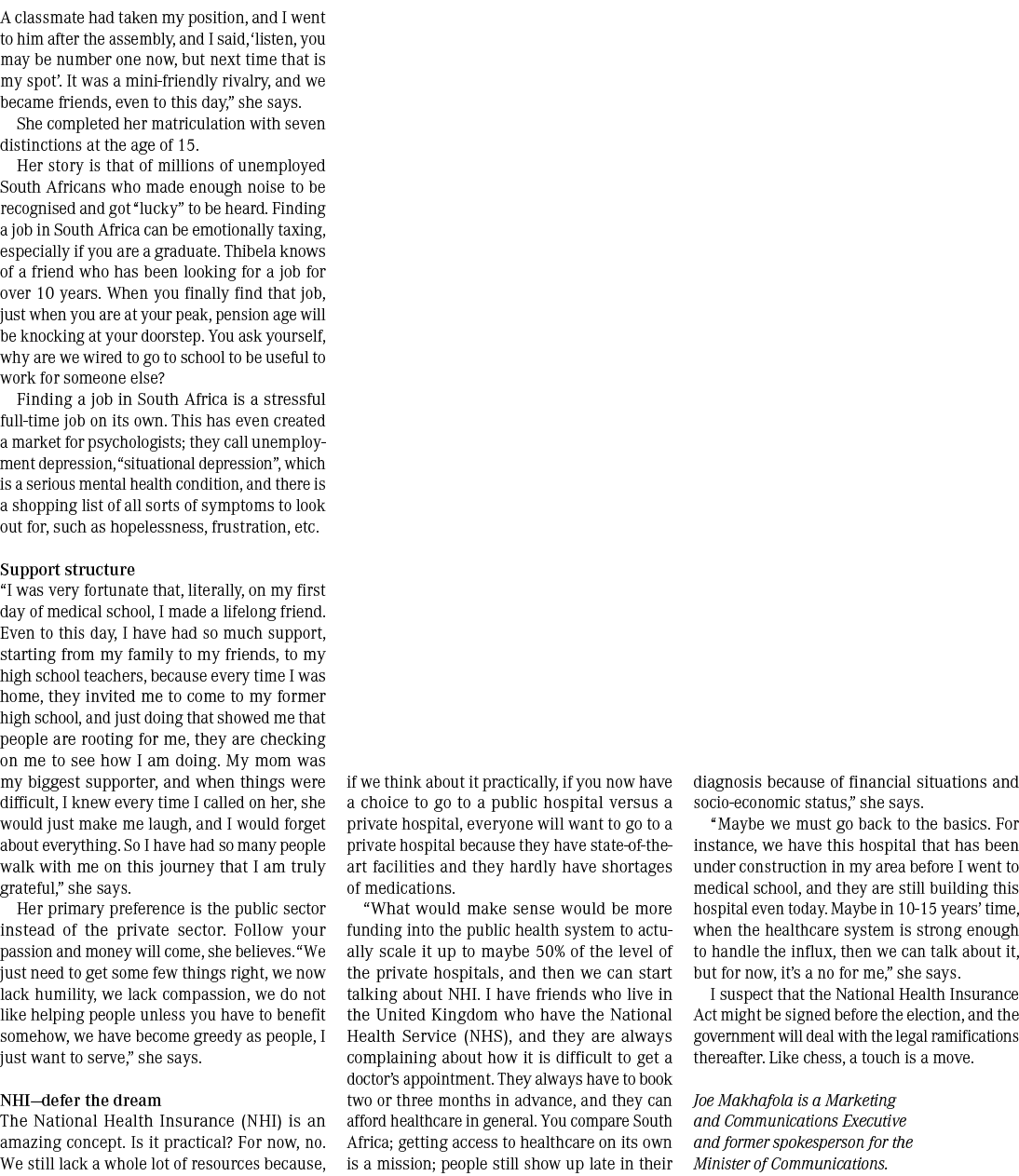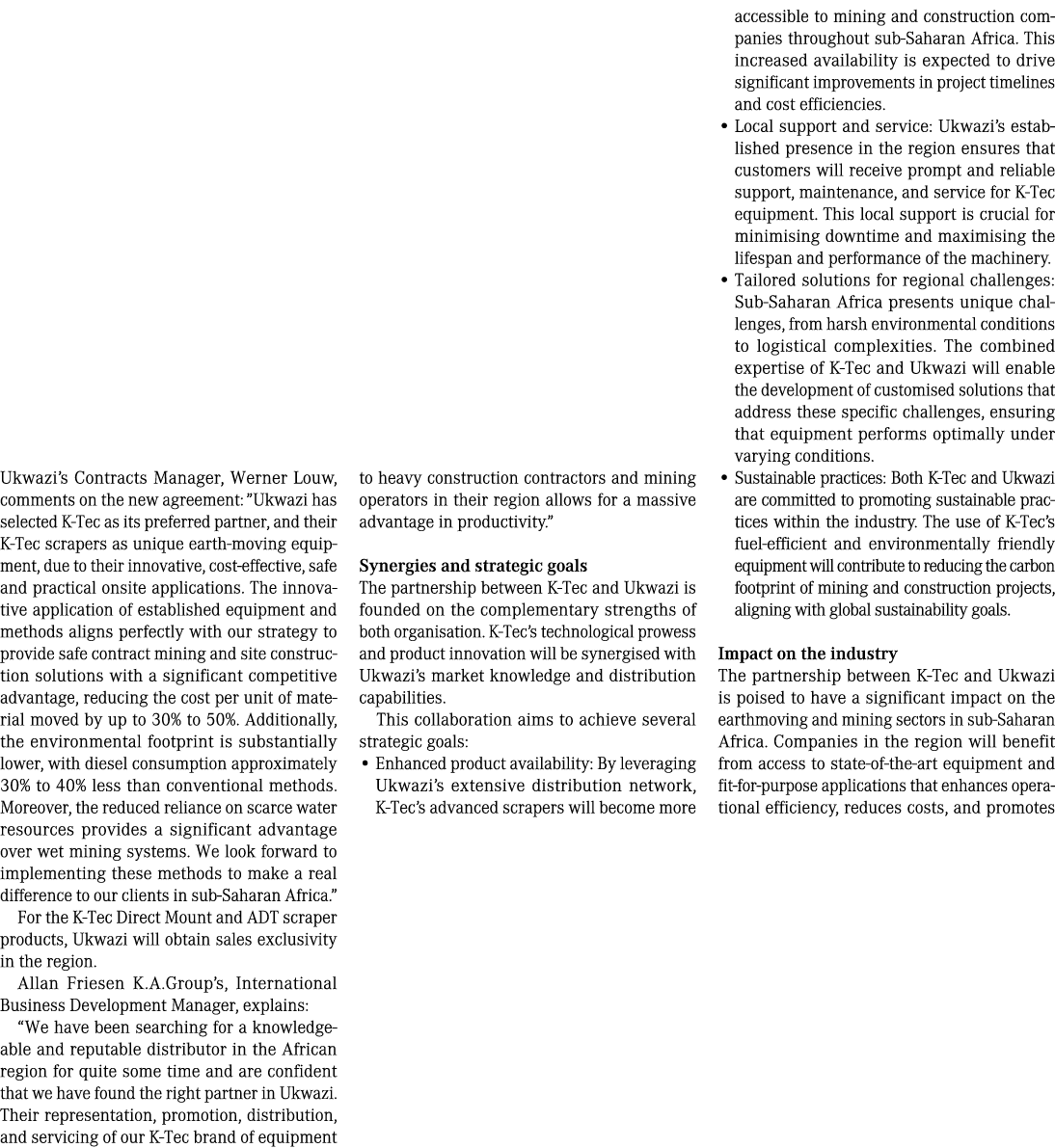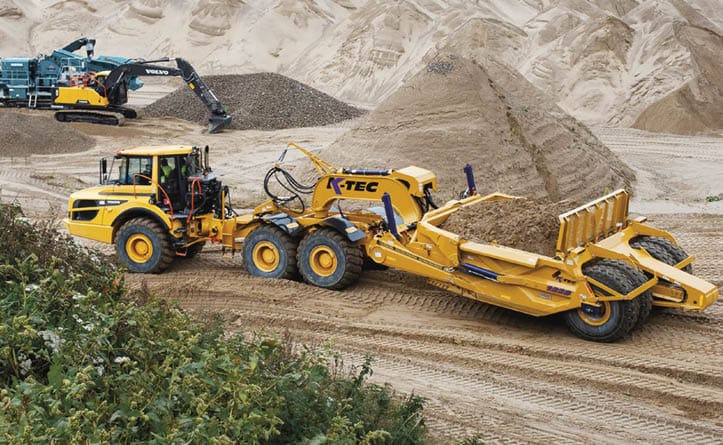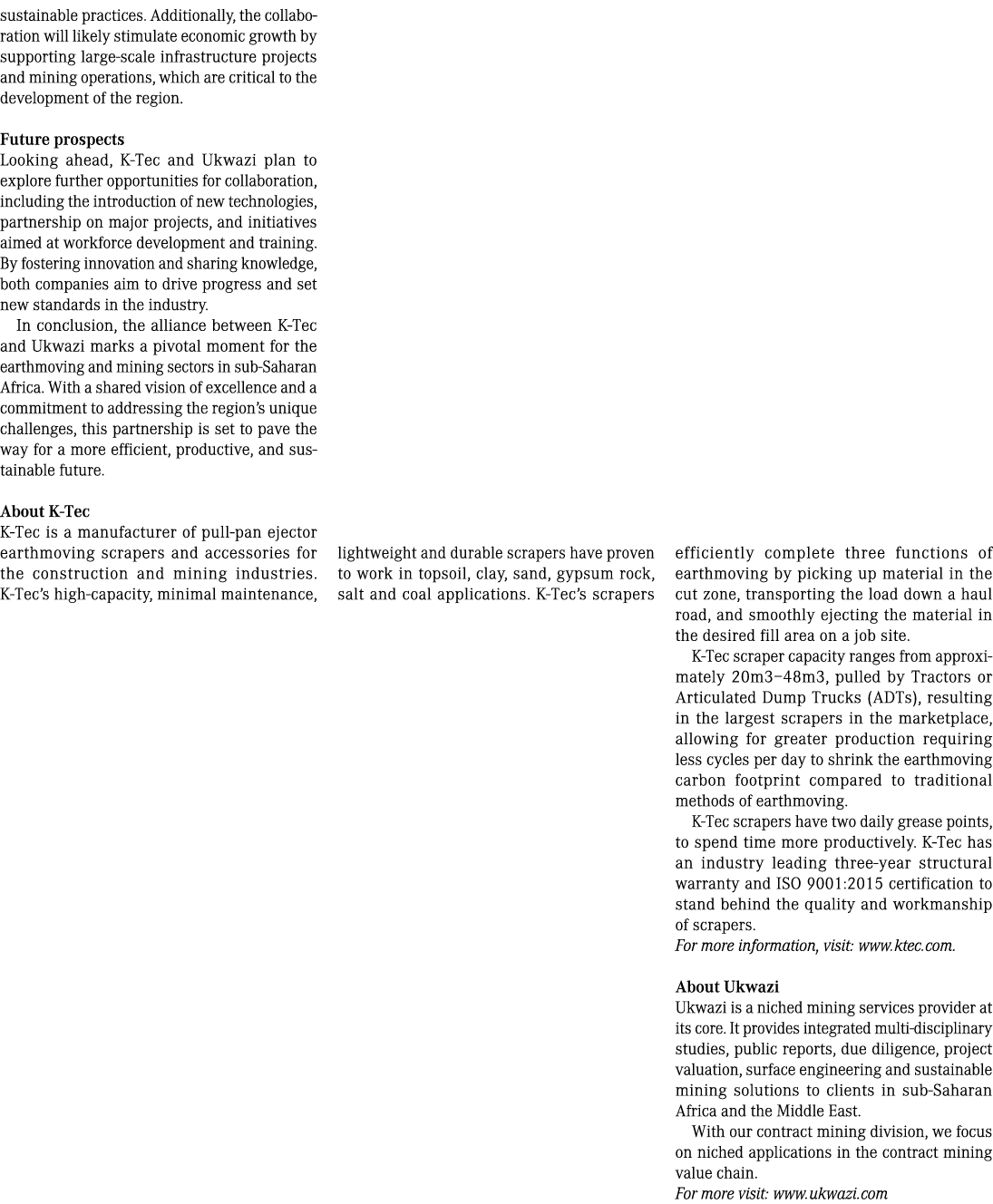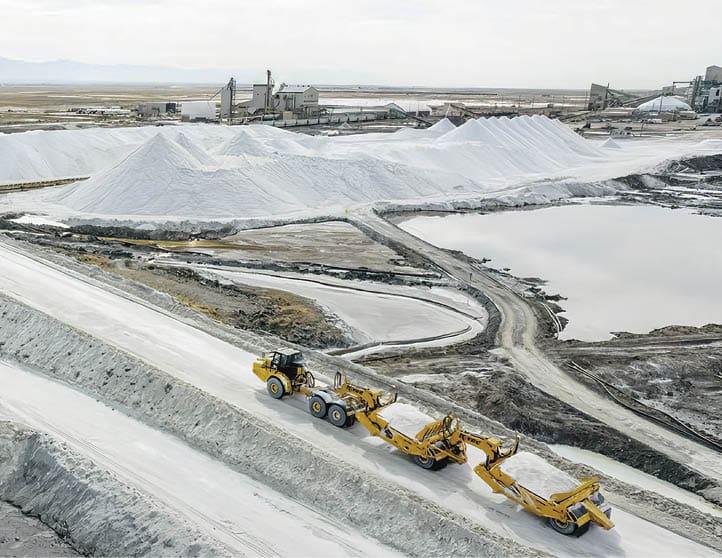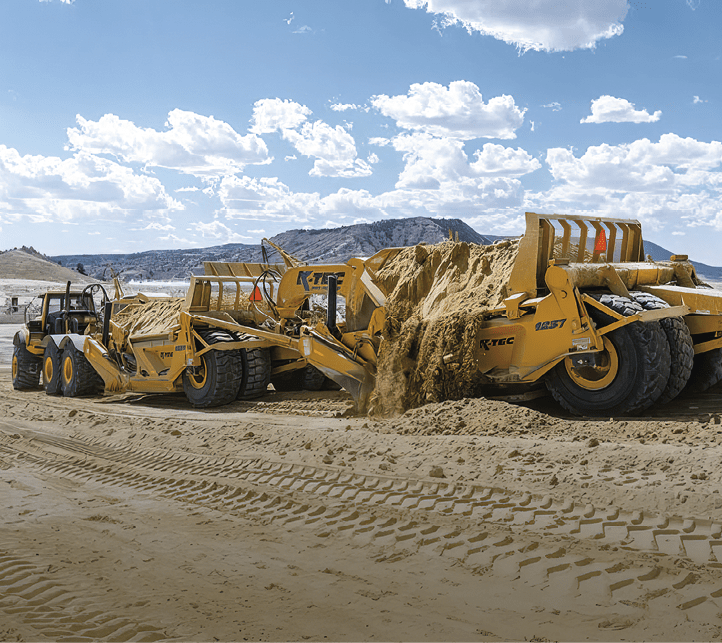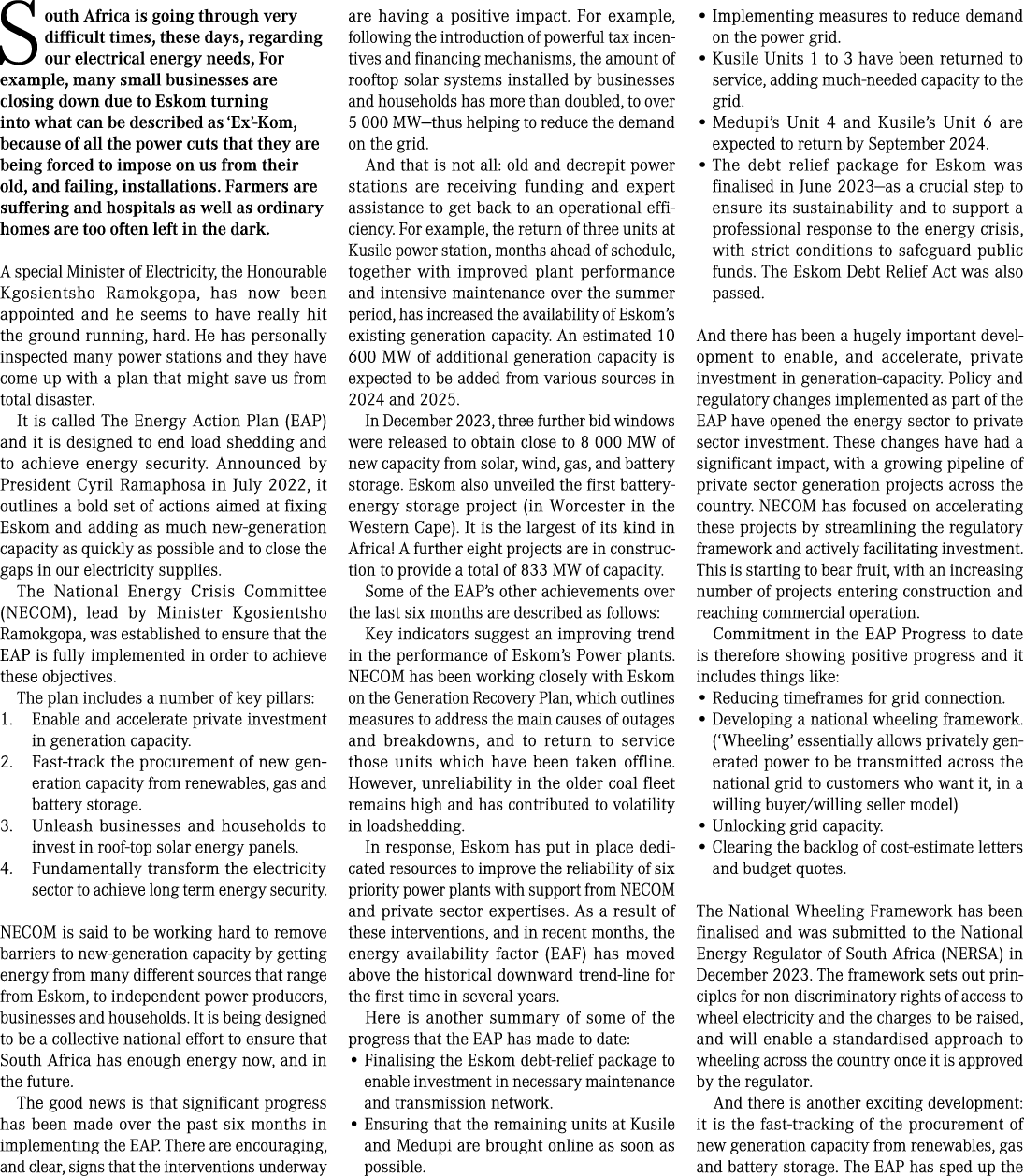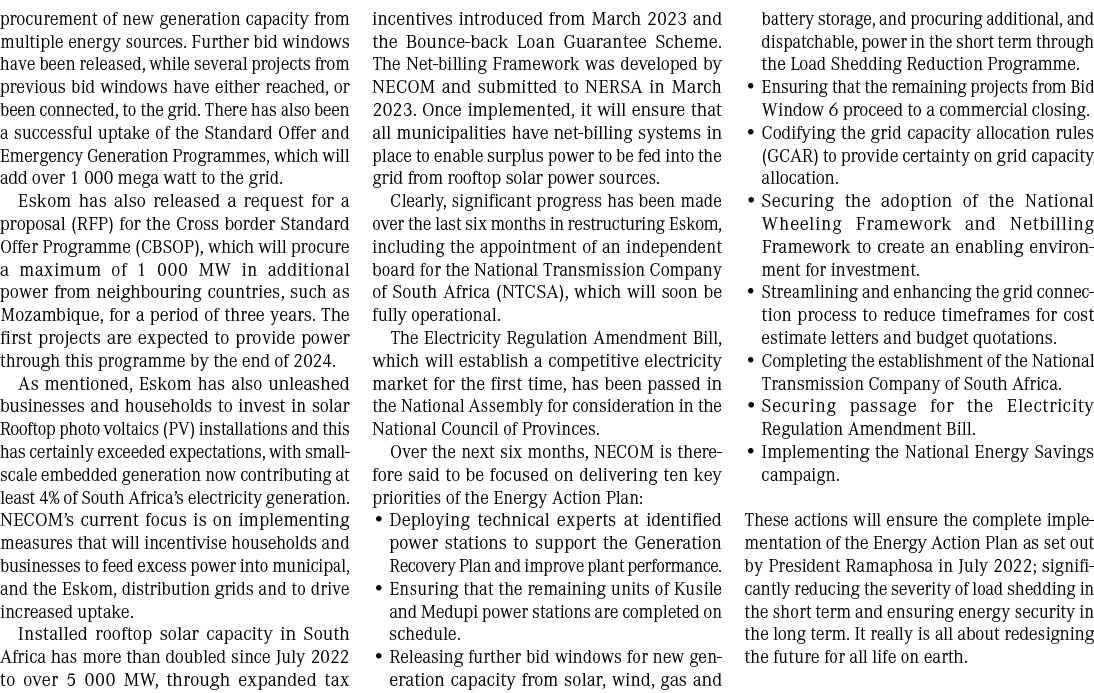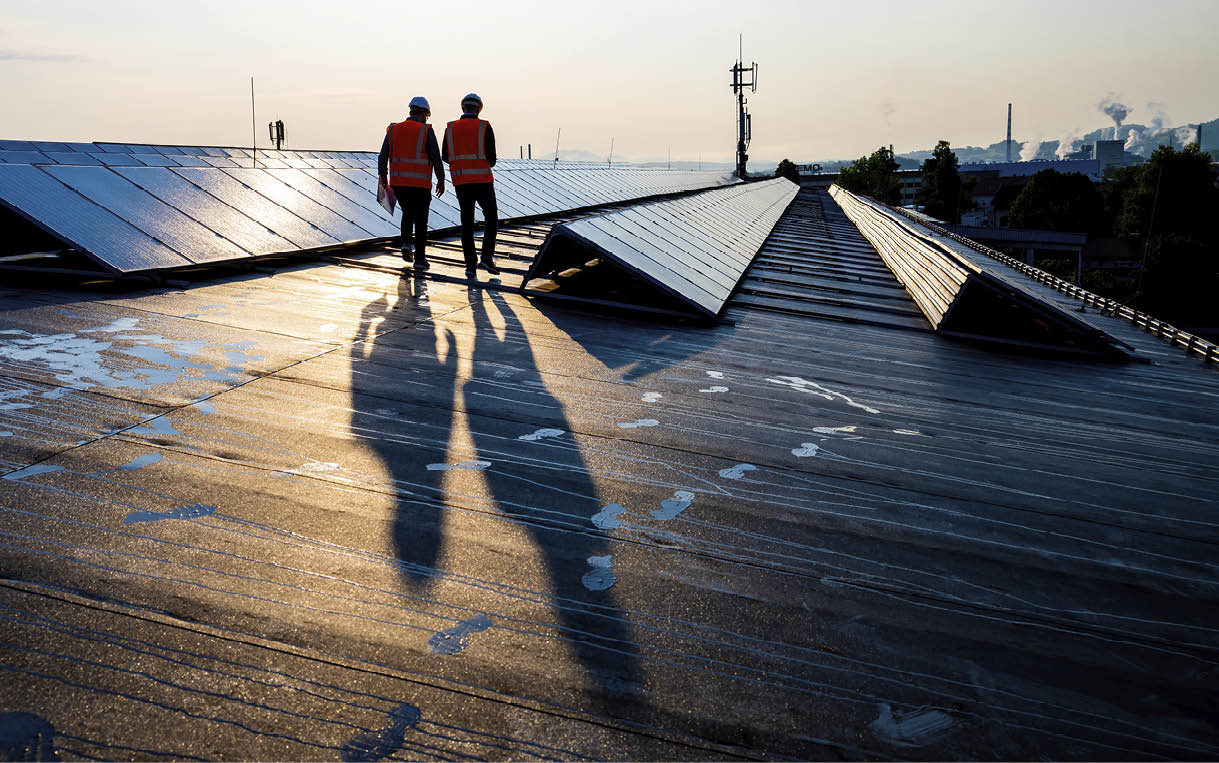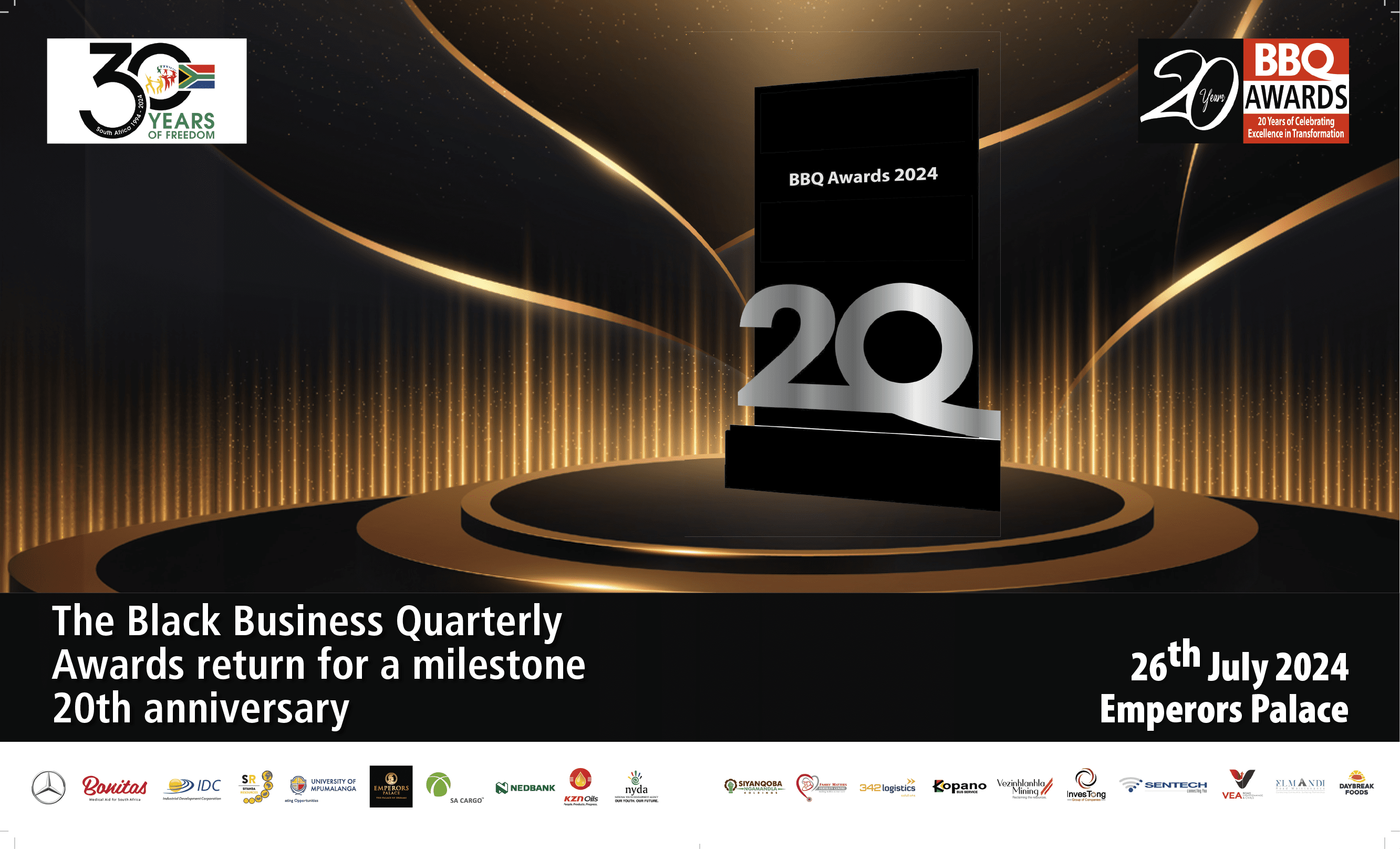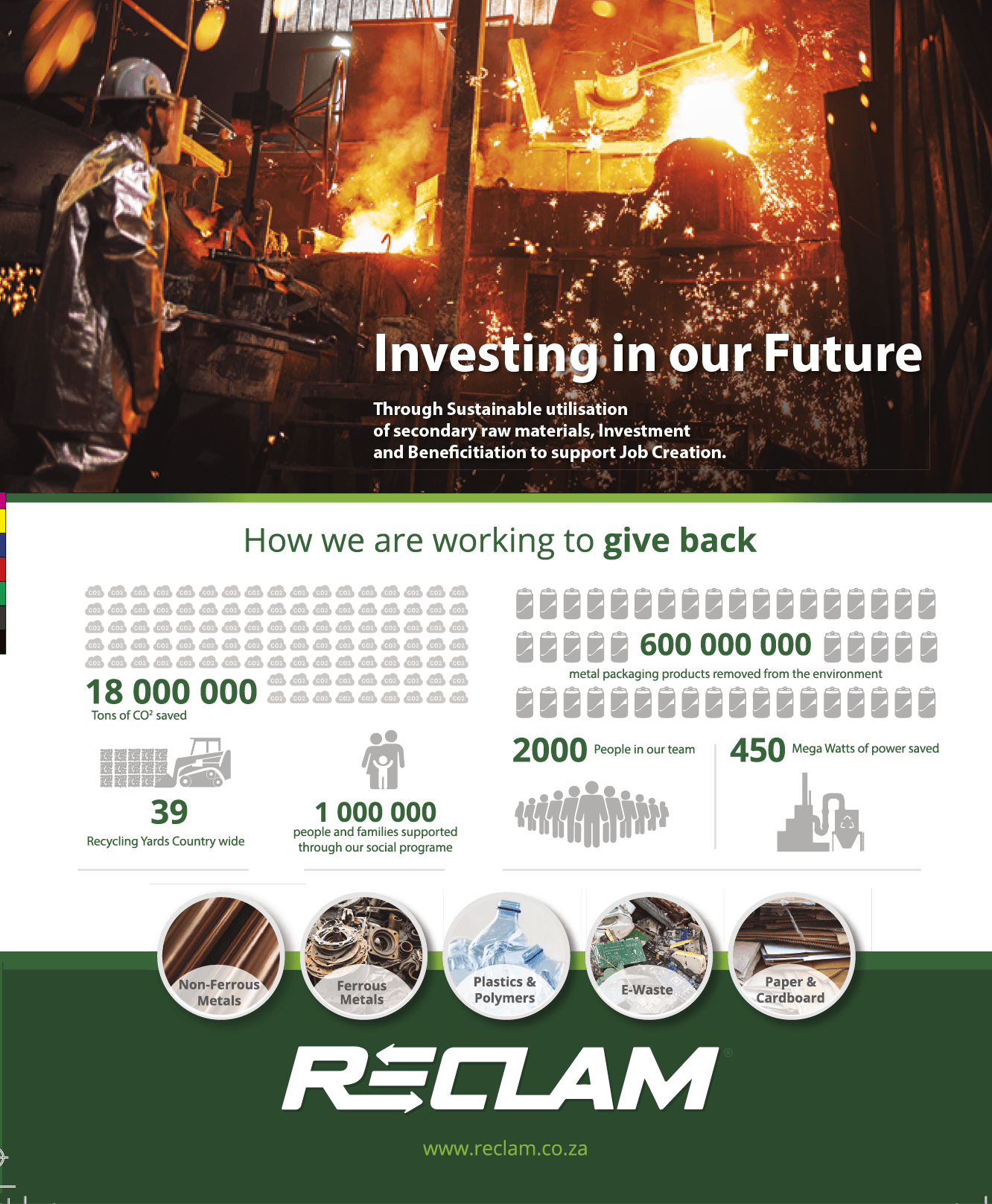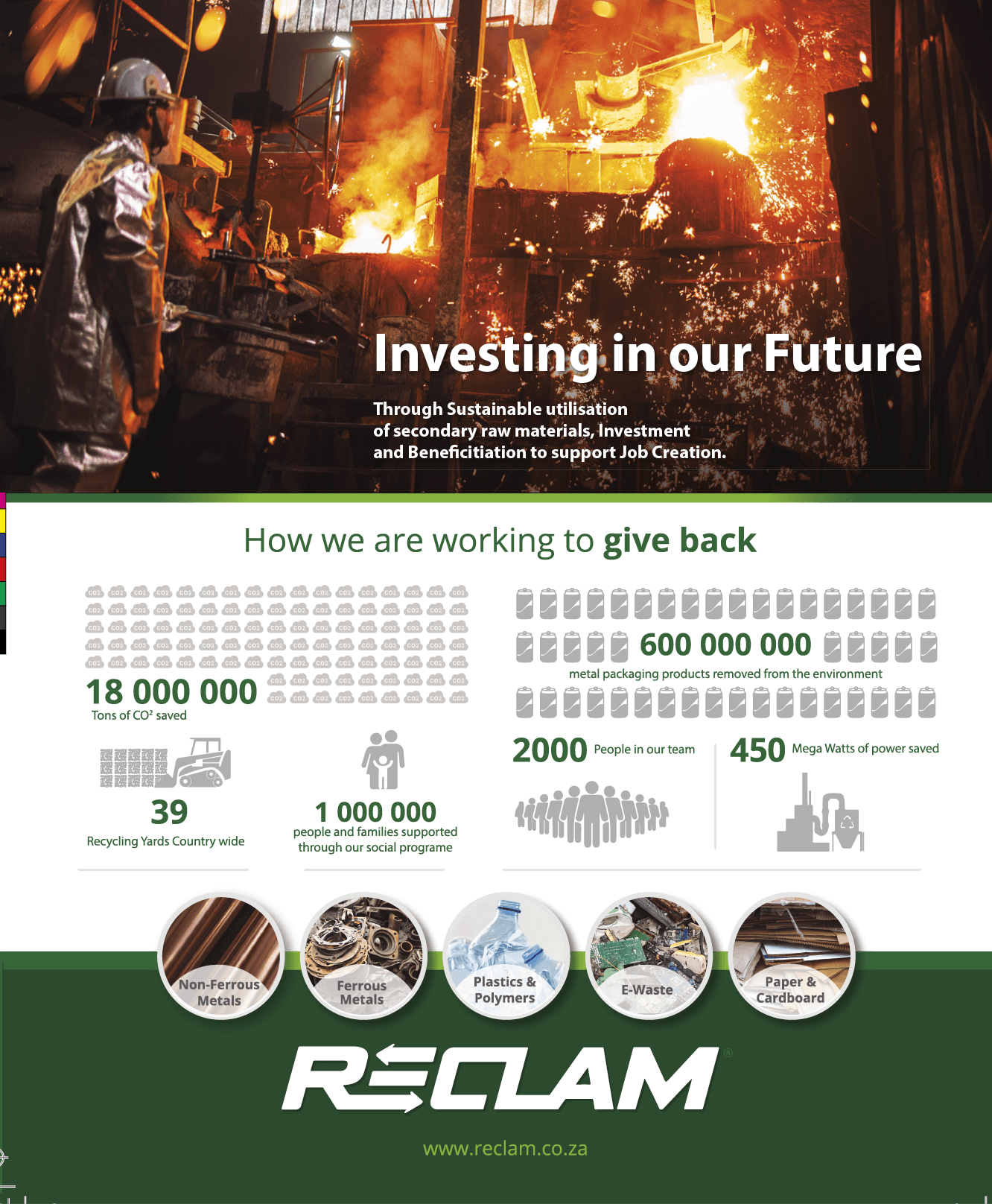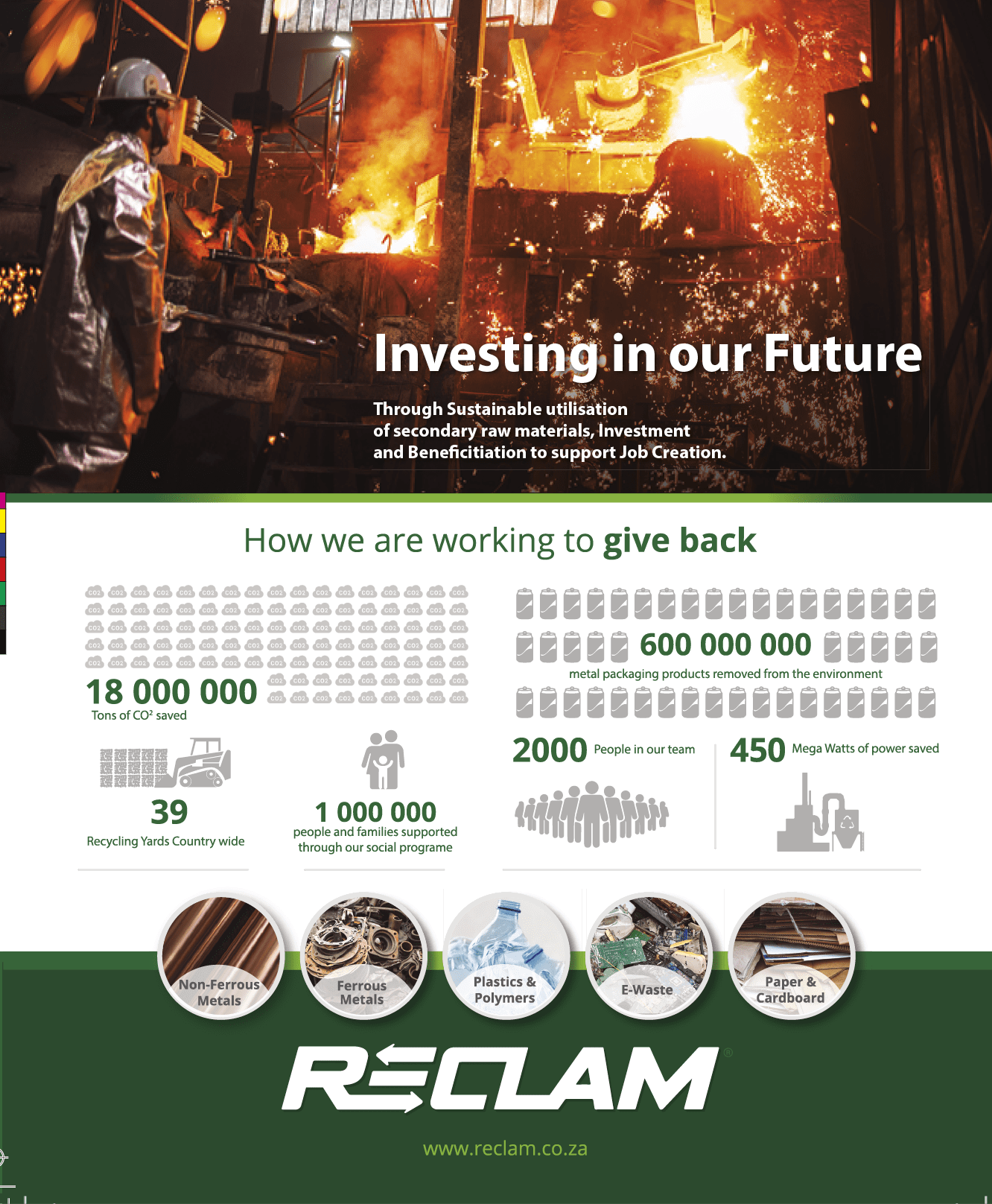Sustainability is core to CCBSA’s business strategy
Coca-Cola Beverages South Africa (CCBSA) is a proud industry leader in developing increasingly sustainable ways to manufacture, distribute and sell our products
CCBSA is a proudly South African company, a subsidiary of Coca-Cola Beverages Africa (CCBA) and a bottler for The Coca-Cola Company.
Our purpose is to refresh South Africa and make Africa a better place for all. As part of this, we are committed to developing sustainable ways to operate and to create shared value for our business, all our stakeholders, and the communities we serve.
We use our industry leadership to be part of the solution to achieve positive change in the world and to build a more sustainable future for the planet.
Our aim is to create greater shared opportunity for the business and the communities we serve across our value-chain. Opportunity is more than just money, it’s about a better future for people and communities everywhere in South Africa. Our focus is on our employees and shareholders, our linked communities, women and youth, and customers, for a better shared future.
We are committed to building economic inclusion and sustainability solutions that benefit all our stakeholders.
We focus on the highest-priority sustainability issues facing our company, stakeholders and communities, with the goal of maximizing collective impact.
As part of one of the world’s largest and most recognised companies, we have an opportunity to use our size and scale to help address global challenges. While we strive to make progress on our own, we are committed to fostering partnerships that drive collective impact in areas including water stewardship, packaging circularity, climate action and many more.
Water Stewardship and CCBSA’s strategic vision
Water is a priority for the Coca-Cola system because it is essential to life, our beverages and the communities we serve. It is also critical to public health, food security, biodiversity and the climate crisis. The world is experiencing increased water insecurity, which is evident through water scarcity, with demands for safe, usable water exceeding supply in certain areas.
The Coca-Cola Company’s 2030 Water Security Strategy focuses on increasing water security by investing in water initiatives that benefit nature and communities.
Our strategy is focused on accelerating the actions needed to increase water security where we operate, source ingredients and touch people’s lives. We do that by contributing toward sustainable, clean water access that improves livelihoods and wellbeing while protecting against water-related disasters.
These actions include projects that provide benefits to local watersheds that supply water for drinking, agriculture and manufacturing, restore and conserve habitats for plants and animals, and offer opportunities for local economic development. As part of our commitment to restoring watersheds, we conduct regular river and waterway clean-ups, and also have intensive operations to clear invasive alien vegetation from key watershed areas such as Limpopo’s Waterberg region.
As part of the Coca-Cola system, we have set three key goals designed to achieve this vision:
- • Achieve 100% regenerative water use across our facilities in areas identified as facing high levels of water stress by 2030
- • Improve the health of watersheds identified as most critical for our operations and agricultural supply chain by 2030
- • Continue to return water to nature and communities. Ensuring the health of watersheds is a major part of this.
Our efforts to ensure water security have seen us partner with key stakeholders, including Government and communities.
For example, we successfully implemented Project Lungisa in Grabouw in the Western Cape, where the local Theewaterskloof Municipality was losing a significant amount of its potable water due to leaks and failing infrastructure. Through this partnership, we trained young community members in plumbing to support the rehabilitation of water infrastructure, including fixing leaks in informal areas.
In parts of the Eastern Cape, as well as other water-stressed regions in South Africa, we have rolled out Coke Villes, our innovative solar-powered groundwater harvesting and treatment systems able to supply clean and safe water to communities in need. In late 2023, we installed a R12 million groundwater harvesting Coke Ville project, to supply the entire town of Graaff Reinet in the drought-stricken Eastern Cape with potable water.
A World Without Waste Vision 2030
We recognise our responsibility to help solve complex plastic waste challenges facing our planet and society. That’s why, in 2018, Coca-Cola launched an ambitious strategy called World Without Waste to drive systemic change through a circular economy for our packaging.
World Without Waste is Coca-Cola’s global sustainable packaging platform focused on measurable and interconnected goals, each of which are supported by additional targets.
As CCBSA, we seek to drive a circular economy for our packaging because this helps to reduce waste and carbon emissions. We are working to use more recycled content in our packaging, to expand our use of returnable bottles, and to collect packaging for recycling as part of our World Without Waste initiative.
As a system, we have the following global goals:
- • Help collect a bottle or can for every one we sell by 2030
- • Focus on making all our packaging 100% recyclable by 2025
- • Have 50% recycled content in our packaging by 2030
- • and make 25% of our packaging reusable (returnable) by 2030
We have already expanded the use of clear and returnable bottles. This includes the rollout of refillable 2-liter and 1.5-liter PET plastic bottles.
To galvanise collective action to address this global issue, we invest in solutions and partnerships across industry, governments and society. This includes companies within key industry sectors that can help drive the transition to a circular economy. We work with a range of stakeholders at a regional and local level.
This includes partnering with government and community organisations to strengthen recycling infrastructures and boost collection rates; collaborating with customers, peers and industry associations to shape public policy that supports a circular economy; and teaming up with suppliers towards sustainable packaging solutions.
Key to our approach to achieve circularity is setting up Extended Producer Responsibility (EPR) mechanisms and policies. With the EPR model, producers pay a fee to a Producer Responsibility Organisation (PRO), which then uses the funds to establish the collection and recycling value chain by building capability and capacity, supporting collection and stimulating demand for recycled material.
We believe that well-designed EPRs are a sustainable funding approach which ensures that producers of brands take full responsibility for the choice of packaging they place on the market and enable the collection and recycling value chain for packaging.
Coca-Cola and other like-minded industries came together in 2004 to set up such an industry-funded EPR scheme, the PET Recycling Company (PETCO) in South Africa, to promote the recycling of PET plastic, taking responsibility for recovering and recycling beverage PET plastic bottles. The PETCO model has proven so effective it has since been rolled out to other African countries.
We are also continuing transport subsidy agreements with a number of collectors, facilitating the efficient collection and management of waste materials.
The importance of managing Climate Change
Taking well-informed, decisive action to help address climate change is a priority for our company. Climate change poses risks to our business and our stakeholders. By implementing an interconnected approach across our priority sustainability issues, we are reducing the Coca-Cola system’s greenhouse gas (GHG) emissions and building resilience in our business, value chain and local communities
Our water, packaging and climate goals are all interconnected. For example, by creating a circular economy for packaging, we can lower our carbon footprint. By approaching water stewardship from a basin perspective, we participate in initiatives that increase communities’ resilience to extreme weather events, alongside our partners.
We are working to reduce our carbon footprint in line with science to avoid the worst impacts of climate change. We do this by analysing and prioritizing the sources of GHG emissions across our value chain and by partnering with stakeholders to drive down those emissions.
Our efforts to support economic Inclusion
The Coca-Cola Company has a long history of enhancing the livelihoods of the people in the communities we proudly serve.
At CCBSA, our aim is to create greater shared opportunity for our business and the communities we serve across the value-chain. Our approach to promoting economic inclusion across our value chain has been expanded to include under-served women, youth and persons with disabilities.
We believe in growing our business the right way, not just the easy way. This helps create inclusive growth for a better shared future.
We are committed to fostering greater economic inclusion through significant contributions to reducing youth unemployment, supporting the educational aspirations of young people, and fostering and supporting enterprise and supplier development in South Africa.
Economic inclusion is one of the pillars of our sustainability strategy because we understand that our business can only thrive when the communities we serve thrive too.
Investing in communities ensures business sustainability
Our economic impact in South Africa extends far beyond our factories and offices. The most recent assessment (2021), commissioned by The Coca-Cola System (TCCS), reveals significant contributions to the country’s economy, particularly in reducing youth unemployment and promoting enterprise and supplier development.
The report, which underscores the importance of partnerships between businesses and communities in driving sustainable growth and fostering social inclusion, included the following key findings:
- • CCBSA supported R36 billion in value added across its value chain in 2021, equivalent to 0.58% of South Africa’s gross domestic product
- • We generated 8,557 direct jobs and supported an additional 66,900 employment opportunities throughout our value chain
- • For every direct job at CCBSA, eight others are supported elsewhere in South Africa
- • Sales generated R46 billion in consumer spending in 2021, contributing significantly to the country’s economic activity
Empowering Communities Through Local Procurement and Enterprise Development
Our commitment to enterprise and supplier development is evident through our extensive support for local businesses and suppliers. In 2021, we spent R16.1 billion on goods and services procured from domestic suppliers, demonstrating a strong focus on driving impact upstream in our value chain.
Additionally, we have forged strategic partnerships to provide comprehensive support and specialised business skills to selected suppliers in our value chain, particularly those who are at least 51% South African black-owned enterprises, exempt micro-enterprises, or qualifying small enterprises.
By prioritising local procurement and investing in enterprise and supplier development, we are not only strengthening the economy but also creating sustainable opportunities for youth and marginalised communities.
Education
We continue to invest in the development and support of young people. We launched our Study Buddy bursary programme in 2021 and have assisted over 100 deserving young people across communities in which we have operations, to access tertiary education. The Fund pays for full tuition, accommodation fees, as well as textbooks. As CCBSA, we have invested over R8 million to support students in need.
Our Study Buddy Fund has also reached thousands more young people through additional programmes focused on supporting studies in technical skills as well as E-learning.
Supporting SMME sector
The small, medium, and micro-enterprise (SMME) sector is a vital engine of growth in South Africa.
We launched the Bizniz in a Box (BiB) initiative in 2016 with a view to create a platform to support emerging and small businesses, particularly those run by youth and women, and especially in informal and rural areas.
Bizniz in a Box aims to create an ecosystem of viable micro-businesses offering complementary products and services in a community, using a spaza shop as the anchor. Each business operates out of a custom-designed container. These businesses would help cover various needs of the local community, including a business centre/internet café, a car wash, a fast-food shop, or a mini baker.
The BiB initiative has supported over 800 entrepreneurs across several provinces, including Limpopo, Gauteng, Mpumalanga, Eastern Cape, and KwaZulu-Natal. In total, we have spent more than R150 million on BiB-related activities.
Empowering youth is at the heart of our mission at CCBSA. We believe in providing young people with the resources and support they need to succeed, whether it’s through education, training, or entrepreneurship opportunities.
Partnering for Impact
It is important to realise and accept that we cannot do this alone and that it is only through collaboration and the co-creation of solutions that we can achieve important change. As CCBSA, we are committed to fostering partnerships that drive collective impact.
We engage with stakeholders, including governments, NGOs, communities, suppliers, investors, business partners, customers and consumers throughout our network, in many forums and formats. Feedback from our stakeholders allows us to learn and improve, and informs our business and sustainability strategy.
People matter. Our planet matters. We believe in doing business the right way by following our values and working toward solutions that benefit us all. Profitability is important, but not at any cost.
Rakesh Rajbally and his journey to inspire and Refresh South Africa
Rakesh Rajbally is the new Managing Director of Coca-Cola Beverages South Africa (CCBSA), charged with leading over 7,600 employees across the four key regions of the South African business. He formally took up the MD position on 1 February 2024, but has been on a journey within the Coca-Cola system for over a quarter of a century.
He started his career in 1997 when he joined Amalgamated Beverage Industries (ABI), where he worked his way up and was appointed to different roles and responsibilities, including as District Manager for various regions. ABI was one of six non-alcoholic ready-to-drink bottling operations in South Africa which merged in July 2016 to form Coca-Cola Beverages South Africa.
CCBSA’s parent company, Coca-Cola Beverages Africa (CCBA), has subsidiaries across 15 markets in Africa, of which South Africa is one. CCBA is the biggest bottling partner of The Coca-Cola Company in Africa. CCBSA is the largest contributor to CCBA by volume, and amongst the Top 10 Coca-Cola markets globally.
Upon Rakesh’s appointment as MD and given his long tenure in the business, the company noted that this served as “an inspirational testament to our commitment to self-development and rewarding a strong work ethic, self-empowerment, and a growth mindset”.
“One of my great passions is people and leadership development and I try to live this out on a personal level, always seeking to learn, grow and become a better version of myself than I was yesterday,” Rakesh says. “I live by the belief that we have two hands–one to help yourself, one to help others.”
Empowering the next generation of leaders
He takes great delight in seeing the success of others – particularly young leaders – whom he has been able to impact in some manner through coaching, mentorship and guidance.
“We raise others up not for ourselves, but for the betterment of society,” he adds. “When we lift others, they are able to raise themselves and others along with them on their journey. In the end, it is the hope that we are all contributing to building a better tomorrow for everyone.”
This personal set of values dovetails perfectly with the ethos of CCBSA. In a country such as South Africa, it is next to impossible to drive business imperatives without acknowledging and addressing the socio-economic challenges.
The contrasts are simply too stark to ignore.
“It is everywhere we look, as we drive to work, drop our children off at school,” he stresses.
Making a Difference
“Our aim as one of the most globally recognised brands is to Refresh the World and Make a Difference,” he says.
“We build loved brands that bring joy to our consumers’ lives with beverage choices for all occasions, tastes and lifestyles,” he adds. “Our growth strategy is grounded in our core values and commitment to social and environmental responsibility. It’s centred around people–our consumers and employees–and driving sustainable solutions that build resilience into our business to respond to current and future challenges, while creating positive change for the planet.”
Have his career experiences prepared him for the role of navigating a company through such challenging and complex operating environments?
He chuckles as he ponders the colourful and diverse tapestry that constitutes South Africa. It is a land of challenges, opportunities, experiences, some frustration, but filled with a richness and vibrancy that permeates the landscape.
“My expertise spans general management, sales, marketing, logistics and finance within the FMCG industry,” he reflects.
He played a critical role during the 2016 merger, first as Marketing and Strategy Director, and then as Commercial Director, his last role before stepping into the MD shoes. In this time, he has championed strategic growth initiatives across the business, all while the company continues to evolve to meet emerging challenges in a changing world.
“The CCBSA business has been on a major transformation journey, and I have had the opportunity to play an instrumental role in the design and implementation thereof, including the most critical business-wide projects.”
He has an enviable track record of driving revenue growth and route-to-market strategies in both modern and emerging markets. As a key architect of CCBSA's strategic and operational customer management, Rakesh achieved a remarkable number-one ranking across FMCG companies in the Advantage survey for two consecutive years.
Creating shared opportunity
“At CCBSA, we believe in growing our business the right way, not just the easy way,” Rakesh says.
“Our aim is to create greater shared opportunity for our business and the communities we serve across the value-chain,” he continues. “Opportunity is more than just money, it’s about a better future for people and communities everywhere in South Africa.”
He lists linked communities, women and youth, customers, CCBSA employees and shareholders as the key stakeholder groupings that the company seeks to create shared opportunities for.
“We are focused on driving sustainable solutions that build resilience into our business to respond to current and future challenges, while creating positive change for the planet.
“We follow our values and work toward solutions that benefit us all.” He believes this is key to building more just and equitable societies, not just here in South Africa, but around the world.
This philosophy extends across relationships. Rakesh and his leadership team drive a focus on safety internally with the vision and belief that "ZERO IS POSSIBLE."
“Our goal is to achieve zero work-related injuries for our employees, contractors, and the communities we operate in.”
The importance of giving a voice to communities
Rakesh explains that the threats posed by unemployment, poverty and inequality create a risk to the broader South African society, including the business community.
“We do not operate in isolation, and it is critically important to a business such as ours to secure our social license to operate (LTO). How do we do this?”
According to Rakesh, it starts with hearing from communities themselves. CCBSA embarked on a groundbreaking Social Mapping project which profiled the communities in which the company is invested to assess the impact of rising non-technical risks on business continuity. It also offered CCBSA a window into opportunities for shared growth.
“The performance of our economy in general, but particularly as a result of the pandemic, severely limited the opportunities for the absorption of the most disadvantaged into formal employment, in particular young people,” he says. “Our economy has not been able to absorb or integrate young people into the mainstream economy.
“This lack of employment opportunities is one of the major challenges that present a major risk to socio-political stability in South Africa and the long-term sustainability of business operations.
“That, allied to the deterioration in the provision of key government services led to service delivery protests and a lack of social cohesion, and we have seen the emergency of organisations that tend to operate outside the rule of law.”
Rakesh says that in many instances the private sector has had to step into the breach and close the developmental gaps.
The social mapping project is an important step to securing CCBSA’s social licence to operate, but more importantly, to build greater social cohesion, he says.
“This speaks to our purpose to refresh the world and make a difference.”
The challenges are enormous, both at a local and global level, which Rakesh readily acknowledges cannot be resolved alone or be allowed to overwhelm us
Partnering for Impact
“While we strive to make progress on our own, we are committed to fostering partnerships that drive collective impact in areas including water stewardship, packaging circularity, climate action and many more,” he says.
He says CCBSA’s approach includes engaging with stakeholders, including government, NGOs, communities, suppliers, investors, business partners, customers and consumers.
“We do this in various forums and formats and this helps inform and shape our business and sustainability strategy.”
“We are also committed to upholding the principles of transparency, consistency, accountability and integrity in engagements with stakeholders.”
He points to the fact that as one of the world’s largest and most recognised companies, Coca-Cola has the opportunity to use its size and scale to help address global challenges.
The demands and challenges are immense, yet also tangible in the sense that with collective action these can all be successfully overcome. It certainly does not appear to faze Rakesh who finds solace, joy and stillness away from the major issues of our time in his family, and the delights of fishing.
The discipline, careful craft and patience associated with the pastime of fishing have certainly stood him in good stead in his journey to the office of MD at Coca-Cola Beverages South Africa. But this is just one more important chapter in a life which still holds many learnings for an eager student.














